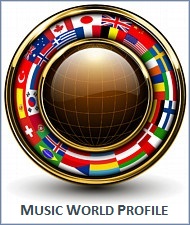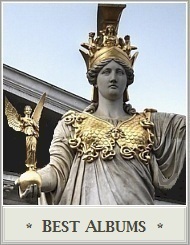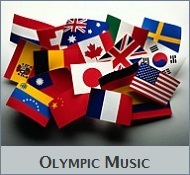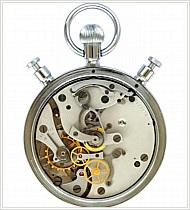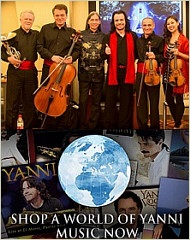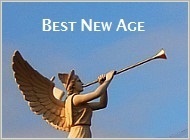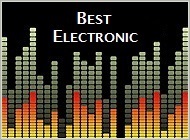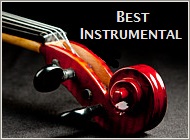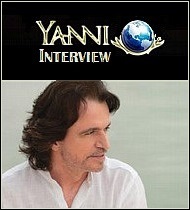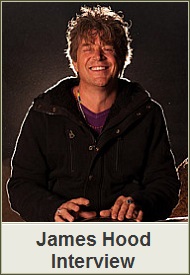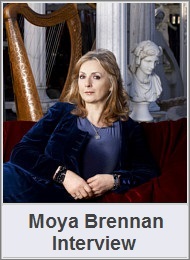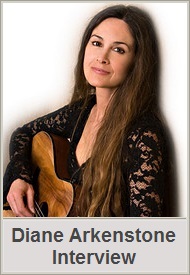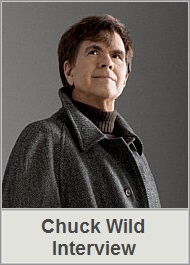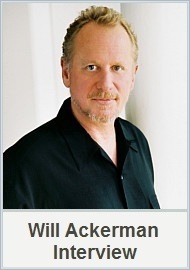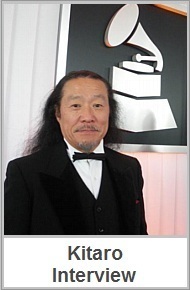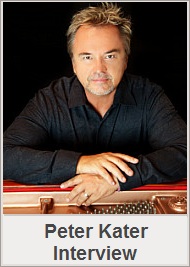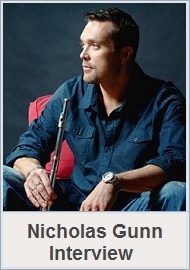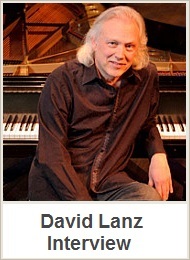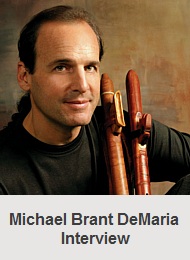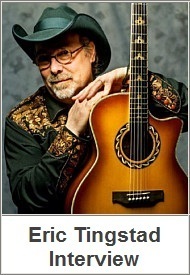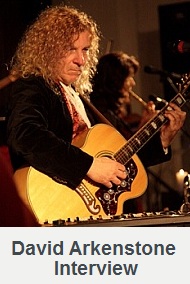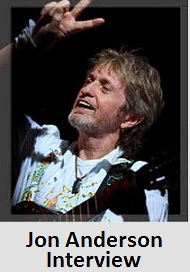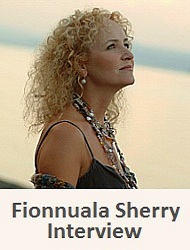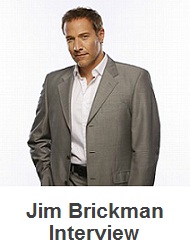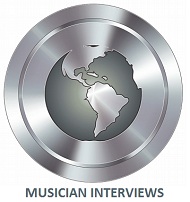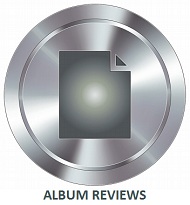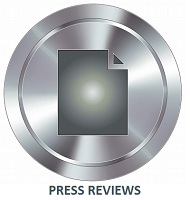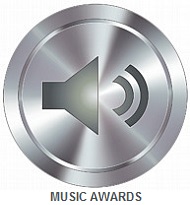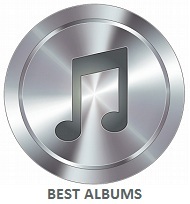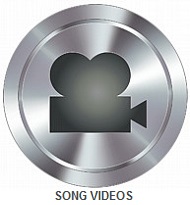Archive for the ‘An Interview with John P. Olsen’ Category

Fionnuala Sherry is the celebrated violinist and fairer side of the music duo Secret Garden, along with becoming the most current artist to be featured by a musician interview at New Age Music World. While Fionnuala’s fame and success as a music partner with Norwegian composer and pianist Rolf Løvland of Secret Garden has earned them both admiration by millions as a team, Fionnuala Sherry who resides in Ireland, can claim a brilliant success of her own by the release of her first solo album entitled Songs From Before.
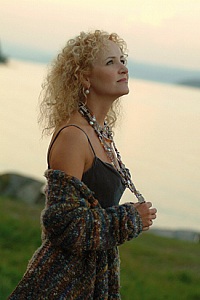 Songs From Before is Fionnuala Sherry’s unique and personal revision on some of the most beloved melodies of Irish heritage. In addition, her contemporary instrumental album with 10 songs total also includes some unreleased original compositions that beautifully highlight her expertise as a violinist and vocalist.
Songs From Before is Fionnuala Sherry’s unique and personal revision on some of the most beloved melodies of Irish heritage. In addition, her contemporary instrumental album with 10 songs total also includes some unreleased original compositions that beautifully highlight her expertise as a violinist and vocalist.
Her instrumental CD in entirety is a moving experience and inspirational beacon showing her in a new light, yet her solo release continues the true to character tradition, in regards to the fine violin melodies for which she is famous.
Fionnuala Sherry’s solo album Songs From Before also happens to be a very popular album that had risen to the number 2 position of the Top 25 for June on Echoes radio program within days of the release. Her solo release was also awarded Echoes CD of the Month for July on Echoes radio, a popular online radio program that is broadcast on 130 radio stations in North America.
Review publicist, and New Age Music World host John Olsen recently had the opportunity to interview the internationally renowned violinist Fionnuala Sherry, so today we are pleased to present their conversation to her fans and to our site visitors.
Interview with Fionnuala Sherry in 2011.
John Olsen: Let me begin by expressing my gratitude for approving of my interview request on short notice Fionnuala. Your first solo album is now available in North American markets after a successful earlier release in Europe.
I have read Songs From Before was a project in the planning stages for many years, and you have wanted to introduce your contemporary revision on traditional Irish classics for some time now. Why did this album become such an important artistic statement you wanted to express musically?
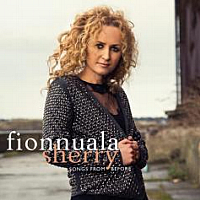 Fionnuala Sherry: I am so happy now to have produced this CD as I have lived with these old Irish tunes for all my life and the strange thing is that as a professional violinist I never had the opportunity to perform them.
Fionnuala Sherry: I am so happy now to have produced this CD as I have lived with these old Irish tunes for all my life and the strange thing is that as a professional violinist I never had the opportunity to perform them.
I think they have always influenced me as these beautiful airs have been a musical backdrop to my growing up and it felt just right for me to revisit them. I felt I had now learned so much over the years that I could this time hopefully bring all I have learned to the table and give them a new and contemporary edge.
John: What were the circumstances that led you to produce Songs From Before at this point in time?
Fionnuala Sherry: The timing was right. I had taken some down time away from Secret Garden in fact I stopped playing for nearly 2 years. I guess I was just burned out. Slowly the passion returned and I felt if ever I was going to record these beloved songs it was the perfect time.
John: Songs From Before is an album comprised of mostly traditional melodies of Ireland, which is somewhat in contrast to your Secret Garden arrangements. Did you find performing modern revisions of familiar Irish melodies more of a challenge or merely a variation in how you regularly compose music?
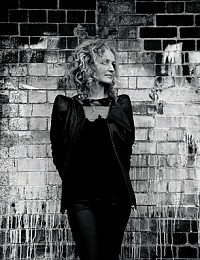 Fionnuala Sherry: I approached this CD with the same discipline as to other Secret Garden albums. The key for me in producing the right kind of sound was teaming up with Kjetil Bjekestrand. A wonderful Norwegian composer and programmer who “got” what I was trying to do. He also came with fresh and innocent ears to these tunes having no earlier knowledge of them. Through him he helped to give me the freedom to write around the airs and to approach them in a new way.
Fionnuala Sherry: I approached this CD with the same discipline as to other Secret Garden albums. The key for me in producing the right kind of sound was teaming up with Kjetil Bjekestrand. A wonderful Norwegian composer and programmer who “got” what I was trying to do. He also came with fresh and innocent ears to these tunes having no earlier knowledge of them. Through him he helped to give me the freedom to write around the airs and to approach them in a new way.
John: I have to admit I am less familiar with traditional Irish melodies so wondered if you give everyone some historical context of the songs you have re-created. Are they primarily hymns or ballads?
Fionnuala Sherry: They are really neither, Irish airs were just that they could be sung with sometimes added lyrics, or they were simply played on a fiddle, or whistle or harp etc. When these tunes were handed down from generation to generation they were in the form of verse only which was repeated and repeated.
We are more familiar nowadays with songs having the form of verse, chorus, maybe bridge chorus etc. So the challenge for me to work these simple (one verse only) airs into a more substantial composition was with the additional writing and arrangement which Kjetil and I worked on together.
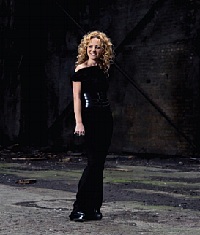 John: Do you plan to release another solo album someday Fionnuala?
John: Do you plan to release another solo album someday Fionnuala?
Fionnuala Sherry: Yes I would love to and hope that will happen.
John: I understand you were raised at home with a family of musicians. Could you tell us about some of your early experiences growing up in a house full of musicians?
Fionnuala Sherry: It was great fun most of the time as there was always something going on and my parents gave loads of parties and in true Irish form everybody always had a party piece, so there was lots of singing and playing.
But like all kids there were also times when I was very envious of my friends out on the road when they were out playing and kicking a ball etc. when I was stuck in rehearsing. Many are a time I would have loved to have swopped places!
John: With your Secret Garden album Inside I’m Singing being your second most current release, I am sure everyone would like to know if you and Rolf Løvland have another Secret Garden project planned in the future?
Fionnuala Sherry: We are about to release our latest CD which is due out on November 7th. It’s called “Winter Poem.”
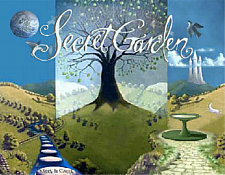 John: This is great news your new Secret Garden CD is nearing the release date! The title Winter Poem has a very nice ring to it. Even before your celebrity prominence with Secret Garden you had projects with music superstars including Bono of U2, Chris de Burgh, Sinéad O’Connor, The Chieftains, and many more popular artists. Would you tell us about your associations with these great artists?
John: This is great news your new Secret Garden CD is nearing the release date! The title Winter Poem has a very nice ring to it. Even before your celebrity prominence with Secret Garden you had projects with music superstars including Bono of U2, Chris de Burgh, Sinéad O’Connor, The Chieftains, and many more popular artists. Would you tell us about your associations with these great artists?
Fionnuala Sherry: The good thing about growing up and working in Ireland is how small the country is and so it’s easy to get to know everybody. I was lucky that when I turned pro I began to work a lot in the different studios as a backing musician to these amazing artists and it was a wonderful time as there was such a dynamic feeling everywhere with fantastic people producing brilliant music. I am still amazed that when I tour all over the world as we have been fortunate enough to do so how many Irish acts appears in the charts! For such a small country the output is incredible!
John: Along with the respect people have of you for being one of Ireland’s most successful songwriting musicians, you have also had stars like Barbra Streisand, Josh Groban, Westlife, 11 Divo and Celtic Woman making popular hits with your song compositions. I imagine this must be pretty gratifying to you and Rolf Løvland?
Fionnuala Sherry: Rolf is the master of the writing; I am there as his guiding hand and co-producer, but it has been an incredible journey for us and especially with the song “You Raise Me Up.” It feels like only yesterday when we first began teasing out the melody to that song and now 10 years have passed! But even back then we knew it had something magical – and it has been a rollercoaster all the way.
 John: Speaking of your Secret Garden arrangements, I truly enjoyed watching numerous music videos of your concert performances including the orchestral DVD titled; A Night With Secret Garden. During these concerts you seem so energetic yet relaxed and poised, all in one motion. I take it you are quite comfortable performing live on stage in front of a large audience?
John: Speaking of your Secret Garden arrangements, I truly enjoyed watching numerous music videos of your concert performances including the orchestral DVD titled; A Night With Secret Garden. During these concerts you seem so energetic yet relaxed and poised, all in one motion. I take it you are quite comfortable performing live on stage in front of a large audience?
Fionnuala Sherry: I suffer from the worst stage fright you can imagine, every night is as terrifying as the previous one and there are nights I don’t think I will make it. For me it’s like doing an enormous bungee to get out on that stage! But then something special always happens with the audience and once I relax it becomes magical. I wish it could be easier for me but accept now that I will always be nervous.
John: I read your concert and studio instrument of choice is an English John Edward Betts violin from 1790 time period. When did you acquire this violin, and can you tell us some of the history behind your vintage instrument?
Fionnuala Sherry: When I got my first full time pro job in the RTE Concert Orchestra, the first thing the principal conductor said to me was to get a better instrument! He hated the sound of what I had. So my eldest brother kindly lent me the money as I was broke and a wonderful old German violin dealer I knew helped to locate this instrument for me.
 It was instant love as it is smaller in size than normal which suits my small hands. It didn’t sound very good at first as there were a lot of dead spots as they reckoned it had not been played for nearly a 100 years before me! So I had to work very hard with this instrument which still gets better and better, I love it.
It was instant love as it is smaller in size than normal which suits my small hands. It didn’t sound very good at first as there were a lot of dead spots as they reckoned it had not been played for nearly a 100 years before me! So I had to work very hard with this instrument which still gets better and better, I love it.
John: You have so many achievements for you to choose from on this question Fionnuala, but I would like to know what you find most rewarding as a professional musician?
Fionnuala Sherry: I think it’s been able to communicate through the language of music which is just about emotions and feelings and when I see the effect it has on people, and if it helps them get away from all their daily grind for even a moment – that is the most satisfying thing.
John: Thank you again for giving me this opportunity to present our interview together as a feature Music World publication. I look forward to providing more news coverage about you in the days ahead. Before we close for now, is there anything you would like to tell your friends and fans that have supported you over the years?
Fionnuala Sherry: I am so grateful to everybody that has supported me over these last years. Without you, I or Secret Garden would not exist, so from the bottom of my heart a thousand thanks and hope you will all continue to enjoy this musical journey with me.
Visit the fionnualasherry.com homepage and valley-entertainment.com music store to sample or purchase her solo album – Songs From Before. You may also find her music at Amazon.com or iTunes. Then visit Fionnuala Sherry and Rolf Løvland at the secretgarden.no homepage and web shop page. You can read more on our pages dedicated to Fionnuala Sherry.
Photography courtesy Andreas Pettersson – FionnualaSherry.com – SecretGarden.no.
 Randy and Pamela Copus are the husband and wife duo that is the complete heart and spirit of 2002. It was nineteen years ago when 2002 first began producing music with their first album titled Wings. From the beginning and throughout their careers, it’s as if their popular celestial melodies have soared in an ascending flight of their own.
Randy and Pamela Copus are the husband and wife duo that is the complete heart and spirit of 2002. It was nineteen years ago when 2002 first began producing music with their first album titled Wings. From the beginning and throughout their careers, it’s as if their popular celestial melodies have soared in an ascending flight of their own.
The 2002 music duo Randy and Pamela Copus are without a doubt, one of the finest musical groups producing music today. Many would agree, and their popularity is pretty apparent by the number of times 2002 has been listed as a favorite musical group on the Billboard New Age Charts over the years, and their constancy of producing fine releases.
Presently, Randy and Pamela are nearing a significant milestone in their music careers by an upcoming 20 year anniversary. Review publicist John Olsen has interviewed Randy and Pamela in which many topics were covered. NewAgeMusicWorld.com & NewAgeMusic.nu are pleased to present their conversation to fans of 2002, and our site visitors.
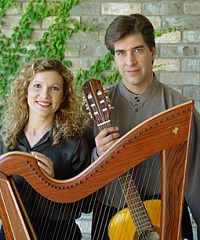 John Olsen: I want to thank you both for taking time out of your schedule for our interview together. I have been a big fan of your music for years so our interview together is even more rewarding to me personally.
John Olsen: I want to thank you both for taking time out of your schedule for our interview together. I have been a big fan of your music for years so our interview together is even more rewarding to me personally.
You are approaching a significant milestone by your upcoming 20 year anniversary as 2002. Given your ever-rising popularity as New Age music producers, have you had much time to reflect over your roles as musicians and many achievements during the past 20 years?
Randy: Wow, 20 years! It seems like just yesterday we were producing Wings, and watching the 2002 sound take on a life of its own. We don’t spend much time reflecting on our past because we’re always moving forward, constantly trying to improve our music and how we produce it.
John: I find it impressive that 2002 has made the charts 9 times at Billboard within the past 10 years with the long list of albums; Chrysalis, Land of Forever, River of Stars, Across an Ocean of Dreams, The Sacred Well, This Moment Now, The Emerald Way, Deep Still Blue, and Christmas Dreams. This is the equivalent of 270 weeks total on the Billboard New Age charts. I wondered if winning awards and making the Billboard chart is really that important to you, and whether you consider these achievements a true measurement of your success?
Pamela: It’s still important, though perhaps not as much as it used to be. In the past, it helped us know whether or not we were connecting with our audience. It validated hard work and helped us measure each album against its predecessors. However, the music industry is changing and there are plenty of new ways to measure those things now.
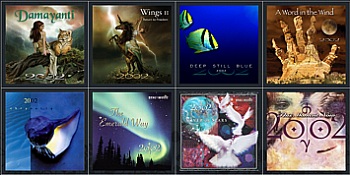 Randy: I still get excited when I see our music on the charts, and awards are wonderful, of course. These help give us confidence that we are moving in the right direction. However, when we create the music, we’re not setting out for those kinds of achievements. We have as a single goal to make the best album possible, regardless of reviews and accolades, and even charting.
Randy: I still get excited when I see our music on the charts, and awards are wonderful, of course. These help give us confidence that we are moving in the right direction. However, when we create the music, we’re not setting out for those kinds of achievements. We have as a single goal to make the best album possible, regardless of reviews and accolades, and even charting.
John: You have a brand new release titled Damayanti, which I published a positive review about recently. When compared to earlier albums you have produced, do you feel Damayanti is your finest release to date, and have you two received additional input from fans or other review publicists about the high quality of your most current release?
Pamela: And thank you for that review John! Yes, each album has been special in its own way. It’s amazing how I can look back over the last 19 years and see reflections of our lives in our music and remember vividly what was going on during each album. Damayanti is no different. It’s a snapshot in time that freezes so many memories. We had a great number of setbacks while creating that album and we certainly did work harder to get through all of that to bring it to the world. It has been a stellar release for us and we have been overwhelmed with positive feedback from our fans, colleagues and reviewers.
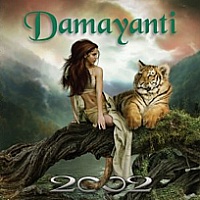 Randy: The reviews have been really great for Damayanti, and some of our fans are saying it is the best release ever from us, but we have enough records out there now to make it difficult for me to determine which one is the “best”. My personal favorite changes almost daily!
Randy: The reviews have been really great for Damayanti, and some of our fans are saying it is the best release ever from us, but we have enough records out there now to make it difficult for me to determine which one is the “best”. My personal favorite changes almost daily!
John: What makes the melodies on Damayanti different from earlier albums?
Pamela: It’s a microcosm of the 2002 career. The many avenues we’ve explored over the past 19 years are all represented in this one release. It brings it all together.
Randy: Our music has always had great commonalities with film soundtracks. The new album takes this style to a new level for us. Many of the albums we’ve produced over the years, particularly the earlier works, have been centered on stories. We returned to this form with Damayanti. There are lush string orchestrations and those emotional “moments” in the music that are the hallmark of movie scores.
John: If it’s not a trade secret, would you provide some details about the instruments and equipment you use, along with the process in which you construct a 2002 album?
Pamela: I play a McKenna flute, specially made for me. My alto flute is a Jupiter. I also play a wind controller by Yamaha called a WX5 as well as a Thormahlen Swan 36 harp and miscellaneous keyboards.
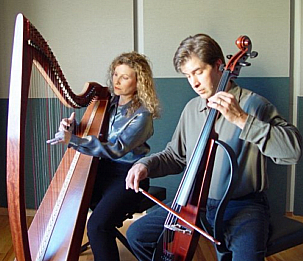 Randy: We use Apple computers and MOTU Digital Performer software. We also prefer to use a real recording console, rather than to do everything in the computer. Our microphones, preamps, speakers and effect processors are all high-end, and are an important part of the trademark sound we produce. Several people have written and asked us what vocal mic we use for all of the vocal layering that is so much a part of our sound. That is a custom made Pearlman TM-1, made by our friend Dave Pearlman. It is a tube microphone, and we run that into a Groovetubes VIPRE preamp. We try to leave our performances as natural as possible, without relying too much on the software to perfect everything. Sometimes there will be a slight timing error or errant sound, or even a mistake that we will leave in because the performance was where it should be. It seems like so often, using technology to perfect a musical performance takes the life out of it.
Randy: We use Apple computers and MOTU Digital Performer software. We also prefer to use a real recording console, rather than to do everything in the computer. Our microphones, preamps, speakers and effect processors are all high-end, and are an important part of the trademark sound we produce. Several people have written and asked us what vocal mic we use for all of the vocal layering that is so much a part of our sound. That is a custom made Pearlman TM-1, made by our friend Dave Pearlman. It is a tube microphone, and we run that into a Groovetubes VIPRE preamp. We try to leave our performances as natural as possible, without relying too much on the software to perfect everything. Sometimes there will be a slight timing error or errant sound, or even a mistake that we will leave in because the performance was where it should be. It seems like so often, using technology to perfect a musical performance takes the life out of it.
John: Did you begin playing music with the intention of becoming top New Age music artists, or did you find your music is best defined as Contemporary Instrumental or New Age music?
Pamela: Wow – well actually I started playing music when I was 4. My first instrument was piano, then violin, flute, bagpipes and oboe. Later, in college I moved on to piano. I joined various bands in a variety of styles and spent years playing live and touring. I played in bands performing everything from 60’s covers to industrial rock. I like all good music, regardless of genre.
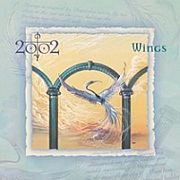 Randy: We almost fell into the new age genre by accident. Years ago we were both at a point where we had left our respective rock bands, and some friends of ours suggested that we create a solo flute album to sell at the wellness seminars they were conducting. It sold well, so we made another solo flute recording, and then a third album that had more synthesizers and other instruments. All of this came to a head when we produced Wings in 1992, and the 2002 sound was born.
Randy: We almost fell into the new age genre by accident. Years ago we were both at a point where we had left our respective rock bands, and some friends of ours suggested that we create a solo flute album to sell at the wellness seminars they were conducting. It sold well, so we made another solo flute recording, and then a third album that had more synthesizers and other instruments. All of this came to a head when we produced Wings in 1992, and the 2002 sound was born.
John: You have DVD/CD collector’s editions for the albums A Word in the Wind & Deep Still Blue, plus your music videos. The cinematic aspect of your music is very apparent when viewing your DVDs and music videos. Do you have more DVDs or music videos planned and how did producing your own music videos originate?
Pamela: Producing videos to accompany every song of an album is very time and labor intensive. It really increases the length of time it takes to complete a project. It was a great experience, but I don’t see us doing only that in the future.
Randy: After Deep Still Blue & A Word in the Wind, it was amazing to me how much easier it was to do a straight music album! I’m so glad we did those projects, though. They allowed us to stretch ourselves in new directions and discover what we were artistically capable of.
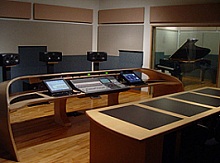 John: Last year you had introduced your own Galactic Playground Music label. How has this changed the way you produce and market your music?
John: Last year you had introduced your own Galactic Playground Music label. How has this changed the way you produce and market your music?
Pamela: We started our first record label in 1992 (Dreamtime Records). Later, as we evolved into producers we realized that we needed to extend our abilities and began Galactic Playground Music as our publishing arm. When we found ourselves free of outside record labels, we transformed our successful publishing company into a new label and re-released the 3 Gemini Sun Records albums as well as our 2 newest albums, Wings II – Return to Freedom & Damayanti.
Randy: It is great to be in control of our careers, but with that comes the responsibility of having to get everything done, and there are a million little things. It used to be we would get to the finish line of completing the album and then immediately turn our sights to what we would create next. Nowadays, finishing the record is only the beginning. There are promotions that must be done, deadlines that must be met, and decisions about where to spend money or not. Still, it’s very satisfying to take the reins and be in charge of our own destinies.
John: Both of you produced and performed on Marc Enfroy’s Unconditional album, which turned out to be an excellent album by the way. Is producing an album for another artist comparatively straightforward, or are there many challenges to creating a quality product everyone is happy with?
 Randy: In the case of Marc’s album, Unconditional, we felt we had a good fit. We were able to bring the elements together with what he already had, to take it to another level. This is the prime consideration we have for producing another artist’s record – what can we bring to it to make it better? Marc had a very good collection of songs and wanted to make a more atmospheric, new age sound than in his previous works. I think it came together nicely, and in the end, everybody was happy with the result.
Randy: In the case of Marc’s album, Unconditional, we felt we had a good fit. We were able to bring the elements together with what he already had, to take it to another level. This is the prime consideration we have for producing another artist’s record – what can we bring to it to make it better? Marc had a very good collection of songs and wanted to make a more atmospheric, new age sound than in his previous works. I think it came together nicely, and in the end, everybody was happy with the result.
John: Let me be the first to publically congratulate you both on your approaching 20 year anniversary as 2002. B.T. Fasmer and I wish you both continued success! Before we close for now, is there anything you would like to mention that we haven’t talked about yet?
Randy & Pamela: Thank you so much John! I just want to let you both know how much we appreciate all you do for the music community. We are so grateful that there are people like you helping to get the word out!
Visit the 2002music.com to homepage and then sample / purchase at their music store or go to their Amazon.com page. Read more on our pages dedicated to 2002.
Photos courtesy 2002music.com.

Jon Anderson of Yes fame is the top music celebrity we are pleased to present here at NewAgeMusicWorld.com & NewAgeMusic.nu. With a successful music career spanning five decades, John Anderson’s presence as a vocalist and instrumentalist has made an admirable impression on millions of people over the course of many years as a musician.
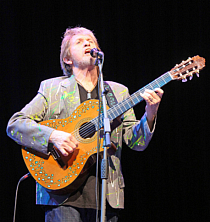 This can be said regarding his lengthy tenure as lead singer for the Progressive Rock band Yes, during his numerous collaborations with other celebrated artists, and while performing throughout the years as a popular solo artist.
This can be said regarding his lengthy tenure as lead singer for the Progressive Rock band Yes, during his numerous collaborations with other celebrated artists, and while performing throughout the years as a popular solo artist.
Jon Anderson’s influence and starring role in music over five decades is legendary. It is estimated over 38 million records were sold during his years as the dynamic lead vocalist with Yes, and throughout his successful solo career.
Today, Jon Anderson is preparing for his North American concert tour in support of his new CD release; Survival & Other Stories.
Knowing Jon Anderson’s significant influence in music it is our privilege to present this interview so that everyone can find out more about a fascinating artist with a long and enduring music legacy.
Review publicist John Olsen recently had the opportunity to interview the personable Jon Anderson prior to his tour in 2011. We are pleased to present their conversation to Jon’s fans and our site visitors.
Jon Anderson interview April 2011:
John P. Olsen: Thank You for agreeing to this interview on short notice Jon. We realize our interview request arrives at a time interval just days prior to your opening concert, so we do appreciate your enthusiasm for this interview, and your willingness to take time out of your schedule for us.
You are beginning your concert tour publicized as “An Acoustic Evening With Jon Anderson.” Would you like to give some insight to concert goers about the atmosphere and variety of music they will experience during an evening with Jon Anderson?
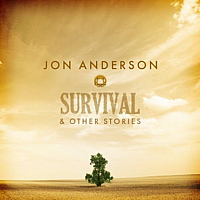 Jon Anderson: Well, it’s really like being in my ‘front room’. I’m singing Yes songs as I originally wrote them, singing ‘Jon and Vangelis’ songs, telling stories, how songs came together, the meaning behind the songs, talking about my life so far, and doing new songs from my new album.
Jon Anderson: Well, it’s really like being in my ‘front room’. I’m singing Yes songs as I originally wrote them, singing ‘Jon and Vangelis’ songs, telling stories, how songs came together, the meaning behind the songs, talking about my life so far, and doing new songs from my new album.
JP Olsen: Your new release Survival & Other Stories is due to be released April 2011. Can you provide some details about your new release, and how Survival & Other Stories varies from other albums you have produced?
Jon Anderson: This album is #1 of 3 albums I will release over the next 2 years. I put an ad on my website saying ‘musicians wanted’… I was finding it hard to get the guys in Yes interested in using the Internet to write songs, I put the ad out there, I got so many people sending me their musical ideas, it was like this musical ‘door’ had opened, and I found myself writing so many great ideas, with some very talented peeps…. I still do this every week. Music is endless.
JP Olsen: You have collaborated with other celebrated musicians like yourself, including Vangelis, Kitaro, Rick Wakeman, Mike Oldfield and a host of other talents. Every artist has their own strengths, along with their individual viewpoint about an album production, so when collaborating with other musicians, how does a “meeting of minds” customarily transpire during album composition and production?
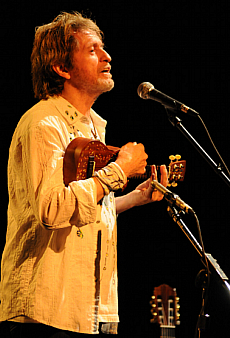 Jon Anderson: It’s very simple really, it has to be Fun, an element of Trust and a feeling of Adventure, I sing melodies and find lyrics to the music I hear, it’s a very instant thing, and if it’s working great, we tend to trust ourselves, and let the music take us on the journey.
Jon Anderson: It’s very simple really, it has to be Fun, an element of Trust and a feeling of Adventure, I sing melodies and find lyrics to the music I hear, it’s a very instant thing, and if it’s working great, we tend to trust ourselves, and let the music take us on the journey.
JP Olsen: Recently you teamed up with Mike Oldfield for a Kanye West sample track titled Dark Fantasy, which topped the Billboard chart as the #1 album in the country. In addition you just produced a great album with colleague and Yes member Rick Wakeman titled The Living Tree. Do you find teaming up with other esteemed musicians just as rewarding as your solo projects?
Jon Anderson: I feel thankful to have these connections, they don’t come all the time, they are rewarding on so many levels. I’m singing on Jonathan Elias’s new ‘Prayer Cycle’ along with Sting and others, released June 1st, that song I sang was right in the middle of my illness in 2008, it was such a gift to sing with that music, very inspiring.
JP Olsen: To me and many others, the voice of Jon Anderson is one of the easiest to identify in an ocean of vocalists. Did you have professional vocal instruction, and what point in your life did you choose to pursue music as a career?
Jon Anderson: No, I just sang since I was a kid, sang as I went to school, sang when I worked on the farm, and just kept singing about the joys of life.
JP Olsen: Early in your career you were leader of Yes, a phenomenal and popular Rock group, yet you also produced music in less mainstream genres, including New Age and Contemporary Christian music. What is the reason you performed in respected but less mainstream music?
What 2011 concert goers can expect to hear during “An Acoustic Evening With Jon Anderson” – Well, it’s really like being in my ‘front room’. I’m singing Yes songs as I originally wrote them, singing ‘Jon and Vangelis’ songs, telling stories, how songs came together, the meaning behind the songs, talking about my life so far, and doing new songs from my new album. Jon Anderson
Jon Anderson: Music takes on your Sacred Journey, I have a deep belief that we are changing for the better again, and music can be a sign post to what is happening around the world, people all over the world ‘love’ music, so why not enjoy being a part of the ‘new age’….
JP Olsen: You wrote the song lyrics during your tenure in Yes, and likewise during your solo career. Your lyrical phrasing is beautifully expressive, and positive in nature. Do you have a lyrical theme or message you want to convey to your audience?
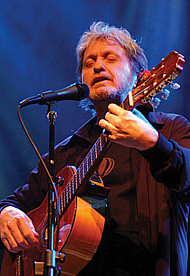 Jon Anderson: Like most people I am seeking for Truth to Life, and singing about this helps me, I live to understand the great mystery, and how we are part of Mother Earth, and ‘why’…. so lyrics dance around me every day, I do feel honored to be a musician.
Jon Anderson: Like most people I am seeking for Truth to Life, and singing about this helps me, I live to understand the great mystery, and how we are part of Mother Earth, and ‘why’…. so lyrics dance around me every day, I do feel honored to be a musician.
JP Olsen: During the early Yes years some music critics downplayed the influence Yes was achieving as a music act. I believe it would be accurate to say many people didn’t realize at the time that Jon Anderson, and a handful of others, were essentially inventing a music genre we identify today as Progressive Rock. Did you and other band members recognize at the time you were making such a profound impact in the music scene?
Jon Anderson: We hoped that Yes Music would stand the test of time, and it seems to have done, but 40 years, wow!! I meet so many young people who have just bought ‘Close to the Edge’, they find out how exciting the music is, and they will go on the same musical journey as I did, it’s amazing to realize this.
JP Olsen: Your contribution as lead vocalist was an important factor, but why do you believe Yes as a Progressive Rock group so successful?
Jon Anderson: I worked hard within the Yes band as the musical director of sorts. I was surrounded by so much talent, I would come up with plans for the music, sing ideas constantly, and the Music we created is unique. I never dreamed it could become so wonderful, I kept on coming up with ideas, and Yes Music will last forever, Weeeeeee!
Jon’s reply on the major influence Jon Anderson and progressive rock group Yes had in music; We hoped that Yes Music would stand the test of time, and it seems to have done, but 40 years, wow!! I meet so many young people who have just bought ‘Close to the Edge’, they find out how exciting the music is, and they will go on the same musical journey as I did, it’s amazing to realize this. Jon Anderson
JP Olsen: You have been a very successful vocalist and instrumentalist practically your whole life. Do you believe your life achievements are due to your musical talents, hard work, a combination of both, or do you believe in destiny?
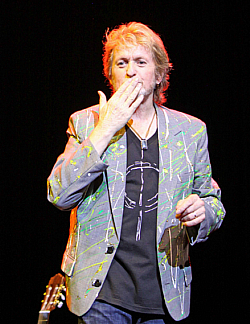 Jon Anderson: Practice, Practice. Well I just have fun playing every day, I sing every day, think about the ‘great work’ to be done, as for destiny, hummm, not sure what that means, I believe that I will be part of a great Awakening.
Jon Anderson: Practice, Practice. Well I just have fun playing every day, I sing every day, think about the ‘great work’ to be done, as for destiny, hummm, not sure what that means, I believe that I will be part of a great Awakening.
JP Olsen: What do you feel is your greatest achievement or most rewarding experience to date Jon?
Jon Anderson: Still being around, feeling valid in this world music scene, not getting carried away with fame. Singing with the school of rock and youth orchestras, and I enjoying being around ‘young’ musicians while helping to create some very good and interesting music to date.
JP Olsen: Earlier I read on your Facebook page you rarely do endorsements for advocacy groups but are involved with 600million.org, a non-profit organization created by the co-founder of PETA, Alex Pacheco. Would you like to tell us about your contribution and charitable endorsement for the animal protection advocacy group 600million.org?
Jon Anderson: My youngest Daughter Jade introduced me to the project earlier this year. I was really sad about the plight of our fellow creatures, dogs are truly man’s best friend, and they can be so healing and funny to be around, so to see so many millions in distress, made me want to help in any way I could, so I made a short video to help.
JP Olsen: Thank You again for spending time with us by way of our interview Jon. We look forward to the day when we can follow-up by another interview together. In closing, do you have anything you would like to express to the people who will be attending a concert this year, or the many fans that have supported you throughout your career?
Jon Anderson: Have fun!!! And thanks for all the support, and enjoyment I have at the concerts I do, I cannot thank you enough…. Cheers!!!
Again everyone, Jon Anderson is beginning his 2011 North American concert tour billed as “An Evening With Jon Anderson.” We wish Jon and every concert goer an enjoyable evening together during a live concert event that is sure to be memorable.
Visit the jonanderson.com homepage for news and concert tour information. Read our pages dedicated to Jon Anderson.
Concert photos courtesy Robin Kauffman & jonanderson.com.

On the eve of the Grammy Awards scheduled for February 13 2011, review publicist John Olsen has just conducted an in-depth interview with award winning composing musician and 2010 Grammy® Nominee Dr. Michael Brant DeMaria.
In this second interview with Dr. DeMaria, we present to our visitors defining insight into the life of an esteemed new age and world influential musician whose music career is very much in the forefront of today’s music scene.
John P. Olsen : Thank you Michael for taking time away from your work and agreeing to our interview on short notice. You are a clinical psychologist, recognized poet, author, public speaker, and now a twice Grammy® Nominated musician with your 2010 Ocean album currently under consideration. Were you anticipating the Ocean album would turn out to be your second Grammy® Nomination this year, and with the awards ceremony soon approaching, what are your expectations for winning a Grammy® in the New Age category with Ocean?
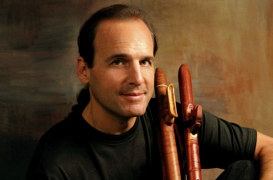
Michael Brant DeMaria : First off, I want to thank you John for taking the time out of your very busy schedule to sit down with me as well. It’s always a pleasure to hear from you and I have great respect for the work you do. As always, your question goes right to the heart of the matter. As you know the New Age category is an extremely competitive category. However, in the back of my mind I knew Ocean was number 1 on the New Age chart for 3 months and did win two very prestigious awards, Best Ambient Album of 2009 and Best Relaxation/Meditation Album of 2009. I knew it was possible, but I did not think it was probable. Not only was Ocean competing with luminaries and legends in the New Age world, Ocean happened to be up against albums by Olivia Newton John and Tina Turner who both had their entries in the New Age category this year.
As far as winning, I have no expectations. Once again, the other nominees in my category are true legends in the world of New Age music, Paul Winter, Kitaro, and R. Carlos Nakai. Each of these men have influenced and inspired me over the last 25 years. I am very humbled just to be in their company. At the same time, I try to live by the Samurai warrior saying, “Expect nothing, be ready for anything”.
John : You have studied and performed with friends and past Grammy® Winner David Darling, along with Grammy® Nominated R. Carlos Nakai. What are your connections with colleagues David Darling and R. Carlos Nakai over the years?
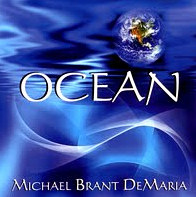
Michael : R. Carlos Nakai is responsible for me picking up a Native American Flute 17 years ago. I was traveling through Glacier National Park in Montana on my way to enact a very traditional vision quest. I found a copy of Nakai’s Earthspirit and put it in my tape player in the car while I was driving. It was the first time I had ever heard the Native American Flute and it literally brought tears to my eyes. Although I had played piano, synthesizers and percussion most of my life, as soon as I heard the hauntingly familiar sound of the flute I knew I had to play it. When I finally did find one to play – it was like finding an old friend. Years later I joined Nakai’s organization, INAFA, The International Native American Flute Association – and have been a member for over a decade. It was at INAFA conventions in Taos, NM and San Francisco, CA that I finally had a chance to meet and play with him. Not only is he an amazing talent, but a very generous man with his time and knowledge.
Likewise, David Darling’s life, teaching and music have been and remains a very strong influence in my life. I had been listening to his music for many years when I heard about his Music for People program which trains people in the art of improvisation and facilitation. I took my first workshop with him back in 2005 and was immediately hooked. I apprenticed in the program for 4 years and graduated in 2009. In my opinion, he has done more than almost any other musician to teach the finer and deeper aspects of the art of improvisation. He is truly a master in his craft and actually is teaching much more than music – but actually a way of life based upon compassion and creativity. The highlight for me last year attending the Grammy’s as a nominee was having the opportunity to see him win, in person, his very long overdue Grammy® for his amazing album, Prayer for Compassion.
John : I read an article by the prominent author and past entertainment editor for the LA Times Richard Rushfield, where he mentions your name when giving his assessment of the 2010 Grammy® choices. What was your reaction to his article titled Handicapping the Grammys : Best New Age Album?
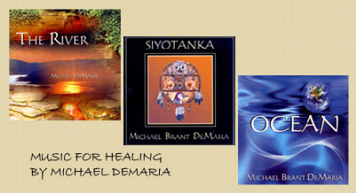
Michael : To be honest John I was a bit overwhelmed by it. Someone sent me a link to the article and my first thought was, “Boy I bet they don’t even mention me”, being the relative unknown in the category this year. After I read it I was very moved and appreciative of his kind and generous words, particularly about the track Moonlit Sea on my album Ocean. Of course, he admits I am a long shot, but a long shot nonetheless, who he thinks actually has a chance.
John : In your professional life Michael you are an equally devout music professional and psychotherapist. Would you ever pursue one profession over the other at some point in your life, or is it safe to say you are, and always will be recognized as a recording artist and a therapist?
Michael : You’re not the first who has asked me that question John. For me, an artist does for a culture, what a therapist or healer does for an individual. In this way, I feel they are two sides of the same coin. I also find they inform and balance each other in my life. Composing and writing are very solitary and deeply self-absorbed tasks that can take a lot out of you. After 4 days of that kind of intense work I’m really ready to sit across from somebody and be totally there for them. Of course, after 3 days of really being there for others I’m ready to dive back into the solitude of the creative process. I find one replenishes what the others depletes, like crop rotation – it has been a blessing in my life how they have woven themselves together. Now I don’t know what the future holds – but in some way I will always be active in both – although the format for how that may evolve remains to be seen!
John : Michael, you have already realized many achievements in many aspects of your life and I wondered if you would answer a more personal question by telling us what has been the motivating force in your life?

Michael : The primary motivating force in my life is love. Love in the sense of what the Greeks called agape – which is a love for life itself and humanity. I love life, I love people, and I love to create. I feel very blessed that I have been given the opportunity to express what is nearest and dearest to my heart. For me, love is about connection – and unfortunately we live in a time where most people feel a profound disconnection from life, nature, each other and even from their own hearts. The Cherokee say our first teacher is our heart – and unfortunately in our culture we leave that teacher far behind too early in our educational system and in our society. It’s very much my mission in my life to bring a bit more heart into the world through my writing, speaking and music.
John : During the past several years your music career has noticeably gained momentum and taken flight so what do you believe are the reasons your music compositions have repeatedly been granted numerous honors and award considerations over the years?
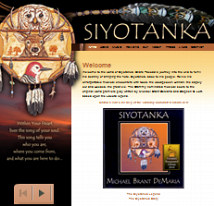
Michael : You are so very kind John. To be completely honest I really don’t know. What I can tell you is this. My music comes from a very humble and sincere place. When I go into my studio to record I have no interest or desire for any recognition or awards. It’s the furthest thing from my mind. I have no interest in impressing anyone – only in being true to my journey and the experience of the moment. I’m still that 6 or 7 year old boy who went to the family piano to take a sonic adventure – and to help me connect with a greater presence. In that way, it’s a spiritual practice for me. In this way, my albums are all crafted to take the listener on a journey. Each journey actually begins where the last one ended – they build upon each other. In fact, in many ways The River, Ocean and Gaia are a trilogy. They are also part of the larger Healing Sound Project which I have been dedicated to for the last 8 years. It has been a joy for me to see how this music created with the intent of making the world a bit more peaceful, soulful and heartfelt has been embraced so deeply.
John : In our earlier interview everyone had a chance to learn you have donated your time and talents by performing at fund raising benefits and concerts including the Gulf Oil Disaster in 2010 so could you tell us about the charity work you have been involved with over the years?
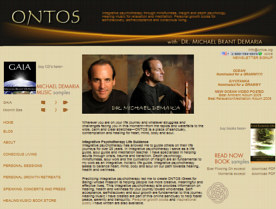
Michael : I have always felt John that it’s important to give back and whether it has been donating to Native American charities from Siyotanka or wildlife recovery from the gulf oil spill from Ocean, I try to make the project connect to something greater – something more than just about me. I love to play, create and record – so it is simply an added bonus when concerts or albums bring attention to well deserved programs. The world is in a state of great need today – and I believe artist have a unique ability to draw attention to worthy causes. Just as all my albums are concept albums – they are all designed hopefully to teach as well as to be enjoyed for the pure joy of listening.
John : Thank you again Michael for the opportunity to learn more about your amazing career. It has been an honor to get to know you personally while providing coverage of your lifework and career achievements for our visitors. Is there anything you would like to mention before we close?
Michael : The honor has been mine John. You do a great service to all of us in the New Age music world through your many efforts. I did want to mention I’m working on a new album – I don’t want to say too much about it, and the title is even in flux at this point – but I hope it will be available for release in late 2011. Let us just say that it is a project I’m very excited about and will be another very unique sonic journey for the soul, this time exploring the mystery of creation itself. Thanks again John and wishing you, B.T. Fasmer, and all your readers a happy, healthy and joyous 2011!
Visit ontos.com homepage and then sample / purchase on his albums page and CDBaby.com page or Amazon.com page. Read our earlier interview and album reviews on our page dedicated to Michael Brant DeMaria.
Copyright images courtesy Michael Brant DeMaria.

Gandalf is an internationally acclaimed composing musician and producer from Vienna Austria identified as a New Age, Contemporary Instrumental and World music artist. During the past 30 years of his career, his progressive music and global persona has helped neutralize the customary social borders in multicultural music for years.
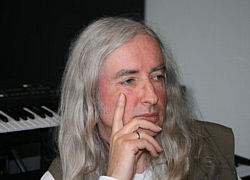 Gandalf is currently planning a future orchestration to celebrate his 30 year Anniversary in 2011 and this composition will become the centerpiece to mark the celebrations.
Gandalf is currently planning a future orchestration to celebrate his 30 year Anniversary in 2011 and this composition will become the centerpiece to mark the celebrations.
There is a live performance in Vienna scheduled to accent the occasion of his milestone achievement. The Vienna concert and new release is the first topic of their interview conversation during this comprehensive 2010 interview published just prior to his 30 year anniversary.
The website hosts for NewAgeMusicWorld.Com & NewAgeMusic.nu are excited to bring our visitors the present day interview John Olsen has conducted with this global musician and invite all visitors and fans to learn even more on our respective website pages dedicated to Gandalf.
Interview with Gandalf
John : I wanted to first thank you myself Gandalf, and on behalf of our visitors for taking time away from your more creative endeavors. I feel certain our visitors and your fans do appreciate this present day opportunity to learn more about you and the outstanding music you produce.
Many are already anticipating your 30 year anniversary you have slated for 2011 which will be here before long, and currently you are planning a new orchestration project with live performance in Vienna to accent your milestone achievement. Is everything being kept a secret for now or can you provide some details about your next orchestration and the live concert event scheduled for 2011?
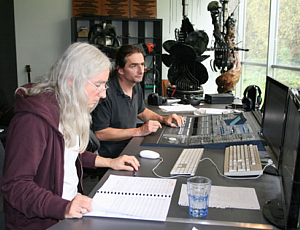 Gandalf : At this stage I don´t want to tell much in detail about the new project, this will all be presented due to the launch of the album and the concert in 2011.
Gandalf : At this stage I don´t want to tell much in detail about the new project, this will all be presented due to the launch of the album and the concert in 2011.
The composition is meant to be the essence of my musical excerience and development in the past three decades. The leading instruments are guitars, piano and percussion, a small symphonic orchestra (woodwinds and strings) and a male choir.
The work is in good progress, a lot has already happened, but there is still much to do. Currently I am finishing the orchestral score, the recordings are planned in October. The album producton shall be finished until the end of this year.
John : Thank you for the insight you have provided. Your 20 year anniversary was quite extraordinary which included your first live performance in Vienna and the CD / DVD collection on the BSC Music label titled Live In Vienna. Would you describe what your first live concert had felt like on a personal level and was your first stage performance the positive experience you had imagined?
Gandalf : Actually, this DVD/CD is the first official release of recordings from a performance in Vienna, of course there have taken place a lot of performances prior to this one. My really first big performance in Vienna was in 1982, when the album Visions was released. I had just started my career a year before and the reponse from the audience was a real sensation, the concert was completely sold out (more than thousand people) and the album climbed up to #2 in the album charts over night. This was far beyond my imagination! It was just great and lifted my motivation to continue with my work.
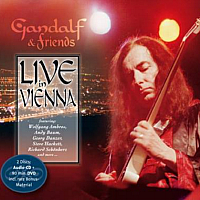 John : In addition to your studio recordings you began venues of live solo concerts on acoustic guitar and piano in the United States, along with live concerts in Austria, the Netherlands, and during Woodroot Festival in Germany. With the increasing number of venues, are live performances more rewarding for you as a musician than studio recording, and if so why?
John : In addition to your studio recordings you began venues of live solo concerts on acoustic guitar and piano in the United States, along with live concerts in Austria, the Netherlands, and during Woodroot Festival in Germany. With the increasing number of venues, are live performances more rewarding for you as a musician than studio recording, and if so why?
Gandalf : A live performance can not be compared to anything else, this is where the music happens in the very moment. Today performing live is more important for me than ever. If you record an album in the studio you spend much time to get your performance recorded as perfect as possible, on stage you only have this one chance and that is the fascination about it, no song sounds exactly the same twice, you never know what is going to happen every other night. And sometimes there is real magic and you can feel it from the first note you play and the audience can feel it. I would not want to miss this.
John : What was the early turning point where you decided to pursue music as a career and could you tell us about your music history throughout the years?
Gandalf : After having played in various Progressive-Rock lineups during the Seventies I found out that I had a musical vision which I could not realize with a conventional band so I started experimenting in a very simply equipped studio at home just on my own, playing and recording all instruments by myself. And this was the first time I really felt satisfied about my work so I recorded my first album Journes To An Imaginary Land and my friends were so enthusistic about the result, that I played the material to someone from a record-company and I got a contract.
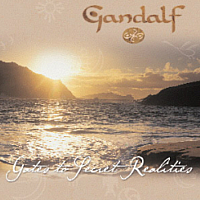 That´s how it happened, I just followed my intuition and after some time I realized that I was able to make my living from making exactly the music I played out of my heart.
That´s how it happened, I just followed my intuition and after some time I realized that I was able to make my living from making exactly the music I played out of my heart.
John : The Gates to Secret Realities was the transitional album during your move to World music influences. What was the defining moments or reasons for your decision to begin composing World influenced music?
Gandalf : My travels to India and other countries opened up my horizon and I found out more and more, that music is a universal language. It has the ability to dissolve borders between different cultures. There were so many elements in music from other parts of the world that inspired me and I wanted to integrate such influences and expand my personal style, trying to create some kind of a Global Music.
John : During your continental travels, what experiences and ethnic cultures have led you to discover and then recognize music as the unifying source that indeed helps abolish the boundaries in various musical styles and categories?
Gandalf : The first special encounters I had in India when I jammed with musicians there. We were not able to communicate much by words because of our different languages, but we had so much fun communicating through music.
Also on my Brazilian tour in 1995, I could not speak Portugese at all, but the music opened up the hearts of people and the feedback was amazing.
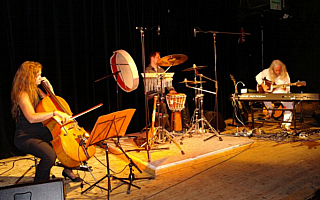 This was where I met Emily Burridge from England. She had lived with a Tribe of Indians for a while and was very inspired by there way af looking at the world and their rituals. So when we played together in Brazil, we decided to record an album together, and this was Gates …
This was where I met Emily Burridge from England. She had lived with a Tribe of Indians for a while and was very inspired by there way af looking at the world and their rituals. So when we played together in Brazil, we decided to record an album together, and this was Gates …
John : You are referred to as The Painter of Musical Landscapes plus your music has a story to tell. What thoughts, images or message do you hope your listeners will acquire from your music and what are the ideal circumstances where you are most productive in composing music?
Gandalf : Nature is the most imortant source of inspiration for me, this is where I find my balance and open the channels of my creativity.
Over the years I found out, that the music already tells its story, whether I am aware of this or not. It reflects my inner landscapes and feelings. If you for example play it to children and let them paint, the pictures that come out show symbols of love, peace and hapiness, so there is not much else I need to tell people besides the music itself. Sometimes a story that accompanies the music is nice but not really necessary.
John : Your music has been featured in television and video media productions. I wondered if you find visual scores more challenging to produce than your more traditional album compositions, and how do they differ when you begin composing?
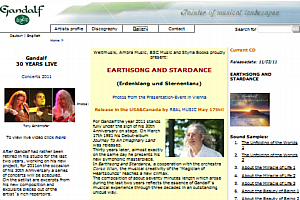 Gandalf : It is just, that your inspiration is initialized by a different source. If there is a certain story you want to express by your music, you first must get fully into the story and then, the pictures or the words will evoke musical ideas.
Gandalf : It is just, that your inspiration is initialized by a different source. If there is a certain story you want to express by your music, you first must get fully into the story and then, the pictures or the words will evoke musical ideas.
Sometimes books can be inspiring, I did project with lyrics from The Prophet by the Libanese writer Khalil Gibran, and also wrote a soundtrack to the book The Stones Of Wisdom by a friend of mine, Ronald P. Vaughan.
John : In the early years you were highly regarded mainly in Europe and other countries prior to your current widespread recognition and status in U.S. markets. Did acquiring a presence in broader international markets influence your music style to fit European or American tastes or was your transition to each country non apparent in your music identity?
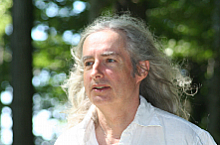 Gandalf : I never really cared much about such matters, it happened more the other way round. When my musical style changed throughout the years it became more or less interesting for different markets. For example, back in the Eighties when I had some Spanish guitar on the opening track of the album The Universal Play it suddenly was released in Spain and South America.
Gandalf : I never really cared much about such matters, it happened more the other way round. When my musical style changed throughout the years it became more or less interesting for different markets. For example, back in the Eighties when I had some Spanish guitar on the opening track of the album The Universal Play it suddenly was released in Spain and South America.
Over all the years I tried to follow my musical vision as honest as possible and did not try to adjust to any market or trend-situation and I think this is one of the reasons, why I am still here. If you try to bend your personal way due to fast changing marketing situations, you may soon get lost.
John : Again, Thank You Gandalf. B.T. Fasmer and I do appreciate this present day opportunity to present our visitors this interview. We wish you well, and we will continue writing more about you in the future. Is there anything you would like to tell your fans or bring up before we close?
Gandalf : I just want to thank you and everyone who helps promoting my works and all my fans for purchasing my records and thus helping me to carry on with the music.
We now invite everyone to visit the gandalf.at homepage then read his biography page. Visit the BSCMusic.com website to purchase / sample his music, then read our pages dedicated to Gandalf.
Photos are courtesy Klaus Rautenberg and gandalf.at.

Steve Orchard is our interview guest today at NewAgeMusicWorld.Com & NewAgeMusic.nu. We welcome our visitors and Steve’s fans to read the recent interview John Olsen has prepared with this outstanding musician from the UK.We would also like to take this opportunity and invite everyone to read more on our pages dedicated to Steve Orchard.
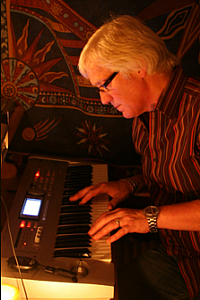 John Olsen : Thank You for sharing a moment of your time with us today Steve. B.T. Fasmer and I appreciate this opportunity and I am certain your fans are excited to have this chance to find out more about you too. Steve, would you provide a description of your music studies beginning with your earliest introduction to the present?
John Olsen : Thank You for sharing a moment of your time with us today Steve. B.T. Fasmer and I appreciate this opportunity and I am certain your fans are excited to have this chance to find out more about you too. Steve, would you provide a description of your music studies beginning with your earliest introduction to the present?
Steve Orchard : Yes, Well I probably go back to piano lessons at 7 years old and then combining guitar lessons at 8. My one fault would be that I have always been an impatient, inquisitive player of various musical instruments always wanting to discover how things worked quickly and then improvise. As my Father would say, “Jack of all trades and master of none”.
I played a pretty mean trumpet in the school band and enjoyed singing in the church choir. My family was very musical. I had an aunt who was a piano teacher. When she regularly visited us, from Birmingham, she would want to hear my progress. She once nearly keeled over when I produced the sheet music for What a Day for a Daydream by The Lovin’ Spoonful ! Outrageous !!!
One side of the family were very properly trained with piano & violin playing and into classical and show tunes, whereas my other granddad was a pub pianist. He ‘vamped’ and ‘boogiewoogied’ his stuff and played harmonica at Christmas parties…. It was hilarious when I think back. It seemed to me that he was more joyous in his approach to music. It’s a belief I still hold today that made me a little rebellious in my approach to making my own music. At an early age I bent a wire coat hanger so I could play harmonica & guitar at the same time, just like Dylan & Donovan. It only resulted in me nearly losing an eye and breaking a tooth. I was the school ‘show-off’ doing plays & pantomimes and guess I fancied a career in something to do with the performing arts. Like most kids I was influenced by the pop of that generation.
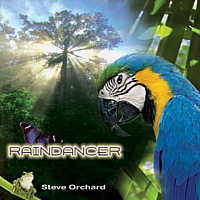 I have made so many friends all around the world with the release of Raindancer. It has been a privilege to be able to share my music with so many enthusiastic people. This is what encourages us composers to continue to ‘up our game play’ to continually raise the standard, stretch, and find the best we can be.
I have made so many friends all around the world with the release of Raindancer. It has been a privilege to be able to share my music with so many enthusiastic people. This is what encourages us composers to continue to ‘up our game play’ to continually raise the standard, stretch, and find the best we can be.
In my teens I enjoyed the diversity of progressive rock, like Yes & The Moody Blues, also the gentle folksy guitar melodies of Joni Mitchell, James Taylor, plus the piano troubadours Billy Joel & Elton John & also, the early electronic sounds of Tomita & Mike Oldfield. I was into that ‘Hippy’ thing and meditated, burnt incense and read a lot of Buddhism…. Took myself a bit too seriously! I was a bit of a ‘geek’ and lived for my music writing little tunes with terrible pretentious lyrics from about 15, spotty, years old.
John : You are a member of the Medwyn Goodall circle of friends as a MG Music label artist. Can you tell us some of your experiences as a member and what it is like to be a MG Label artist?
Steve Orchard : I first heard Medwyn Goodall’s Druid in the July of 1991, in an art gallery in St. Ives Cornwall. It just blew me away and couldn’t put it in any category that I recognized. It was more than music… It was an awesome soundscape and I just knew that it fit me like a glove. I bought it instantly from the gallery on cassette, to play on my ‘state of the art’ Walkman!! When I returned from my holiday I bought it again from New World, on CD. And so began a long period of buying up anything to do with Medwyn Goodalls music.
My wife Julie & I started to correspond with Medwyn and he graciously autographed all our CD’s. He was very open and quite funny. I’ve kept everything he ever sent me, every doodle and every ditty, including all the Christmas cards ( worth a fortune on Ebay …. only joking ) In our early letters ( this was before emails ) I never told Medwyn that I was a musician, thinking that he may feel I was “chasing my own ambitions”…. unthinkable I know but musicians have been known to do it !!!
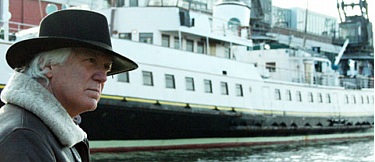 I think I broke the news very humbly, without wanting to sound ‘pushy’ and tarnish this rather lovely correspondence that we were enjoying. He invited me to send anything anytime …. WELL !!! Boy, did I send him some rubbish, poor guy. I hadn’t found my NEW AGE feet yet and although I enjoyed this new genre, I couldn’t quite capture it in my own compositions. He was my mentor, DEFINITELY. He guided me, no doubt, to where I am today. After a few stumbles, falls, and many experimental tracks, I sent song Lull in The Storm from something I was working on called The Consequences of Kisses album. He invited me to produce a new project for MG Music !!!
I think I broke the news very humbly, without wanting to sound ‘pushy’ and tarnish this rather lovely correspondence that we were enjoying. He invited me to send anything anytime …. WELL !!! Boy, did I send him some rubbish, poor guy. I hadn’t found my NEW AGE feet yet and although I enjoyed this new genre, I couldn’t quite capture it in my own compositions. He was my mentor, DEFINITELY. He guided me, no doubt, to where I am today. After a few stumbles, falls, and many experimental tracks, I sent song Lull in The Storm from something I was working on called The Consequences of Kisses album. He invited me to produce a new project for MG Music !!!
You can imagine that this was a dream come true. To be working for the man that I had held in such high esteem for so many years. I soon discovered the family at MG Music is a wonderful bunch and all the other artists swap ideas and tips generally between us. The amazing Paul Sills soon became a great friend & Charmaine, his wife & Meina, his daughter, travelled down to spend an enjoyable weekend with us. We had discussions late into the night and played each other’s new or experimental tracks whilst the rest of the world slept.
I realize how unpretentious and genuine all the MG artists are. Chris Green and I talk on the phone regularly ( very clever & funny guy ) then Simon Lovelock & Clifford White have spent ‘time out’ to critique and give ‘sound’ advice, both brilliant technicians of the art. In the past I have found musicians to be very protective and guarded with their work but not here. The wonderful thing is, we are all so different and diverse yet all the same family, producing a vast mix of choices within the same genre, all under the safe and knowledgeable direction of the man himself, Medwyn Goodall. Be warned budding New Age composers, he will not accept second best on his label.
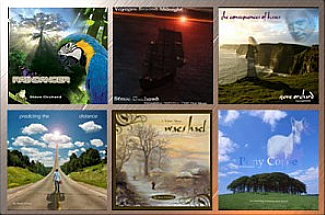 John : In your own words Steve, how would you best describe your music and what are the main components that uniquely sets your music apart from not only MG label artists, but so many other New Age musicians?
John : In your own words Steve, how would you best describe your music and what are the main components that uniquely sets your music apart from not only MG label artists, but so many other New Age musicians?
Steve Orchard : My music almost always originates from a guitar base and is then transcribed onto keyboards. I find the guitar a comfortable friend that I can embrace quietly without any sense of rushing to ‘lay down’ on paper or in the studio. Sometimes I live with a melody for months before it develops into a workable phrase or shape.
I have a terrible bad habit of not documenting tracks I have recorded. I have folders, in my studio, bursting with hastily scribbled chords and lyrics…. Someday I may return to them for inspiration, that’s if I can decipher them, but I hate going back. I prefer to always look forward with my writing. In the making of Raindancer I did a lot of research into the South American rainforest and I story boarded ideas & concepts onto the walls of my studio. Another strict rule I have is I never ever go into the studio unless I am in a happy, contented mood. I like to think that when you listen to a Steve Orchard album that, my positive optimism shines through. Sundancer was almost entirely written in my garden during the summer of 2009. It’s sunnier than a ripe melon !!! As Medwyn says, it has lots of energy & warmth. I think his buzz word for the album was ENERGY !!
John : During the early years in Bristol your music was played on BBC Radio and utilized in music scores for various media programming. In what ways has your music been featured?
Steve Orchard : It seems like a life time ago now but in the 70’s I was in a very popular duo of the time called Mossy, with musical partner Barry Webb ( he’ll be pleased I mentioned his name. ) We played a residency in the cellar bar, at the notorious Bristol Arts Centre. It was a mixture of folk covers and our own written ‘offerings’. We earned a lot of respect locally and had a loyal following amongst the local artists, musicians & regional TV personalities ( I seem to remember being invited and attending a lot of crazy parties ) We were also good ‘fodder’ for the colleges and festivals. At that time we did 3 half hour shows for BHBS radio which led to a spot on BBC’s Friday Folk Nights. BHBS were still playing the jingle we did for them up until a few years ago ( probably when the tape finally disintegrated ) We had a lot of fun but mutually called it a day in 1980 when we both had growing family’s. We remain great buddies.
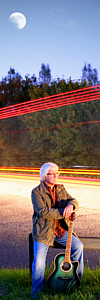 Unbelievable now with all this technology, that I sent out my first demos on ‘spool’ tape. Perhaps most ended up in the bin but one hit home and I was invited up to Apple’s old offices in St. James Street London for an interview/audition. They gave me a good look over and I felt optimistic but, sadly nothing ever became of it. I still have the letter though, dated 6th September 1972 and at the bottom are the printed names of the two directors…. Yes, you guessed, J O Lennon & G Harrison. In the ’90’s I was asked to do the incidental music for ‘Star Runners’. It was a short promotional sci-fi film directed by Andrew Dymond who, I believe, went on to produce ‘Star Hyke’ which was sold to American TV. I wrote about an hour’s worth of instrumental music but only half of it finally reached the finished movie….. My son Daniel & I had a lot of fun going on an all night shoot for the film, eating Mars Bars and drinking Coca Cola all night to stay awake!! The studio day was also fun where we recorded my work, with the help of a prehistoric sequencer, onto video tape and mini disc ( very nostalgic ) Later, with the advent of Channel 5’s birth I was asked by an agent to go up to their TV studios in London to perform one of my own compositions for a forth coming daytime TV show, which I did….. The day flew by in a blur and all I can remember is the hideous cost of car parking on the Tottenham Court Road…. Scandalous !!!
Unbelievable now with all this technology, that I sent out my first demos on ‘spool’ tape. Perhaps most ended up in the bin but one hit home and I was invited up to Apple’s old offices in St. James Street London for an interview/audition. They gave me a good look over and I felt optimistic but, sadly nothing ever became of it. I still have the letter though, dated 6th September 1972 and at the bottom are the printed names of the two directors…. Yes, you guessed, J O Lennon & G Harrison. In the ’90’s I was asked to do the incidental music for ‘Star Runners’. It was a short promotional sci-fi film directed by Andrew Dymond who, I believe, went on to produce ‘Star Hyke’ which was sold to American TV. I wrote about an hour’s worth of instrumental music but only half of it finally reached the finished movie….. My son Daniel & I had a lot of fun going on an all night shoot for the film, eating Mars Bars and drinking Coca Cola all night to stay awake!! The studio day was also fun where we recorded my work, with the help of a prehistoric sequencer, onto video tape and mini disc ( very nostalgic ) Later, with the advent of Channel 5’s birth I was asked by an agent to go up to their TV studios in London to perform one of my own compositions for a forth coming daytime TV show, which I did….. The day flew by in a blur and all I can remember is the hideous cost of car parking on the Tottenham Court Road…. Scandalous !!!
I was invited up to Apple’s old offices in St. James Street London for an interview/audition. They gave me a good look over and I felt optimistic but, sadly nothing ever became of it. I still have the letter though, dated 6th September 1972 and at the bottom are the printed names of the two directors. Yes you guessed, John O. Lennon & George Harrison.
John : You were a band member earlier in life and in addition, widely recognized as a soloist in South West & London England during the 1990’s. Could you tell us about this time period of events you experienced and I just imagine there are some good stories you could tell everyone?
Steve Orchard : Blimey… How long have we got ? I worked a lot. Mainly covers for the pubs, clubs, hotels and summer seasons at holiday parks. I also did gigs for Army & Navy bases. If you are into performance then it is an incredible apprenticeship. You learn a lot about audiences. I spent 8 consecutive New Years Eve’s away from my wife & kids entertaining 1000’s of drunken party people. When the nights success relies on only YOU…. that’s quite a responsibility ( oh and the bingo & raffle ) I performed all over the South West with 3 nighters in London gigs sleeping in theatrical digs above a pub (not something I can recommend) It’s like an athlete. You build up muscles. You know when to be funny and when to keep your mouth shut!! ( Did I mention I did stand-up ? Don’t do it if you want to retain your sanity ha ha ha !!! )
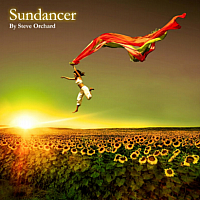 I’ve known great musicians who were lousy entertainers and great entertainers who were rubbish musicians. In 2001 I realized that this was not what I wanted to do anymore. I wanted to return to my roots which was writing & recording. It was in my heart and the only way I could ‘look at myself in the mirror’ as a serious musician. Continually gigging, performing other people’s material makes you slightly morose and can leave your creative side sadly lacking. True, I do miss the adrenalin rush of an audience but what I do now feels right for me and hopefully my audience is out there still enjoying my performance.
I’ve known great musicians who were lousy entertainers and great entertainers who were rubbish musicians. In 2001 I realized that this was not what I wanted to do anymore. I wanted to return to my roots which was writing & recording. It was in my heart and the only way I could ‘look at myself in the mirror’ as a serious musician. Continually gigging, performing other people’s material makes you slightly morose and can leave your creative side sadly lacking. True, I do miss the adrenalin rush of an audience but what I do now feels right for me and hopefully my audience is out there still enjoying my performance.
John : Recently I wrote a review for Raindancer and have made plans to review Sundancer & Moondancer when released. Could you tell us more about your Dancer Trilogy and what each individual album illustrates?
Steve Orchard : Yes, they are companions to each other. I hope my listener/audience hear Raindancer and think, ” Wow! I liked that I’d like to taste some more of that.” Raindancer is very jungle/tribal with some twists and turns in its rhythm’s. I had this picture in my mind of cutting ones way through dense foliage to find a clearing populated by remote civilizations ( does that sound crazy ? ) The indigenous animals and fauna were all playing a part in my composing. Raindancer is where I discovered my New Age capabilities. With the generous direction of Medwyn, I am proud of this album. Sundancer, as I mentioned is all about energy. Islands in the sun and deep tropical seas yet cooling sounds in the midday heat. Rhythms play a big part of this album also and will make people want to move and children dance. My youngest son David is a gifted illustrator having produced many published children’s books has preliminarily designed both, Sundancer & Moondancer album covers. Obviously this is still to be confirmed but his work on all my other albums can be seen on my website.
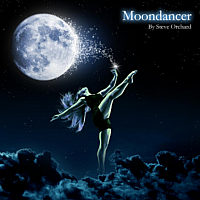 Moondancer …. Is still under wraps. Suffice to say, this is the cool of the evening. The Moon is out in a cloudless night and a billion stars lead us to imagine what life could lay beyond them. This album is entirely recorded on my new studio and at this date still has to be completed but I have some ‘can’t quite keep still’ ideas in my head. I would just say, “Watch This Space!”
Moondancer …. Is still under wraps. Suffice to say, this is the cool of the evening. The Moon is out in a cloudless night and a billion stars lead us to imagine what life could lay beyond them. This album is entirely recorded on my new studio and at this date still has to be completed but I have some ‘can’t quite keep still’ ideas in my head. I would just say, “Watch This Space!”
John : There is a lot of great instrumentation on the Raindancer album. In addition to acoustic guitar what are the instruments you play, and you told me about an upgrade to your project studio, so could you tell us the story behind this recent upgrade?
Steve Orchard : Raindancer is a completely ‘live’ album. By that I mean that it is layered onto a hard disc in the same way as working with analogue ‘tape’. That’s not to say it suffers from sound quality but I felt I needed to embrace a tiny bit more technology going forward. My main keyboard friends are my trusty Korg Triton & Roland Sonic Cell, with expansion boards, plus some other concoctions!!! On with a story…
By now Medwyn and his lovely wife Wendy had become my good friends. He invited me down to his home in Helston, in Cornwall, for a visit and to look at his studio with perhaps, an insight into the more sophisticated way he works. WOW !!! I only say that because a lot of your fellow members and readers of this site will be saying WOW !!! He was considering completely re-building his studio and giving me the opportunity to ‘adopt’ & ‘adapt’ his studio. This is ‘THE STUDIO’ which is responsible for selling over 4 million albums. It was January and the worst winter the UK had seen in 30 years. I was doubtful whether I would be able to make the journey as heavy snow had fallen over most of the South West. I travelled the day before our meeting and the journey was a little ‘hairy’ ( that’s a British expression for OMG !! …. another icey patch!!! ) I just had to go and meet this man face to face. He had a reputation for being ‘very private’ and not conceding to personal visits to their beautiful Cornish home.
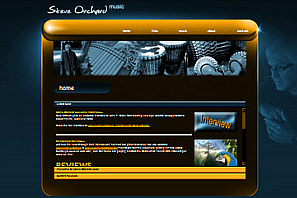 I have to say, that information could not be more wrong. From the outset he was warm and friendly, and we spent the long day in his studio exchanging much humor and banter. I felt relaxed in his company immediately. To be sat elbow-to-elbow in the studio with him was an unforgettable experience. Such ease of understated talent was remarkable ( no, not me, him…. only joking ). Wendy arrived home from there very busy offices and warehouse in Helston and they were gracious enough to take me out for a memorable meal that evening. Suffice to say, I returned the following day with the ‘HEART’ of Medwyn’s studio and since then have amalgamated it into my own studio I think, really successfully ( you will need to wait for the completion of Moondancer to make that appraisal ) I personally can’t wait… It’s going to be special !!
I have to say, that information could not be more wrong. From the outset he was warm and friendly, and we spent the long day in his studio exchanging much humor and banter. I felt relaxed in his company immediately. To be sat elbow-to-elbow in the studio with him was an unforgettable experience. Such ease of understated talent was remarkable ( no, not me, him…. only joking ). Wendy arrived home from there very busy offices and warehouse in Helston and they were gracious enough to take me out for a memorable meal that evening. Suffice to say, I returned the following day with the ‘HEART’ of Medwyn’s studio and since then have amalgamated it into my own studio I think, really successfully ( you will need to wait for the completion of Moondancer to make that appraisal ) I personally can’t wait… It’s going to be special !!
John : On behalf of our visitors and your fans Thank You again Steve. Before we go is there anything you would like to bring up or tell your fans?
Steve Orchard : I have made so many friends all around the world with the release of Raindancer. It has been a privilege to be able to share my music at last, with so many enthusiastic people. This is what encourages us composers to continue to ‘up our game play’ to continually raise the standard, stretch, and find the best we can be. In the spirit of all MG Music Artists I will always try to answer all emails and help other budding musicians in their quest. Everything is possible. It has been a long journey but I still feel opportunities lay ahead of me. So many friends & family ( my closest love & confidant Julie, my wife of 31 years. She’ll be pleased I mentioned her name again! ) have supported me over the years even when I may have floundered. A good friend told me, ”The thing with you Orchard, is that you are PERSISTANT” Oh Yes!”… & keep smiling!
Visit the steveorchardmusic.co.uk homepage and sample his albums on his music page and learn more about Steve on his about page. Here is where you will find our pages dedicated to Steve Orchard.
Sundancer & Moondancer covers by David Orchard. Raindancer cover by Medwyn Goodall. Copyright Steve Orchard.

Davol is my interview guest at NewAgeMusicWorld.Com. Knowing the positive nature of his music, I hope to create a little excitement of our own today. Davol is a widely popular musician easily recognized by his Electronic Contemporary Instrumental melodies that readily elevate the mood sensation and their highly melodic rhythms in turn offer an inspiring upbeat atmosphere.
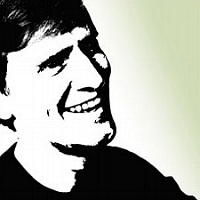 Davol’s music eloquently brings a positive and energetic influence to the forefront of New Age music, and today we hope to encourage every visitor to learn more about him.
Davol’s music eloquently brings a positive and energetic influence to the forefront of New Age music, and today we hope to encourage every visitor to learn more about him.
Review publicist and interview host John P. Olsen has published an earlier review of his current album Good Sign, and I invite you to read this review and more articles about this fine electronic music artist on my pages dedicated to Davol.
Interview with Davol;
John : Thank You for sharing your time with us Davol. Your April 2010 release Good Sign is an excellent album and another fine release of the 6 albums total you have produced since your decision to pursue music as a new career in 1989.
Good Sign is successfully making waves with your large fan base and ZMR charts presently have listed at # 2 for May. This is great news naturally, but I personally believe much more recognition may be in store for Good Sign. What are your thoughts on the direction this album is heading and do you set out to win awards and earn top recognition?
Davol : Although I always try to keep my music at a high standard, I was pleasantly stunned to see how this album has taken off! This is the first time I’ve worked with the renowned promoter Ed Bonk, and it’s been quite rewarding. Every aspect of a creative project is educational, including the promotional side. As for awards, we’ll see what is possible … maybe you could help me out with a Grammy nomination ? ! 🙂
John : Hey, B.T. and I will see what we can do …. Lol!! What you said about Ed Bonk is true. We consider Ed a good friend and hear the exact sediments from his clients all the time. Everyone speaks pretty highly of Ed Bonk ( Lazz Promotions ).
Your scholastic training in jazz, classical piano and harpsichord were early prerequisites in your move toward the more modern music influences you produce today. Would you provide our visitors an outline of your studies and music history?
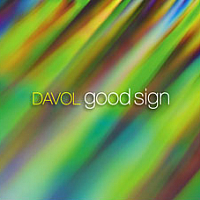 Davol : When I was quite young I started with the trumpet. But the monophonic nature of it frustrated me, so I became interested in piano at the age of 12. I studied classical piano a bit, and harpsichord a little in college. I’m actually now studying jazz piano with a local jazz master. It’s challenging and fun. I’m probably his most remedial student, still learning the basics! In a sense, I kind of feel like my compositional work exists very separately (in my brain and heart) from my previous musical training. Obviously there is some kind of relationship and influence, but I really feel like the electronic music I write is more influenced by my love of pop music.
Davol : When I was quite young I started with the trumpet. But the monophonic nature of it frustrated me, so I became interested in piano at the age of 12. I studied classical piano a bit, and harpsichord a little in college. I’m actually now studying jazz piano with a local jazz master. It’s challenging and fun. I’m probably his most remedial student, still learning the basics! In a sense, I kind of feel like my compositional work exists very separately (in my brain and heart) from my previous musical training. Obviously there is some kind of relationship and influence, but I really feel like the electronic music I write is more influenced by my love of pop music.
John : You have a PH.D and had begun an already successful career as a medical researcher and microbiologist until 1996 when you then chose to begin a commercial venture producing multimedia music. What were the timeline of events that led to your decision to pursue music as a new career and was this career move an easy choice for you to make at the time Davol?
Davol : Oh gosh no, it wasn’t easy. I had worked so hard to become a medical researcher and get my doctorate, but I was also very burned out. I was doing music professionally WHILE I was finishing my PhD in microbiology and continued doing both simultaneously over the years. The problem was that to be a really good scientist, one must be very focused. In other words, you work in the laboratory in the daytime, and you’re expected to read journals and write papers in the evening. I wanted only to write music in the evening! So there was sort of a mutual incompatibility with the two careers. When I left science, I felt that I had learned a great deal and had published significant work. That was satisfying. I actually did return to science in the last 5 years, sort of in a roundabout way; I was a public health educator for a Hepatitis C non-profit organization. I was giving educational talks about HepC, mostly to ex-convicts who were on parole. It was a very unusual and educational experience.
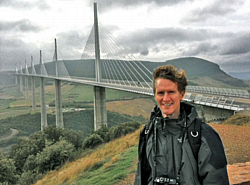 John : I read at your website that many of your albums are designed with a theme in mind based on events during the time period. What themes are behind Mystic Waters & A Day Like No Other?
John : I read at your website that many of your albums are designed with a theme in mind based on events during the time period. What themes are behind Mystic Waters & A Day Like No Other?
Davol : Mystic Waters was released in 1989, a time when “fantasy” albums were all the rage. So, it was conjured up with that genre in mind. There was a sense of peace and tranquility, a sense of fluid movement, like water.
A Day Like No Other marked a pretty big change in my life, sort of a reinvention, as I hadn’t released an album for 7 years (since Open Book). I wasn’t sure that I would do any more albums, frankly. I was burned out and was now producing on my own label. Also, ADLNO was the first album I ever wrote and produced without any co-producer. In other words, I had to finally trust myself, in a very singular sense, and believe in what I was doing! Also, ADLNO was the first album I wrote in a completely software-based studio environment, so the toolset and sound palette was utterly different from the past. It moved me more into a guitar-based sound that I find very appealing for the pop-style in which I write. So, the ADLNO album represented everything “fresh” and “new” to me, hence the name.
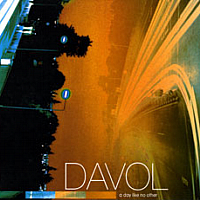 John : Nice reinvention Davol since A Day Like No Other happens to be one of my favorite albums! There were some particular circumstances happening during the production of Good Sign. What was going on at the time and how did you maintain the Davol can do attitude?
John : Nice reinvention Davol since A Day Like No Other happens to be one of my favorite albums! There were some particular circumstances happening during the production of Good Sign. What was going on at the time and how did you maintain the Davol can do attitude?
Davol : Yes, some challenging things … a couple of close loved ones struggling at the end of their lives and passing on, I had to move my mother into a retirement home, find a home for her dog, empty her house and sell it, etc, and a 14-story high-rise was built directly across the street from my home. That meant 1.5 years of incessant noise, my street closed off every day, etc. It was overwhelming. Oh, and I almost forgot, the interior of my house flooded, TWICE.
Due to the construction, I ended up working on the Good Sign album in the evenings. I would start work after dinner and finish at 2:00 am. It was a very unhealthy lifestyle for about a year, but hey, I got it done!! 🙂 I think the album truly was my catharsis, so the focus was JOY, OPTIMISM, and POSITIVITY!
John : After listening to several prior radio interviews at your website and it’s pretty easy to recognize you are a positive and upbeat person as you were saying and just like your music reflects. Is it your intent to instill a positive influence into all of your music and just how exactly do you transfer a positive personality trait into musical notes?
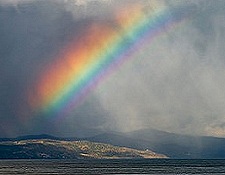 Davol : I guess I have always tried to keep a positive outlook in life. It’s easy to get wrapped up in the tedious minutiae of the day-to-day, but important to never lose sight of the fantastic gifts we all have.
Davol : I guess I have always tried to keep a positive outlook in life. It’s easy to get wrapped up in the tedious minutiae of the day-to-day, but important to never lose sight of the fantastic gifts we all have.
Certainly I try to convey that optimism in my music, but hopefully without being cliché or trite. That can be a fine line, I know. It probably sounds like a really old fogey thing to say, but I’m so glad that I was young when I was! Fashion ads were largely about people with smiles on their faces when I was young. Nowadays, so much of the advertising looks like a bunch of mean, unhappy people wearing sunglasses and deadpan looks – so much pretense and attitude. I like the concept of “hope”, so I would never make a good Buddhist 🙂
I think there is also often a slight tinge of melancholy in the music I write. Sort of a mix of bright optimism blended with a small amount of “reality/regrets/disappointment/loss”. I prefer that 90:10 mix. I can certainly appreciate very dark music, it’s just simply not my forte to write in that genre, so I typically don’t.
John : Yes, I love the dramatic notations you infuse into your work. Has today’s technology made a big impact in regards to the way you have composed music in the past, and what electronic equipment do you use?
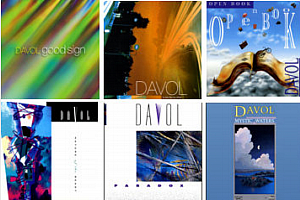 Davol : Yes, definitely. I work on a Mac, using the sequencing host Logic Studio. My sound set includes instruments from every major software synth manufacturer. I’m particularly fond of MusicLab’s RealGuitar product. It’s the BEST for acoustic guitar strums that layer so beautifully with my synth textures. It gives everything a wonderful energy and feel. Using a software-synth studio has advantages and disadvantages, but I’ve chosen to simplify my life by not using any hardware instruments anymore. I could never turn back now.
Davol : Yes, definitely. I work on a Mac, using the sequencing host Logic Studio. My sound set includes instruments from every major software synth manufacturer. I’m particularly fond of MusicLab’s RealGuitar product. It’s the BEST for acoustic guitar strums that layer so beautifully with my synth textures. It gives everything a wonderful energy and feel. Using a software-synth studio has advantages and disadvantages, but I’ve chosen to simplify my life by not using any hardware instruments anymore. I could never turn back now.
John : Good Sign features a song called Truth 2010. This is the first time you have made the Truth song available on CD and is the remix of your conceptual Truth Video that created a dramatic reaction among many people and considered political in nature. How and why did you produce the Truth Video, and what where the political and competition events occurring during production?
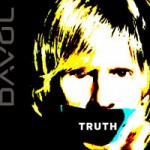 Davol : That was a creative vanity project that appealed to me at the time. And I had never done a video and wanted to learn how to create and edit video. Needless to say, THAT took a great deal of time, but was fun. That was back in 2007 and there was so much political discontent in the US, that I wanted to take a few steps backward and comment on the fact that so much of our “reality” is based on media stories that, for all we know, may have very little to do with the truth. If the past is any judge, everything should be suspect. But we pick and choose, deciding that story “x” is reasonable and we believe it, but story “y” is crazy and we reject it. We do this in history and have created a revisionist history that is written into textbooks. If we know that about history, why don’t we view current events reporting with the same skepticism? So, to return to your question, my focus wasn’t so much on the current politics of the time, but taking a glimpse at the last 100 years or so of US history, in particular.
Davol : That was a creative vanity project that appealed to me at the time. And I had never done a video and wanted to learn how to create and edit video. Needless to say, THAT took a great deal of time, but was fun. That was back in 2007 and there was so much political discontent in the US, that I wanted to take a few steps backward and comment on the fact that so much of our “reality” is based on media stories that, for all we know, may have very little to do with the truth. If the past is any judge, everything should be suspect. But we pick and choose, deciding that story “x” is reasonable and we believe it, but story “y” is crazy and we reject it. We do this in history and have created a revisionist history that is written into textbooks. If we know that about history, why don’t we view current events reporting with the same skepticism? So, to return to your question, my focus wasn’t so much on the current politics of the time, but taking a glimpse at the last 100 years or so of US history, in particular.
John : Do you plan to release more CD albums and song videos in addition to the current ones featured on YouTube, and I ask this half joking Davol, but do you consider yourself a political activist in a sense after the Truth Video?
Davol : No more politics! Read my lips! 🙂 I really want to focus on what I do best, simply write music. And that is where my heart and head truly reside. So, no more detours or distractions from the music.
 Videos take so much time, that I don’t care to be involved in that either, although others are certainly welcome to consider such a project using my music – I’m open to that. Albums are definitely my focus for the future. As for CDs, well, they will soon be obsolete 🙂
Videos take so much time, that I don’t care to be involved in that either, although others are certainly welcome to consider such a project using my music – I’m open to that. Albums are definitely my focus for the future. As for CDs, well, they will soon be obsolete 🙂
John : It has been a pleasure to meet you Davol. B.T. Fasmer and I will keep our visitors informed on the latest news about you so let’s keep in touch. Before we go today, is there anything you would like to tell your fans or bring up that we haven’t talked about?
Davol : I came so close to abandoning my music career before the A Day Like No Other album, that I just want to thank everyone over the years who has emailed me or left a comment on my Guestbook page. It is truly those supportive words, stories of moments in people’s lives where my music touched their hearts that have kept me creating. I thank you all, and hope to keep providing music that will intrigue and touch listeners in a meaningful way.
John and B.T. Fasmer, thank you so much for supporting independent artists and this opportunity to share with fans.
We encourage our visitors to learn more about Davol and the place to find him is his davolmusic.com website homepage. Read his biography page and go to his music page to purchase / sample. Read my review of Good Sign by Davol.

Bryan El is the artist recognized for producing Classical Symphonic New Age music in a highly effective format that makes a grand impression while shedding new light on each and every one of his modern day electronic interpretations. You will find his compositions readily capture your attention right from the first few measures up to the final notes.
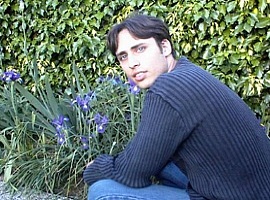 Bryan El is our featured interview guest where the topics of Bryan’s 2 albums, Out of This World & Spiritual Evolution, and his stunning song videos are open for discussion. In addition we take a detailed inquiry into what makes Bryan El’s individualistic approach to music so appealing.
Bryan El is our featured interview guest where the topics of Bryan’s 2 albums, Out of This World & Spiritual Evolution, and his stunning song videos are open for discussion. In addition we take a detailed inquiry into what makes Bryan El’s individualistic approach to music so appealing.
Interview host John Olsen had the opportunity to visit with Bryan El. Today we publish their conversation so that our readers can learn more about the ambitions of this New Age musician many have come to recognized by his remarkable electronic symphonies.
Interview with Bryan El;
John : Thank You for taking time out for our interview Bryan. Recently I wrote album reviews and posted several song videos from Out of This World & Spiritual Evolution because I felt our readers would find your projects are boldly unique from many other forms of electronic music just like B.T. Fasmer and I did. I have read many comments from your fans that support my statement too. It was only logical to ask for an interview so everyone, including your fans could learn more about you.
Let me ask you this first. Many times an artist will say they have another musician’s influence or they “sound like“ another more recognized artist. I personally feel you break new ground with electronic music in many respects and do not “sound like“ another artist. Do you agree and share the same thoughts or do you feel your music closely resembles another artist?
 Bryan El : Many people have a habit of comparing the sound of one artist with another. I believe each individual composer is trying to find their own “sound”. This can be based on several different songs and styles they have heard throughout their lives and have been unconsciously inspired by them. Of course I have my own sources of inspiration as any artist does but I feel I am still evolving my own “sound” as I keep producing new projects.
Bryan El : Many people have a habit of comparing the sound of one artist with another. I believe each individual composer is trying to find their own “sound”. This can be based on several different songs and styles they have heard throughout their lives and have been unconsciously inspired by them. Of course I have my own sources of inspiration as any artist does but I feel I am still evolving my own “sound” as I keep producing new projects.
I honestly couldn’t say what my music will sound like ten years from now and that’s what makes it so exciting. You will always be able to identify similar instruments being used by different artists like pianos, strings and violins, but what matters to me most is the way an artist mixes these together into something unique…. A melody which expresses an emotion like a story that has never been told before.
John : What exactly sets your music apart from so many others Bryan. Is it because your music is Classical Symphony styled, or could it be your upbeat modern day songs are the reason you rise above the crowd from other electronic composers? What are your thoughts Bryan?
Bryan El : Good question. It’s hard to give your own music a “stamp” of its own kind and I don’t really like to compare my music with other artists in terms of “uniqueness”. Each artist is trying to capture emotions in their own way and the beauty of it is…. there are no rules how to do it. It allows composers to experiment by tweaking their own sounds and combining different styles into one to create something new and original. Eventually it’s up to the listener to determine what sets a specific type of music apart from others.
John : Out of the many genres available for a musician to explore, what led to your decision to embrace New Age and then explore the surreal Classical Symphonic music?
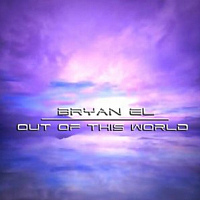 Bryan El : It wasn’t a decision really. It’s not like at some point I decided “hey let’s try the electronic new age category for a change”. I actually experimented with different things never knowing where I’d end up before I started a project. I’m not trying to fit a certain “genre” either. It has never been my intention to compose symphonic electronic music as people may call it. It’s just the global mix of so many different aspects and influences in my life that led me to create this and I am continuously searching to expand my boundaries.
Bryan El : It wasn’t a decision really. It’s not like at some point I decided “hey let’s try the electronic new age category for a change”. I actually experimented with different things never knowing where I’d end up before I started a project. I’m not trying to fit a certain “genre” either. It has never been my intention to compose symphonic electronic music as people may call it. It’s just the global mix of so many different aspects and influences in my life that led me to create this and I am continuously searching to expand my boundaries.
John : Since the artist music of Bryan El consists of you alone, how exactly do you construct your projects to acquire a full orchestra sound, and do you mind telling everyone what equipment you use while recording?
Bryan El : Except from the hardware sounds I get from my Motif 6 synthesizer I am using a mix of VST plugins which I load into my Cubase sequencer. The orchestra sounds like violins & cello’s come from an amazing VST plugin called EastWest’s “Symphonic Orchestra”. The sounds from this VST have been individual-note recorded giving me the freedom to bend the notes to my own will with every detail. The choir vocals come from EastWest’s “Symphonic Choirs” which has a speech utility where you can actually type what the VST plugin should sing in any desired composition. It’s state of the art. Most electronic sounds come from the ReFX Nexus plugin. The Nexus is really awesome. It lets you tweak your own sounds in detail. I don’t know what I’d do without it. Finally the groove is done with Stylus RMX.
John : Would you tell us about your introduction to music starting from your earliest introduction up to present day?
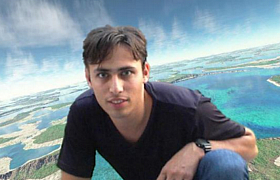 Bryan El : The earliest I can remember is my mother playing these cassettes with very melodic new age/electronic music when I went to bed as a child. I remember it relaxed me so much and some of those tunes are burned in my memory for life because they had such a deep impact on me. I believe some of those tunes were by Vangelis, Tangerine Dream, Karunesh and Aeoliah.
Bryan El : The earliest I can remember is my mother playing these cassettes with very melodic new age/electronic music when I went to bed as a child. I remember it relaxed me so much and some of those tunes are burned in my memory for life because they had such a deep impact on me. I believe some of those tunes were by Vangelis, Tangerine Dream, Karunesh and Aeoliah.
It’s no surprise that when I got a little keyboard for my 10th birthday I couldn’t stop playing with it. Then came the Playstation era. Apart from the many cool games it had there was this awesome music program for it called “Music”. It opened my eyes to all possible things that could be done composing music. It was a basic sequencer which allowed you to freely place your own notes and adapt everything to the smallest detail.
Of course when I listen back to some of the tunes I made on it, I find the sound is quite poor compared to professional sound studio’s but it was a great start for me. When I was about 16 I got hooked on this cool midi sequencer called “Fruityloops” and made some dance tunes with it which I played at my friends parties. The Fruityloops was a next generation for me and much more sophisticated, far better sounds and effects. I was mostly inspired by dance-trance artists like Tiësto, Paul Van Dyk and Armin Van Buuren at the time and I learned a great deal by listening to their sounds, but it wasn’t until I got my Motif 6 synthesizer along with Cubase SX that I started to do some serious composing. I was 20 years old and could finally do what I always dreamed of and make it sound exactly the way I wanted it to. It was only a matter of time I discovered the internet would become a great tool of sharing my music with the world and I was surprised by the amount of positive feedback. I never taught I’d ever get the chance to release my own CD…. let alone two of them :p
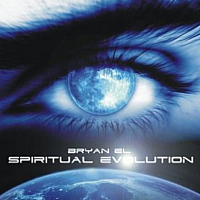 It’s a dream come true thanks to AMAdea. The thing people never seem to understand is that I never actually attended any music school or learned how to read notes. When I have a melody in my mind I just systematically search and set each separate note in my sequencer instead of playing it live. It’s quite a time consuming process but patience is always on my side. I think this proves that anybody can make music if you are determined enough to express your emotions. I’ve never believed anybody should learn a specific set of guidelines and rules when it comes to music, I am autodidact and teach myself by learning from the music world around me.
It’s a dream come true thanks to AMAdea. The thing people never seem to understand is that I never actually attended any music school or learned how to read notes. When I have a melody in my mind I just systematically search and set each separate note in my sequencer instead of playing it live. It’s quite a time consuming process but patience is always on my side. I think this proves that anybody can make music if you are determined enough to express your emotions. I’ve never believed anybody should learn a specific set of guidelines and rules when it comes to music, I am autodidact and teach myself by learning from the music world around me.
John : Since you are one of the many great AMAdea Records Label artists, have you compiled any projects with other AMAdea Records label artists?
Bryan El : Indeed there are many great artists distributed by AMAdea but I haven’t had the pleasure to work with any of them yet. Who knows what the future brings, but for now I’m concentrating on a third solo album.
John : Many of your fans have said the song Solaris is among their favorites out of the many great songs you have produced. Is Solaris your favorite also and what do you believe is the reason this song is so popular among your fans?
Bryan El : Each composer has his own favorite baby and this one’s mine. Solaris is selected for airplay on several internet radio stations around the world. I’ve also produced a trance remix of it which has become quite popular on YouTube. The exposure may have caused the tune to become such a hit among my fans.
””When I have a melody in my mind I just systematically search and set each separate note in my sequencer instead of playing it live. It’s quite a time consuming process but patience is always on my side. Bryan El
John : Your YouTube music videos are some of the best songs combined with visual effects I have seen, and many would agree with me that they are well conceived. Is constructing a song video and getting everything to correspond exactly the way you want it complicated technically?
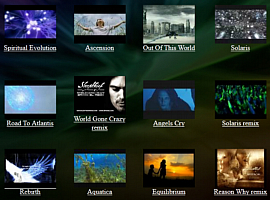 Bryan El : The most complicated thing is to come up with an idea for the video. Once you have that it’s not that hard to assemble the video itself. I’m a music composer and not a movie designer so I had to come up with the solution of using existing footage to present my own music with. I have hundreds of DVD’s and have enough footage about anything you can think of so then I just listen to my song while I imagine what the emotion is showing me. Then I search for fitting footage to the music.
Bryan El : The most complicated thing is to come up with an idea for the video. Once you have that it’s not that hard to assemble the video itself. I’m a music composer and not a movie designer so I had to come up with the solution of using existing footage to present my own music with. I have hundreds of DVD’s and have enough footage about anything you can think of so then I just listen to my song while I imagine what the emotion is showing me. Then I search for fitting footage to the music.
For example…. on my Solaris remix I used small parts of footage from a Tiësto concert dvd and pasted the parts together, muted the original sound, placed my own remix on top and adjusted the footage speed to match my own remix. Eventually it looks as if DJ Tiësto is playing my remix on one of his concerts. All you need is a good video editing program like PowerDirector and you can start editing. Of course none of my video’s are for sale as the images come from existing copyrighted material, but because the amount of footage used is so small it can legally be used under the term “fair use” on YouTube.
John : Could you tell us what do you have going at present, where you are at in composing, and what can we expect to hear from you in the future?
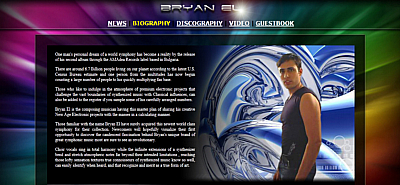 Bryan El : I am planning a third album as you know and many ideas have been roughly recorded. Be patient though…. It will take me at least a few years to get this new album ready. I can’t tell everyone much about it yet but all I can say to the fans is… it will be worth the wait!
Bryan El : I am planning a third album as you know and many ideas have been roughly recorded. Be patient though…. It will take me at least a few years to get this new album ready. I can’t tell everyone much about it yet but all I can say to the fans is… it will be worth the wait!
John : I am certain it will be highly anticipated, and many like myself look forward to your next release. I just wanted to thank you again Bryan. Expect me to write even more about you in the future here at our NewAgeMusicWorld.Com & NewAgeMusic.nu websites. Your music along with the song videos you produce display your talents in a profound way. B.T. Fasmer and I wish you continued success!
Bryan El : Thank you John & B.T. Fasmer! You guys are great and it’s an honor to be on your websites. I also want to thank my fans for their support (it pays for my studio :D) and thanks to AMAdea for distributing and promoting my music and for really caring about their artists!
You may visit Bryan’s new website at bryanel.com right here and visit his CDBaby.com page. Learn more at his profile page and then discover the many fine AMAdea label artists at the Bulgarian based AMAdeaRecords.com homepage. The bryanel.com website is also a great place to sample his music and read the latest news about Bryan El.
*AMAdea Records has just announced the grand opening of their independent music store outlet. You may read about the news here then visit their new amadeastore.com website to read about the specials and vast selection of popular music encompassing every genre they are now offering their worldwide visitors. Interview photos are courtesy bryanel.com.

In an exclusive interview, review publicists and interview hosts John P. Olsen and B.T. Fasmer each take a turn in asking Clifford White a variety of questions on his role in New Age music, and what the future holds for this great artist from the UK.
NewAgeMusicWorld.Com & NewAgeMusic.nu are proud to present this exclusive interview with New Age music legend Clifford White. During this 2010 interview Clifford talks about everything from Ascension (1985) to the upcoming album Atlantis, and he tells everyone a few secrets too!
Interview with Clifford White;
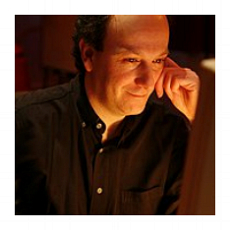 John P. Olsen: Take us back to 1985 when you were 17 years old Clifford. Ascension began your journey as a leading composer and producer of the primordial UK New Age genre, with Ascension selling tens of thousands of copies worldwide to become the strong foundation to your music career.
John P. Olsen: Take us back to 1985 when you were 17 years old Clifford. Ascension began your journey as a leading composer and producer of the primordial UK New Age genre, with Ascension selling tens of thousands of copies worldwide to become the strong foundation to your music career.
What is the reason you are so committed to the New Age genre, and have you ever considered producing music in more popular genres?
Clifford White: Although it was by no means traumatic, I did not have a particularly easy childhood, and by the age of 14 I had developed insecurities and fears which I found I could escape from by creating simple music on the piano, or by using various home keyboards and other musical instruments. Many years later, upon reading Mike Oldfield’s biography ‘Changeling’ I was very moved to hear that he had suffered from similar problems in his youth, and had in fact written Tubular Bells for much the same reason i.e. to escape from a world of fear into a space where the healing power of music could help him in releasing and resolving his feelings – in effect a form of musical catharsis.
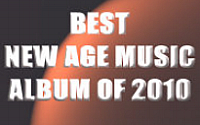 My first album Ascension was written in a comparable frame of mind, and it is quite telling that it went on to have such an impact upon people’s emotional well-being. I am quite positive now that music influences the mind, body and soul in the most profound ways, and that for this reason my commitment to it abides. With Ascension boosting my musical confidence, I went on to produce a further 7 albums over a period of 10 years (1985 to 1995) in a variety of styles and I will continue to be committed to developing and promoting this type of music in the future, within whichever genre it appears.
My first album Ascension was written in a comparable frame of mind, and it is quite telling that it went on to have such an impact upon people’s emotional well-being. I am quite positive now that music influences the mind, body and soul in the most profound ways, and that for this reason my commitment to it abides. With Ascension boosting my musical confidence, I went on to produce a further 7 albums over a period of 10 years (1985 to 1995) in a variety of styles and I will continue to be committed to developing and promoting this type of music in the future, within whichever genre it appears.
John Olsen: I read in your biography at NewWorldMusic.Com, where your solo albums began receiving much press in the UK and were described as “Britain’s foremost exponent of New Age Rock“ and you, (Clifford White) were even listed next to the iconic Rock band, The Who in Collin’s book The Best of Rock. What is the story behind this statement and the early events during the time period?
Clifford White: Well, the ‘Best of Rock’ review was actually a bit of a joke. I mean, who actually creates ‘New Age Rock’ – isn’t that a bit of a misnomer?
In actual fact, it was a well known pop journalist called Alan Clayson that coined the term when he was asked to compile the ‘Best of Rock’ book. I knew Alan at the time, although I was very flattered that he wanted to include me. Imagine my surprise when I found myself next to The Who. Nice.
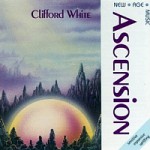 John Olsen: You were the presiding founder of the UK New Age Music Association (NAMA) with 40 top artists including James Asher, Kevin Kendle, Asha Quinn, and Tim Wheater. What was the mission of NAMA as a whole, and were there some ideas formulated that have evolved into what we find in today’s New Age genre?
John Olsen: You were the presiding founder of the UK New Age Music Association (NAMA) with 40 top artists including James Asher, Kevin Kendle, Asha Quinn, and Tim Wheater. What was the mission of NAMA as a whole, and were there some ideas formulated that have evolved into what we find in today’s New Age genre?
Clifford White: Yes there is, and in many ways, my original desires and intentions for NAMA have been spectacularly resurrected with the resounding success of the New Age Music Network: Newagemusicnetwork.ning.com – an online social network with over 500 members. Both then and now, I continue to believe that artists and companies can work together to nurture and support the new age music genre and that, in perhaps our more technologically refined era, social networks such as these provide excellent environments from within which many useful discussions develop and contacts are made.
It is however unfortunate that, just as in the early days of NAMA, there is still a certain degree of exploitation going on (not mentioning any names) but I suppose this is to be expected in any industry, perhaps especially within music. I just wish people would see the logic in working together in teams to a greater extent. I believe our culture suffers greatly from excessive individualism and self interest, and what seems to have become an instinctive cynicism towards collaboration and group support – almost paranoia in some instances. It is therefore refreshing to meet individuals such as yourselves who, quite obviously, have nothing but positive intentions and goodwill as an agenda.
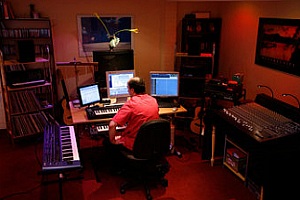 B. T. Fasmer: Please tell us a little about Sanctuary Studio at St Albans. From the pictures on your page, it looks impressive. Do you use mostly DAWs, or hardware synths – or both?
B. T. Fasmer: Please tell us a little about Sanctuary Studio at St Albans. From the pictures on your page, it looks impressive. Do you use mostly DAWs, or hardware synths – or both?
Clifford White: Sanctuary is the current name of my recording studio in St Albans. I set the studio up in 2008 and it is my most ambitious studio to date, certainly in terms of space and creative freedom. Detached from my home and occupying approximately 17ft W by 36ft L, my studio outbuilding has a dedicated sound booth for musicians and singers to perform, a control room and kitchen plus an office area. It was the realization of a 20 year dream to setup this studio and I am truly grateful and thankful to have achieved it. The only trick is finding enough time to spend in it!
On the music technology side I, like so many other producers in our current electronic era, use computers almost exclusively in the process of creating music. I have, over the past 10 years or so, built up a huge sample library of instruments, sounds and effects, which, combined with the software DAW I use – which is called Muzys – accounts for about 99% of my current music output. I do have a traditional ‘vintage’ analogue synthesizer – the Novation Supernova II Pro X, which is truly a beast of a machine – probably the greatest synthesizer ever made in terms of power and flexibility. Unfortunately however, it does not often see the light of day, as it is so much quicker and simpler to layer all of my music directly on the computer.
However, when a special timbre or effect is called for, the Novation is there. I also have a small selection of ‘virtual’ synthesizers (VST’s) which I enjoy using, including Arturia’s FM7, the excellent Yamaha DX7 emulation, which I used extensively on Ascension II. The original Ascension album featured the DX7 quite heavily and so it was truly great to revisit those old sounds in the new album. The freeware Synth1 plugin is also great, with a lovely silky sound, and I have a selection of other freeware VST’s that I use for other purposes, although like I said, raw instrument samples and effects are my usual elements of choice as they offer more control of the overall sound and dynamic than the virtual instruments.
 I have little else that I directly use for my own album productions, although I do have a Behringer MX9000 48 channel mixer and a Mackie HDR24/96 hard disk recorder, which tends to be used mostly by visiting musicians and during improvised and ‘live’ studio sessions. I can directly transfer recordings made on the hard disk recorder to my music PC, importing them into my Muzys DAW as samples which I can then layer into my music, but I have hardly done much of that yet to be honest. I have so much of my own material built up in Muzys now that I suspect I will have enough to keep me going for another 5 or 6 albums at least!
I have little else that I directly use for my own album productions, although I do have a Behringer MX9000 48 channel mixer and a Mackie HDR24/96 hard disk recorder, which tends to be used mostly by visiting musicians and during improvised and ‘live’ studio sessions. I can directly transfer recordings made on the hard disk recorder to my music PC, importing them into my Muzys DAW as samples which I can then layer into my music, but I have hardly done much of that yet to be honest. I have so much of my own material built up in Muzys now that I suspect I will have enough to keep me going for another 5 or 6 albums at least!
John Olsen: During the past 25 years of your New Age music career you have used genre influences in Ambient, Epic, Latin, Jazz, Tropical, and even Classical. What determines the varying influence in each album you produce Clifford?
Clifford White: I love all those genres of music and I am always looking for an excuse to create albums that contain elements of those styles mixed together into the general album concept. Also, I like to try and avoid repeating myself and so the aim of making each new album different from the one that has proceeded it really appeals to me. The way I see it, the whole concept of an album seems to be an entity in it’s own right, with it’s own style, mood and flavor, and once it is finished, it should appear to be a completed work, like a book or a film, and one really doesn’t want to mess with it, add to it, or detract from it with further musings which might simply repeat ideas present in the original work.
I tend to approach the production of an album with this in mind, and I try to pour as many relevant ideas into the same pot as possible, never to be used again. As the album gets further underway, the various track ideas tend to link together, much like chapters in a story, and after a while it becomes self-evident what is working and what is not, in context of the whole. Of course, it is usually nowhere near as easy as it sounds and believe me, I have certainly labored long and hard on tracks which are (unfortunately) later thrown out for not meeting the general concept, style or criteria for the album as a whole. In the end, I try to make the final result as complete and as cohesive a work as I possibly can.
John Olsen: Do you feel the success of your projects are primarily the result of simple hard work or more from your creative imagination? Or what is the primary reason you have been so successful the past 25 years?
Clifford White: You know the old saying that goes ‘one percent inspiration and 99 percent perspiration’? Well, for me it’s more like 15% inspiration, 85% perspiration, but that is still a lot of work! I find that the initial ideas for a track or a collection of tracks tend to occur quite quickly – in the heat of the moment – and this usually results in a collection of strong core ideas. After repeated listening, these ideas seem to become further refined in my own mind – almost as if the process of hearing a piece of music days or weeks later from it’s creation somehow changes it, making it more ‘real’ and familiar. It’s very strange. In any event these ideas, usually in the form of short instrumental loops or arrangements, start to shine through in their own ways, suggesting further developments that could be possible. I tend to wait this process out until I am really ‘chomping at the bit’ to get into the studio to work on a piece. When the urge gets too great, that’s when I unleash myself into the studio and get working. Thus begins the 85% perspiration! A huge amount of effort goes into the process as I am very fussy and critical about my music tracks. They have to stand the test of time, yet sound fresh and new. That’s not an easy thing to sustain when you have already heard them 100 times!
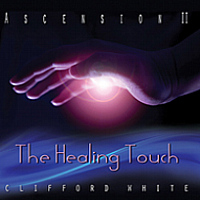 John Olsen: You have your 2010 Ascension II – The Healing Touch, and plan to release another project later this year. Is this next album going to resemble an Ambient influence like Ascension II or more resemblance to your Epic Gods of Olympus?
John Olsen: You have your 2010 Ascension II – The Healing Touch, and plan to release another project later this year. Is this next album going to resemble an Ambient influence like Ascension II or more resemblance to your Epic Gods of Olympus?
Clifford White: I’ll tell you a little secret: I have a 5 year plan to release two albums a year until 2015! Believe it or not, I already have more than enough material to achieve this – it really depends on how much time I will actually get to spend in the studio. With the first in this series – Ascension II – already released, the next album due out later this year will either be Atlantis – which will be another epic production similar to the The Gods Of Olympus – or an album currently entitled The Beach, which will sound a little similar to my past albums The Lifespring or Twilight Paradise with that slightly jazzy, ‘sun-drenched’ tropical vibe. For 2011 I want to tackle two ‘Oxygene/Equinoxe’ type albums that I already have a great deal of material for. I have always loved the textures and moods Jean-Michel Jarre discovered whilst creating his early albums and have for a long-time wished he would revisit that sound. Unfortunately he did not, not even (to my ears) on his Oxygene sequel. I certainly would like to have a go! Following that I have a 2012 themed album planned (no big surprise there perhaps), and a sequel to The Beach, again for which I already have many track ideas. A couple more albums will follow and then as 2015 opens I will round the whole lot off with Ascension III, which will be the 30th anniversary of the original Ascension and make 20 albums in total. It will be very interesting to read this interview in a few years time to see if anything worked out according to my plan. After that – who knows…?
B. T. Fasmer: You have already told us a little about the Atlantis project. Is there anything more you would like to add?
Clifford White: Atlantis will hopefully be completed by around August/September 2010 and released shortly thereafter. The title is a little misleading as, although the album has watery overtones, it is rather more upbeat and rhythmic than you might expect. Its closest comparison would probably be my 2009 album The Gods Of Olympus, at least in terms of its cinematic style and mood. I am quite pleased with what I have completed so far and like GODS, the album will have plenty of tracks to enjoy – at present around 12 – in a variety of styles and moods.
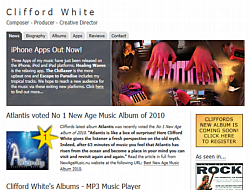 I am thinking of it as a kind of sequel to GODS, and there are certain similarities, perhaps not unsurprising as – from a mythological point of view – The Atlanteans and the Olympians are not-too-distantly related to each other.
I am thinking of it as a kind of sequel to GODS, and there are certain similarities, perhaps not unsurprising as – from a mythological point of view – The Atlanteans and the Olympians are not-too-distantly related to each other.
B. T. Fasmer: You are also an expert in web design, multimedia and video. As everyone knows, the internet has been a massive challenge for the music business – but don’t you agree that it has been mostly positive for a niche genre like new age music? Or?
Clifford White: Overall I would say yes, considering that the Internet is such a fantastic medium for communication between musicians, producers and composers and a superb tool for music promotion and publicity that it has served ‘New Age Music’ extremely well in this regard. The flip-side is that there is now so much music out there that it is impossible to find the good stuff!
I myself spend hours and hours listening to new artists, or past artists I had never heard of before, and much of it is not wildly original, not very satisfying. Don’t get me wrong, I do occasionally find some great music, such as Australis or David Wahler, but these are often exceptions from the norm. Blogs such as your own at NewAgeMusic.nu are fantastic ways to discover new music, although I must admit really that I find a great deal of New Age/Electronic/Ambient/Chillout music a little dull, although I always live in hope of discovering better works in progress. I certainly feel that the Internet provides for great potential in the promotion of this musical genre, and in fact I had myself setup a website to attempt this last year called the New Age Music News which is going from strength to strength. So the future looks positive !
Visit CliffordWhite.co.uk and my pages dedicated to Clifford White. Photograph copyrights Jon Warren & Clifford White.

David Wahler was a relatively new name in the New Age music industry a year ago, only to become a quickly rising star by his first album’s success, and the direction he took. David did in fact win an album award for his first album receiving the Best New Artist Award at ZMR in 2009. The initial reactions to his second album A Star Danced looks just as promising.
David Wahler’s Antiquus album officially released June 1 2009, has some unique qualities not heard in projects from musicians established before him. With this goal in mind David Wahler has managed to produce a debut album that appears to stand alone in personal style and form, creating a model as an artisan would create a grand sculpture adorned with touches of gold, and crafted entirely out of sound.
NewAgeMusicWorld.com & NewAgeMusic.nu have written much about David these past months. Today we are excited to present our visitors an informal interview with David Wahler and New Age Music World interview host John Olsen.
Interview with David Wahler;
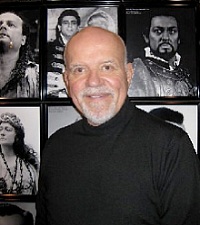 John Olsen : Thank You for allowing us this interview and congratulations on your recent win for Best New Artist of the Year in the March ZMR music awards. It was welcomed news to B.T. Fasmer and I when we heard of your recent win and recognition by the Best New Artist award. You are also a recipient of our own NewAgeMusic.nu Best Albums of 2009 awards prior to your second award, so you have been in the music news quite a bit recently, now recognized and firmly established as a highly regarded composing musician.
John Olsen : Thank You for allowing us this interview and congratulations on your recent win for Best New Artist of the Year in the March ZMR music awards. It was welcomed news to B.T. Fasmer and I when we heard of your recent win and recognition by the Best New Artist award. You are also a recipient of our own NewAgeMusic.nu Best Albums of 2009 awards prior to your second award, so you have been in the music news quite a bit recently, now recognized and firmly established as a highly regarded composing musician.
You must still be pretty excited about receiving high recognition as an artist following your debut album. I am just wondering, did you aim high and set out to achieve this high level of success as a new artist, or did everything just fall right into place while composing Antiquus?
David Wahler : Thanks John for your congratulations. You and B.T. Fasmer have been great supporters since the release of ANTIQUUS. I really appreciate that. The Best New Artist Award was a wonderful surprise, capping off some ‘best of’ lists and several favorable reviews. I did aim high with my first album, as I am aware of all the superb artists who are creating in this genre right now. Putting together ANTIQUUS, however, did seem to flow rather easily, almost like writing a song that ‘releases’ almost effortlessly as opposed to one that one labors over for days and days! The music, concept, titles and art came together fairly quickly and with very little hesitation.
John Olsen : After writing reviews for both Antiquus & A Star Danced, I honestly felt you were poised for much recognition from the very beginning like many others. After final completion of Antiquus, did you feel confident you had a winning first album and have high expectations yourself, or did you have some reservations about the reception of your first album?
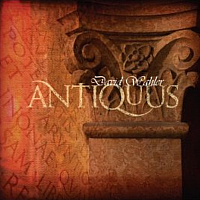 David Wahler : My co-producer and partner, Rick Stevens, and I had no idea how the album would be received. I don’t know if any artist knows how their music is going to resonate with their listeners. I just heard an interview with David Arkenstone where he said that he still has second thoughts and reservations when he releases a new album….. so there you go, and from a great artist with many years of proven success. It’s one of the ‘great unknowns’ I guess, that I will always be burdened with!
David Wahler : My co-producer and partner, Rick Stevens, and I had no idea how the album would be received. I don’t know if any artist knows how their music is going to resonate with their listeners. I just heard an interview with David Arkenstone where he said that he still has second thoughts and reservations when he releases a new album….. so there you go, and from a great artist with many years of proven success. It’s one of the ‘great unknowns’ I guess, that I will always be burdened with!
John Olsen : These reservations among great musicians could be universal then I suppose. David your early success as a musician is quite impressive, and your formal educational studies in music are equally impressive. Would you describe your formal music and educational achievements for our readers?
David Wahler : I was a ‘piano kid’ in my little farm town of Belvidere, Illinois growing up. My first piano teacher, Nellie Canfield, was almost 90, and instilled in me a love of classical music. I remember her driving three of her students (including me!) on a cold winter night to hear the Chicago Symphony Orchestra play a concert of Ravel, including the Piano Concerto in G and the beautiful Daphnes and Chloe Suite. I was 9 years old and had never heard a live musical concert. You can just imagine what an impression that made on a young musical kid’s mind!
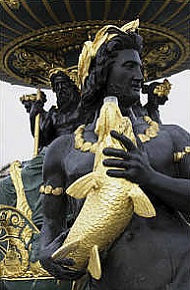 From there I dedicated myself to learning the piano. I attended Lawrence University Conservatory of Music in Appleton, Wisconsin as a piano major. After a couple years there I felt the tug of the big city and I transferred to Mannes College of Music in New York City. My teacher, Mme. Olga Stroumillo, was a great friend of Vladimir Horowitz from their youth in Russia. She introduced me to the great music of the world, and indeed, the great musicians and pianists, from Alicia DeLarocha to Nadia Reisenberg.
From there I dedicated myself to learning the piano. I attended Lawrence University Conservatory of Music in Appleton, Wisconsin as a piano major. After a couple years there I felt the tug of the big city and I transferred to Mannes College of Music in New York City. My teacher, Mme. Olga Stroumillo, was a great friend of Vladimir Horowitz from their youth in Russia. She introduced me to the great music of the world, and indeed, the great musicians and pianists, from Alicia DeLarocha to Nadia Reisenberg.
I began playing for vocalists as a professional accompanist in debut recitals. It was there that I learned the song or ‘leider’ repertoire and gained a real appreciation for the melody. I gravitated to the theatre world in New York and became Musical Director in productions off Broadway. After a couple decades of non-music, making a living in the corporate world, I decided that I wanted to learn to produce my own music. I enrolled in Berklee College of Music’s Electronic Music Production program. I knew I had the music in me, but mastering the electronic part was the big question. I’m definitely not one of the ‘gear geeks’ I studied with at Berklee, but little by little I came to understand (and love) the technical side of what I do.
John Olsen : I am guessing your earlier music background has helped ease your transition to New Age/Electronic music. Did you find the change in genre style more challenging than you had imagined, and since the term New Age leaves room for interpretation, how would you best describe your unique compositions?
David Wahler : Really John, it’s been an easy transition from my classical music background to the music I produce now. With all the wonderful virtual instrumental sounds available now I’m able to incorporate many of the orchestral instruments into my music, from flutes to oboe, harp, strings and on and on. I also love to design new synthesized sounds to compliment these traditional elements. Yes, the term New Age conjures up different interpretations with people and it covers such a very wide spectrum so I refer to my music and genre as ‘Contemporary Electronic Instrumental’.
John Olsen : I am curious why you didn’t begin composing in more mainstream genre’s like Classical, Concert, or Jazz?
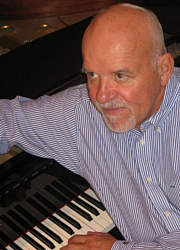 David Wahler : That’s an easy question to answer. Because I absolutely love the ‘world’ of New Age music. From George Winston and Will Ackerman to Vangelis and Tangerine Dream and Francis Lai.
David Wahler : That’s an easy question to answer. Because I absolutely love the ‘world’ of New Age music. From George Winston and Will Ackerman to Vangelis and Tangerine Dream and Francis Lai.
Like in the early days I remember thinking to myself, “finally someone is writing music for me!” I also include wonderful film composers like Ennio Morricone and Hans Zimmer, and current New Age masters Paul Avgerinos, Jonn Serrie, Bernward Koch, Thierry David, and David Arkenstone as huge influences in my musical style.
John Olsen : When you first begin a new project, do you already have a structured outline of ideas in mind for what you plan to produce or do you primarily compose everything as you progress in the project?
David Wahler : For ANTIQUUS my focus was pretty clear that I wanted to produce an album dealing with ancient myths and distant places. I wanted the music to have a structured, yet dreamy and somewhat mysterious quality. So yes, that album was fairly structured from the beginning. A STAR DANCED was much a much different story. It consists of songs that have a very personal meaning to me, and I didn’t have a structured theme, other than the theme of everyone’s human experiences and how we each live under our ‘dancing star.’
John Olsen : Knowing the success and fine reception with Antiquus, and first initial reactions to A Star Danced have been very positive, do you feel A Star Danced will achieve the same highly regarded recognition, and do you feel your current release is of a higher caliber than Antiquus?
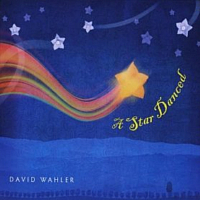 David Wahler : Wow, now that’s a tough question John! One of the pitfalls of early success is that everything is compared to the original. I can only hope that people listen to A STAR DANCED with an open mind and not compare the two. While I feel that I have a recognizable style to my writing, I do feel that the two albums are very different. I tried some new things with STAR like collaborating with guitarist Brent Gunter and writing in more of a cinematic style on some tracks, like ‘Peaseblossom’ and ‘Come Gentle Night’. I also added my arrangements of two classical pieces, Debussy’s ‘Reverie’ and Faure’s ‘Pie Jesu’. It was a challenge to revise these two pieces in a way that would honor the original compositions and yet add a new, fresh perspective. I believe that I was able to achieve those objectives.
David Wahler : Wow, now that’s a tough question John! One of the pitfalls of early success is that everything is compared to the original. I can only hope that people listen to A STAR DANCED with an open mind and not compare the two. While I feel that I have a recognizable style to my writing, I do feel that the two albums are very different. I tried some new things with STAR like collaborating with guitarist Brent Gunter and writing in more of a cinematic style on some tracks, like ‘Peaseblossom’ and ‘Come Gentle Night’. I also added my arrangements of two classical pieces, Debussy’s ‘Reverie’ and Faure’s ‘Pie Jesu’. It was a challenge to revise these two pieces in a way that would honor the original compositions and yet add a new, fresh perspective. I believe that I was able to achieve those objectives.
John Olsen : Yes, I see your point and agree both of your albums have their individual merits, and happy that both are held in high regard. Your current album is dedicated to family members past and present and wondered if you don’t mind telling our readers a little about the life circumstances surrounding the dedication of A Star Danced?
David Wahler : ‘Missing You’ was written while my father was lying in his bed in a coma, dying of Parkinson’s disease. I thought how poignant to be missing him already before he had died. ‘Yvonne’ was written for a family member currently waging her battle against breast cancer. It is a tribute to her beautiful spirit and her unspoken ability to teach others the beauty of life. But I ultimately added these tracks to the album for everyone who has a ‘Yvonne’ in their lives, and everyone who is missing someone – parent, lover, friend, child, pet, relative- who is no longer in their life.
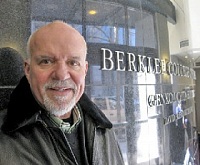 John Olsen : I believe everyone can see the significance to your tribute now. In my review of A Star Danced, I wrote much about the first song Quest and the final song Quest (Revisit) What was the sentiment or dedication behind this song?
John Olsen : I believe everyone can see the significance to your tribute now. In my review of A Star Danced, I wrote much about the first song Quest and the final song Quest (Revisit) What was the sentiment or dedication behind this song?
David Wahler : ‘Quest’ was written for those people in the world who are facing challenges right now. And who doesn’t that include? We are living in perilous, difficult times. Most everyone is dealing with those obstacles that beat them down, obstacles that keep them from reaching their full potential. ‘Quest’ is an anthem, a herald that calls to everyone with setbacks (illness, money problems, death, injury, loss, etc.) to forge ahead and reclaim the spirit of joy and happiness that is our birthright.
John Olsen : Your song dedications are significant to you on a personal level, yet these circumstances remain pretty much universal to everyone. David, there are many hoping you will continue producing music. Do you have current plans for a future album, and what can you tell us about your next project?
David Wahler : I love writing in different styles; in fact, I have been working on a meditation/relaxation album that I would like to produce someday. And I love writing music about ancient and distant lands and worlds. ANTIQUUS was perhaps just a beginning……
John Olsen : I like to leave this last question open ended David since we can’t possibly cover everything in this single interview or even this final question. Is there anything you would like to bring up we haven’t talked about yet?
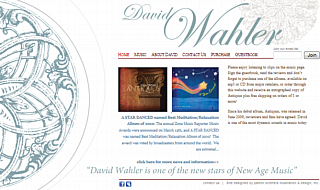 David Wahler : John, a year ago I was sitting and listening to some of my favorite music on Music Choice’s Soundscapes and thinking, “how wonderful it would be to have the world listening to my music, to perhaps touch someone with the sounds that come from my creations.” That was my personal ‘quest’, and now that wish has been fulfilled. I believe, that as Abraham says, ‘just ask and you will receive’. I urge everyone to ‘just ask’.
David Wahler : John, a year ago I was sitting and listening to some of my favorite music on Music Choice’s Soundscapes and thinking, “how wonderful it would be to have the world listening to my music, to perhaps touch someone with the sounds that come from my creations.” That was my personal ‘quest’, and now that wish has been fulfilled. I believe, that as Abraham says, ‘just ask and you will receive’. I urge everyone to ‘just ask’.
John Olsen : Thank You again for leaving us with your insightful words and allowing us this interview David. It’s clear that B.T. Fasmer and I both enjoy your music here at NewAgeMusicWorld.Com & NewAgeMusic.nu. We plan on writing even more about you to present to our readers, so let’s keep in touch. We wish you and your family the very best.
David Wahler : Thanks again John and B.T. for your support of my music. And, I’d like to thank my new found fans and your readers, and those fellow artists, broadcasters, reviewers, and industry insiders in the New Age community who have reached out so warmly to me in the past year!
We invite you to visit davidwahler.com to sample / purchase or his CDBaby.com page. You may read reviews and news about his recent awards on our page dedicated to David Wahler. Photos courtesy davidwahler.com & Bigstockphoto.com.

Composing musician Dr. Michael Brant DeMaria, clinical psychologist, recognized poet, author, public speaker, and now recipient of a prestigious Grammy Nomination, was interviewed by John P. Olsen, New Age Music World host and contributing author with NewAgeMusic.Nu.
Interview with Michael Brant DeMaria;
John Olsen : Giving the fact the Christmas season has arrived, your musical and professional endeavors are numerous, thank you for taking time out for us Michael. BT Fasmer and I also congratulate you on your current Grammy Nomination and recent win with the Native American Music Award, (NAMMY) in the Native Heart category in October. This must be very rewarding, so how does it feel to be recognized by these achievements, and why do you think Siyotanka makes such a decisive impression on those who make award decisions?
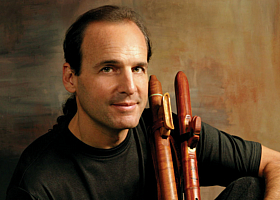 Michael Brant DeMaria : Thank you so much John, and please thank BT Fasmer for me. Your words are greatly appreciated. It is a great honor to be recognized with a Native American Music Award.
Michael Brant DeMaria : Thank you so much John, and please thank BT Fasmer for me. Your words are greatly appreciated. It is a great honor to be recognized with a Native American Music Award.
Although I work in many genre’s of music including New Age, World and Ambient music – I have a deep love and respect for Native American culture, music and wisdom and it’s meant a great deal to me – so this honor is particularly meaningful. The music of Siyotanka really appears to have touched many people with its sincerity, simplicity and honesty.
My goal with the music was to serve the story and try to tell the story musically even if you had never seen the play or are even unfamiliar with the Legend of Siyotanka. What’s beautiful about it is it is really an archetypal story for musicians.
We don’t have room to go into the whole story here – but what I can tell you is it’s a story about finding the song that lies inside of our hearts and the importance of sharing that song with the world – because it is that soul song that tells us who we are, where we come from and where it is we are going. Ultimately, it is also a story about peace – how wood is fashioned for the first time into an instrument of love instead of into a weapon of war. I think that is truly an important story for our time.
John : You have also performed with Grammy nominees, past winners, and are now among a select group of musicians. Who are the artists you have performed with in the past, and what is it like to perform with these other fine musicians?
 Michael : Thank you again John for your kind words. It is an incredible honor to be recognized in this way. My first love was music and it has been my therapy and a balm to my heart and soul so often in my life. I’ve had the honor of performing with many of my musical heros. Two in particular, David Darling and R. Carlos Nakai are two that inspired me for many years.
Michael : Thank you again John for your kind words. It is an incredible honor to be recognized in this way. My first love was music and it has been my therapy and a balm to my heart and soul so often in my life. I’ve had the honor of performing with many of my musical heros. Two in particular, David Darling and R. Carlos Nakai are two that inspired me for many years.
It was Nakai’s Earthspirit which was the first Native American Flute recording I ever heard. It literally brought tears to my eyes. David’s cello can also just reduce me to a puddle. To admire someone for so many years and then have the opportunity to play with them is a true joy. I actually have studied with David over the last four years and am know certified with him as a Music Improvisation Teacher through his Music for People program. He has a huge and generous heart. He’s nominated in the New Age category this year.
John : Perhaps you could tell us how your musical odyssey began. What were the circumstances of your early beginnings in music, and how did you progress from there?
Michael : At the age of 6 years old I would go to the family piano and strike one note at a time and close my eyes to enjoy listening to the note arise and then slowly dissipate. I could do that for long stretches of time. I had a number of surgeries as a child and I realized at a very young age that this process was very healing and soothing for me. I realize now as a psychologist it was a form of music therapy I was practicing – like meditation or self-hypnosis – a trance state if you like. For me, all I know is it felt very sacred to me and could take me to another world.
Then the next turning point musically came when I was 9 years old when I heard my first live jazz at the local high school auditorium. I was absolutely captivated by the drummer on his pearl white drum set electrifying the audience with his syncopated rhythmic playing. My heart did a triple back flip with a double twist – I was just blown away ! I went home that night and announced I was going to be a drummer. It didn’t go over too well – we were a quiet Catholic family – but I sat and practiced my drum pad for months until my parents saw I was serious enough and then one day relented and bought me my own white pearl set of drums that I just adored and played every chance I could get. I had found rhythm and I was addicted !
Then at the age of 18 I bought my first Moog synthesizer. That 6 year old that liked to plunk one note at a time was totally blown away with the sounds that came out of this synthesizer – WOW ! It was like a drug for me. And not only could I generate a sound, but I could modulate it in all kinds of ways. I became a dedicated synthesist for many years. I always heard sounds within me that I have sometimes called the music of the spheres or the hum of God – and here was this keyboard that allowed me to explore to my heart’s content some really wild, far out sounds.
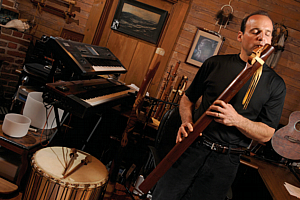 Then, at the age of 31 while heading out to enact a very traditional vision quest in Canada I heard a Native American Flute for the first time – and that took me to a whole other world. There was something about the bittersweet, hauntingly familiar sound of the flute that took me to an even deeper place inside. I had never played a wind instrument before and to make sound with your breath – well, there is nothing quite like it. What was different about the flute was I was in need of some profound healing – it helped me cry and grieve and slowly, but surely brought me back to life after suffering from what I have come to call ‘compassion fatigue’ after working with severe cases of child abuse and neglect for many years. As a result, I’ve spent the last 16 years exploring a variety of ethnic and world percussion and aerophones into my music resulting in my last three commercially released albums, The River, Ocean and Siyotanka.
Then, at the age of 31 while heading out to enact a very traditional vision quest in Canada I heard a Native American Flute for the first time – and that took me to a whole other world. There was something about the bittersweet, hauntingly familiar sound of the flute that took me to an even deeper place inside. I had never played a wind instrument before and to make sound with your breath – well, there is nothing quite like it. What was different about the flute was I was in need of some profound healing – it helped me cry and grieve and slowly, but surely brought me back to life after suffering from what I have come to call ‘compassion fatigue’ after working with severe cases of child abuse and neglect for many years. As a result, I’ve spent the last 16 years exploring a variety of ethnic and world percussion and aerophones into my music resulting in my last three commercially released albums, The River, Ocean and Siyotanka.
John : Later in life you began your own private practice as a clinical psychologist and therapist, creating ONTOS, to help individuals and groups advance in life. What are the principals, mission, and what led you to create ONTOS?
Michael : ONTOS is the Greek word for Being. Being is the most inclusive word in every language. The verb ‘to be’ weaves its way in and out of every sentence and every moment. It refers to the most mysterious essential core of who we are – our inmost Being. For me Being refers to the wholeness that we already are when we connect to the truth that is in our hearts – which is our natural interrelatedness with each other, the natural world and the cosmos – ultimately to all things.
We are very lost today as a culture and a species. We have lost our natural sense of being part and parcel of the earth and cosmos. We have rather been taught the big lie of western culture that somehow we are different and superior to nature when in fact we are part and parcel of nature – we are a part of the web of life, not the owner or exploiter of it.
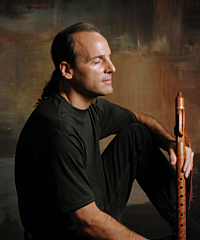 We are paying a dear price for that today – and we need this deeper wisdom of the interconnectedness of all beings to get back into a healthier alignment with the natural world and each other. All human beings share 99.9 percent of the same DNA – only .1 percent accounts for all the differences between all people.
We are paying a dear price for that today – and we need this deeper wisdom of the interconnectedness of all beings to get back into a healthier alignment with the natural world and each other. All human beings share 99.9 percent of the same DNA – only .1 percent accounts for all the differences between all people.
We are all truly brothers and sisters, siblings in the cosmos. We even share 50 percent of the same DNA with Bananas! We are all connected with all living things. The mission of Ontos is to know that people heal and get better when they begin to experience their connection to life, nature and each other in a more fundamental and profound way.
John : Stress for the caregiver is always a result when providing treatment to patients, so how do you yourself regroup, after treating hospice, cancer patients, and abused or neglected children in your care?
Michael : Music, meditation and time in nature. I like to say my holy trinity is nature, creativity and spirituality. They bring me back into alignment. Another analogy I like to use is if I go to the river and get a bucket of water and bring it to people who are thirsty I have to be honest with myself when the bucket is empty and return to the river.
In this way, I remember that I am simply a fellow journey or who is all too human and I try very hard to remind myself to take care of myself in order to be of good to others. I’ve burned out once before and am very sensitive about avoiding that again. For this reason I limit my clinical work to three days a week – and try to keep 4 days a week open for my creative work. This has been a really nice balance for me. Creativity tends to put into my heart and soul what therapy takes out – and therapy tends to put in what creativity pulls out. It’s like crop rotation – replenishing myself by alternating between being an artist and a healer.
John : In your Healing Sound Series you began with The River, which led to the Ocean album. Your next in series will be titled Earth. What led you to begin the series, and in what ways are the albums alike and what are some of the tonal differences in the series?
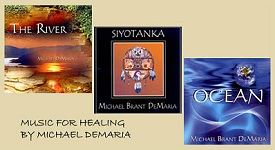 Michael : Great question John. The Healing Sound Series arose from my desire to use music in a way that our ancient ancestors understood it’s use most – for healing.
Michael : Great question John. The Healing Sound Series arose from my desire to use music in a way that our ancient ancestors understood it’s use most – for healing.
Our culture is the only culture on the planet that has used music primarily as a form of entertainment. To the ancient and indigenous cultures on our planet music was always used as a form of community building, ritual, meditation, prayer and most importantly, healing. The medicine man or woman used music, dance and song to do their healing work. This was the first inspiration for the Healing Sound Series.
The second is that as a psychologist I make sound tracks for relaxation tapes and visualization journeys for my clients and have for the last 25 years. I wanted to challenge myself to use this music and make it available to massage therapists, acupuncturists, yoga teachers and meditation teachers on a larger basis. It is also the desire of that 6 year old inside of me that still sees the miracle of life being how something arises and then disappears – perhaps it is an acknowledgement of the fleeting nature of life and how we each come into the world as a song and then must also eventually return to that place we came from. The River actually arose out of my work with hospice patients and my belief that life is like a river – and that when we die – like the river – we just change form as we empty our being into the vastness of Being itself – the Ocean.
The Ocean became a natural follow-up to the The River – to explore this more formless place – the place from which the river comes from and to which it returns. You see this whole mysterious process of living and dying just fascinates me to no end – and music has been an amazing vehicle for me to explore this fascination in a healing way – and it turns out has been healing to others as well – which gives me great joy.
John : Your current release Ocean is dedicated to hurricane survivors like yourself, and reflects on events that have happened in your life. Do you mind telling about this past event, and what is your musical objective for you and the listener?
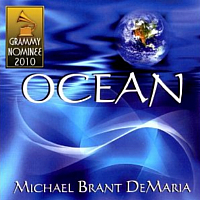 Michael : The Ocean album documents a particularly tragic and painful time in my life after we lost our home during hurricane Ivan. We had to move into the back of my office – my daughter was a senior in High School at a time.
Michael : The Ocean album documents a particularly tragic and painful time in my life after we lost our home during hurricane Ivan. We had to move into the back of my office – my daughter was a senior in High School at a time.
Our lives were turned inside out and upside down when a 15 foot wall of water enveloped our whole neighborhood. 90 percent of the homes on our street were destroyed. The place I taught my daughter to ride her bike, do her first cartwheel and build her playhouse – the place we called home would never be the same.
The water had always been a source of relaxation and peace for me – now it looked anything but – an ominous, unpredictable and dangerous force. It really took me initially to a dark place – but it was out of this darkness that the music started to teach and heal me. I started having dreams of swimming with dolphins, whales and strange underwater creatures. The music really reveals that out of this darkness something beautiful comes.
John : Siyotanka hit #1 and remained in the Top 20 chart for 6 months, you went on to win a Native American Music Award (NAMMY) in the Native Heart category, recently presented in Niagara falls. This album is based on a story, so could you tell us the storyline, and theatrical aspects of Siyotanka?
Michael : Siyotanka is the Lakota word for ‘flute’ and sometimes is translated as ‘great song’. The legend of Siyotanka involves how the first Native American Flute came to be. It’s about a boy trying to find his place in the world.
He thinks he is to hunt and elk – but doesn’t have much success and on the way he is distracted by this hauntingly beautiful, ghost like music. He follows the sound until he comes to a cedar tree that has had a branch hollowed out by termites.
There is a woodpecker who has hollowed out a number of holes in the branch and is jumping from one hole to the other and as he does the wind blows through the branch and creates this mysterious music. He wants nothing more than to make this wood sing like that. It takes time and many adventures – a vision quest, a dream of the spirit of the woodpecker and many other lessons, but finally he learns to make the wood sing. He learns about humility, respect and listening deeply to Nature.
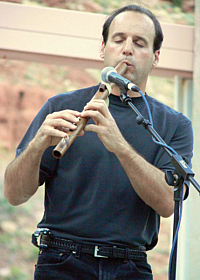 The story reminds us when we are lost and alone, feeling rejected and abandoned, if we look inside our hearts and find the song that is living there we can find our way even through the darkest of times. How a piece of wood can be fashioned into a musical instrument instead of into a weapon – to bring peace instead of war, love instead of hate. Truly a story for our time. The play itself was quite a production. We had a 30 person production team with actors, crew, a beautiful set designed by my co-writer Stephen Lott who also did the ‘shield’ for the cover of the CD. You can find much more about the legend and some of the story behind the music at www.siyotanka.com
The story reminds us when we are lost and alone, feeling rejected and abandoned, if we look inside our hearts and find the song that is living there we can find our way even through the darkest of times. How a piece of wood can be fashioned into a musical instrument instead of into a weapon – to bring peace instead of war, love instead of hate. Truly a story for our time. The play itself was quite a production. We had a 30 person production team with actors, crew, a beautiful set designed by my co-writer Stephen Lott who also did the ‘shield’ for the cover of the CD. You can find much more about the legend and some of the story behind the music at www.siyotanka.com
John : You also are currently working on another album titled Voices, which explores new territory for you. What can we expect from the Voices project?
Michael : This is something I’m very excited about John. Voices will be just that – nothing but human voices. I have been working with my voice more and more – and I’ll be using multi-layering of my voice and perhaps some guess vocalists on this album and we hope it will be a wonderful addition to the Healing Sound Series.
John : In the past you have said nature inspires you the most. What aspects of nature, and how does silence, and individual notes from beginning to end, play an integral role in what you want people to hear and experience in your music?
Michael : My holy trinity is Nature, creativity and spirituality. For me nature is God’s art. When we immerse ourselves in nature we are putting ourselves in alignment with the creative infinity of the universe. Nature has a way of not only healing us, but inspiring us. To me the music of nature is the most profound. There is an organic quality and rhythm to the sound of nature. For me it’s the music of life itself. I never tire of listening to the many sounds present in the natural world. I say I get many of my best stuff from the feathered one’s (the birds)!
John : The instruments you play are keyboards, synthesizer, indigenous flutes, percussion, claves, and other aerophones, but you consider yourself a flutist at heart. Why is the flute your passion, and what are some of the varying tonal attributes in the indigenous flutes and percussion instruments used in your music?
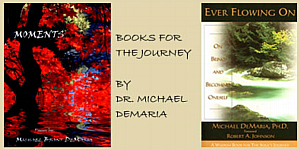 Michael : Yes, John, although I grew up playing keyboards and percussion – and fell in love with the synthesizer in my late teens and 20’s – I’ve come to realize I’m a flute player at heart. There is something about using my breath to create music that connects me with the spirit-that-moves-in-all-things in a profound way. I disappear into the music playing the flute like nothing else. I close my eyes and it’s the closest thing I have ever experienced to flying. I feel my spirit soar when I play – and it is a thrill and joy like no other for me.
Michael : Yes, John, although I grew up playing keyboards and percussion – and fell in love with the synthesizer in my late teens and 20’s – I’ve come to realize I’m a flute player at heart. There is something about using my breath to create music that connects me with the spirit-that-moves-in-all-things in a profound way. I disappear into the music playing the flute like nothing else. I close my eyes and it’s the closest thing I have ever experienced to flying. I feel my spirit soar when I play – and it is a thrill and joy like no other for me.
John : You have presently authored 3 personal growth books, and have stated a love for poetry having performed on stage with world renowned poets. Could you tell us about the books you wrote, and some of your experiences as a recognized author and expressions as a poet?
Michael : I have written 3 books. The first Horns and Halos: Towards the Blessing of Darkness is more of an academic work. This was published in 1992 and explores the terrain of love/hate relationships. I was working with child abuse victims at the time – and I was trying to understand how loving relationships could turn so violent. It was a way for me to make peace with much of the tragedy I was witnessed to for so many years in my early clinical work.
My second book, Ever Flowing On: On being and becoming oneself is a book for a general readership and was my first attempt to write less academically and more from the heart. It includes the story of my first vision quest and my love of music and nature. It is a personal growth book for the serious seeker. It has also been called a wisdom book for the soul’s journey. It is broken into 4 parts, The Source, The Abyss, The Quest and The Dance. It was inspired by a dream where my grandmother came to me and asked me if I died tomorrow, what of value do I have to leave my daughter. My goal was to write down what I felt was important in living a life. It is a book that is near and dear to my heart – a labor of love ultimately for my daughter.
My last book is Moments, which is my first full length collection of poetry. Next to music, poetry is my favorite form of expression. It has always been a companion for me during dark times. It was a great joy for me to play with Robert Bly and David Whyte, both of whom have inspired me creatively in many ways. I can’t remember who said it, but the quote I love most about poetry is that in every poem the universe gives up a secret. I really like that idea – and I personally experience it that way. For me, life itself ultimately is a poem – and to live fully and well is to become an artist of life.
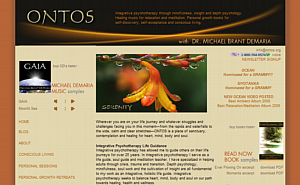 John : Your achievements and experiences are just too numerous to list in this single interview Michael, so I wanted to give you an opportunity to tell our readers anything about yourself we haven’t covered in our interview.
John : Your achievements and experiences are just too numerous to list in this single interview Michael, so I wanted to give you an opportunity to tell our readers anything about yourself we haven’t covered in our interview.
Michael : John, you have been so kind and generous with your words. It’s an honor to be part of newagemusic.nu. I guess the only other area I’d like to share about is that in addition to Siyotanka I have written another play, Café Mezzo that was produced and received wonderful reviews including best play of the year for the theatre it was produced in (The Loblolly Theatre). I have also written a full length screenplay that I hope to see produced one day. My greatest love is weaving music, words and images into meaningful and hopefully healing stories for the soul’s journey. Stories and music have tremendous power to move us and transform us – so it is my hope in my creative work to add a bit of sanity and beauty to a world that is in desperate need of it. I hope I can also inspire others to share their own creative expressions. For me, the artist does for a culture, what a therapist does for an individual. So ultimately all my work arises from the same inspiration and motivation – to heal and become more and more whole – individually and collectively.
John : We wish the best for you as a Grammy nominee Michael. It’s been an honor to learn more about you while preparing, then conducting our interview together. On behalf of our readers, thanks again and let’s keep in touch.
Michael : Thank you so much John. I have thoroughly enjoyed this interview and the depth and genuineness of your questions. Yes, by all means let’s stay in touch – it’s again a joy to be a part of newagemusic.nu! Wishing you, your family and all your readers a blessed holiday season!
Visit Michael’s ontos.org website. My album review of Ocean and related articles are on Michael’s page.
There is a footnote to this Interview. Michael informed me that ZMR has placed his Ocean album at the Top # 1 Recording for November 2009. In addition, Improvijazzation has selected Ocean as their Best Ambient Album of the Year for 2008. This is great news, and we are proud to present some of today’s top talents in the music industry to our readers. Congratulations again Michael! Photos are courtesy of ontos.org.

John P. Olsen, New Age Music World publicist and contributing author for newagemusic.nu now serves as interview host with composing musician John Adorney. During their interview together many topics are covered including John Adorney’s biography, secret to success formula for producing outstanding music year after year, and his newest release entitled The Fountain.
John Adorney began with the Beckoning album which became an instant hit with New Age fans, likewise acquiring many listeners who simply adore the Contemporary Instrumental genre in the process. The Other Shore, Waiting For The Moon, & Trees of Gold are his preceding albums and beloved classics we easily recognize from his relaxed musical signature.
The Fountain is the newest release to showcase his reliable artistry in blending Electronic, Contemporary Instrumental and World music. The album features John Adorney on piano, keyboard, acoustic guitar, cello, and percussion. Vocalist Daya Rawat, and African vocalist Marcel Adjibi, who wrote the lyrics, pleasantly enhance the project on a number of songs with their fluid harmonious voices. It’s a beautiful album from a wonderful and consistent New Age artist.
Interview with John Adorney;
John P. Olsen : Thank you for taking time out of your schedule for us. We welcome you aboard John! It is an honor to meet you not only by your status in the music industry, but BT Fasmer and I happen to be among the many fans of your music!
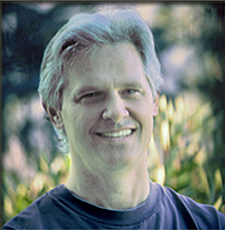 John Adorney : Thanks – it’s great to have this opportunity to speak with you!
John Adorney : Thanks – it’s great to have this opportunity to speak with you!
JP Olsen : Let me start by saying, you began by playing cello at age 9, were self taught on guitar, piano, and also began composing at an early age. Could you tell our readers about your earliest introductions to music and how you first began composing music at this young age?
John Adorney : Both my parents were artists, so initially, drawing was my first love. We had a few musical instruments around the house, and from a very young age, I always loved picking them up and playing with them, picking out tunes. There was always music around the house, and sometimes I would go to church with my mother and grandmother. When the hymns were sung, they were both always singing harmony – never the melody. I think this had a big effect on me – I’ve always loved harmonies as much as anything in music. When I was 11, the Beatles hit America, and I was totally smitten with pop music and taught myself guitar – which, to me, was quite easy compared to studying the cello. Once music clicked for me, I lost interest in doing art – drawing seemed dry to me compared to music.
My parents always supported whatever I was interested in, so they bought me an electric guitar, and later a 12-string acoustic guitar. We also had two reel-to-reel tape recorders in the house, so it occurred to me that I could record myself playing several instruments. I’d record a part on cello, then play the tape out loud, playing a second harmony part along, and recording both on the second tape deck. I’d do this back and forth until the sound quality of the initial recording was so bad, I really couldn’t take it any further. I’d make up my own pieces – I think the layering idea originated from playing in orchestra, where each part is separate, but when put together, creates something large, and often, quite sublime. I actually still have some of those old recordings.
JP Olsen : Some of your scholastic studies are centered around music. Could you describe your fields of study, vocational, and educational achievements?
 John Adorney : I studied cello into my college years, and I was a cello major at the University of Connecticut. I was also I interested in psychology, so when I finished my degree at Antioch University several years later, it was with a double major in music and psychology.
John Adorney : I studied cello into my college years, and I was a cello major at the University of Connecticut. I was also I interested in psychology, so when I finished my degree at Antioch University several years later, it was with a double major in music and psychology.
Then, while teaching music at a school for handicapped children, I discovered that there was a music therapy program at Cal State University, Long Beach. I completed my music therapy training there and became a board-certified music therapist. The semester after I graduated, I was asked to teach music therapy at the University.
JP Olsen : Working with handicapped children must be a very rewarding experience and I can only imagine what that must be like, John. What are some of the challenges and personal rewards felt from your experiences while teaching disabled children, and as a music therapist, how are you able to reach out to severely handicapped individuals?
John Adorney : First, I’d like to say that we’re all handicapped – it’s a spectrum, really, that we stand on at one spot and from there, we judge someone else. I’ve had doctors tell me that someone I was working with was severely retarded, but I knew that this was just because the person couldn’t speak. Of course if someone can’t speak, they’re going to test poorly on an “intelligence” test. It was easy to see by looking in the person’s eyes that they were perfectly intelligent. Common sense is very uncommon, as a very wise man once said.
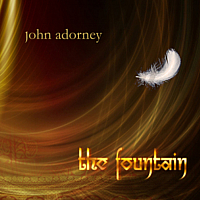 There are so many things that are great about using music as a therapeutic medium. For one, everyone loves music, so it has a universal appeal built into it. I think that this is perhaps especially true for handicapped people. I’ve always loved working with handicapped people, because they just seemed more open to music than most people – they’re not trying to be “cool.” And if there’s any kind of intellectual limitation, then music can transcend that.
There are so many things that are great about using music as a therapeutic medium. For one, everyone loves music, so it has a universal appeal built into it. I think that this is perhaps especially true for handicapped people. I’ve always loved working with handicapped people, because they just seemed more open to music than most people – they’re not trying to be “cool.” And if there’s any kind of intellectual limitation, then music can transcend that.
The actual application of music therapy varies, depending on what the goals are with each client. For example, an autistic person needs to connect to people – he or she lives in a fairly isolated world. My approach in this case would be to enter that person’s world with them – become a companion in their world. This might mean imitating the sounds that they make, and singing along with these sounds, finding out which songs and music the person likes, etc. Then, once I have been accepted as a friend in that person’s world, then he or she and I can venture slowly out from that world in a way that’s safe.
One client of mine has no speech, no movement, eats through a tube and breathes through a tube. She lies on her back all day looking at the ceiling. We have connected through my singing songs to her – I make them up about her, her environment, etc. The music can stimulate her or relax her, depending on what’s called for. She’s an amazing person, and it’s my honor to know her and be able to be with her. It’s all in the eyes and the smiles.
JP Olsen : I think the work you do with handicapped individuals is admirable John, and completely agree with your statement that there is enrichment and something to learn from all individuals, regardless of whether they are handicapped or not. In 1998 you joined the EverSound label and your first album Beckoning has received notoriety by becoming their most successful album to date. What awards and recognition have you received so far on all of your albums, and is Beckoning your most successful album to date?
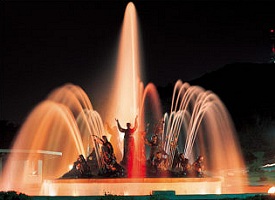 John Adorney : Well, it’s hard to say, whether there’s any difference between Beckoning and my other CDs other than the fact that Beckoning has been out the longest. This is probably why it has sold more than my other CDs. I saw on one radio airplay chart recently that my new CD, The Fountain, was #1, and Beckoning – which was released in 1998 – was #2.
John Adorney : Well, it’s hard to say, whether there’s any difference between Beckoning and my other CDs other than the fact that Beckoning has been out the longest. This is probably why it has sold more than my other CDs. I saw on one radio airplay chart recently that my new CD, The Fountain, was #1, and Beckoning – which was released in 1998 – was #2.
All my CDs have all been received really well. The Other Shore won the Best New Age Recording of 2002. Really, though, I don’t think that awards have anything to do with the value of music. Music really stands on its own. To me the greatest reward is when I get an email from a fan that says the music has had a profound effect on their life. I get some amazing emails, and I’ve already gotten several in response to the song “Even in Your Darkest Hour,” from The Fountain. Writing that song was unique, as it played in my head from beginning to end, exactly as you hear it on the CD. That happens maybe once in a lifetime for most musicians, I think. We forget sometimes how magical this thing called music really is.
JP Olsen : There are many projects with EverSound label artists you have performed with and likewise guest performers on your albums. What are some of the projects have you done with EverSound label artists?
There are two EverSound artists, Lino and Curtis Macdonald, who, after hearing my CDs, wanted me to produce theirs. It was a pleasure working with both of them and hopefully, I was able to add something. They are both extremely talented composers and musicians.
I also produced Diane Arkenstone’s “Best Of” CD, which was released on EverSound. I helped gather the tracks and I arranged the two new tracks on the CD. Diane’s a wonderful human being.
JP Olsen : Your discography consists of Beckoning, The Other Shore, Waiting for the Moon and Trees of Gold. Just released The Fountain does have the Adorney signature sound, yet a unique exploration of it’s own too, so can you offer some input about the ethnic paths taken on The Fountain, along with prior releases?
 John Adorney : I’ve always been a fan of world music and different ethnic grooves and so I’ve always wanted to incorporate them into my music. I’m also a big fan of Indian music – A.R. Rahman, and other so-called “Bollywood” composers. I think Indian music is the most sophisticated music on earth, and has such a rich and ancient history. The instrumentation is fantastic, the grooves are hypnotic, and also, the Indian music is not based on chord changes, as is western music – it’s based on a drone.
John Adorney : I’ve always been a fan of world music and different ethnic grooves and so I’ve always wanted to incorporate them into my music. I’m also a big fan of Indian music – A.R. Rahman, and other so-called “Bollywood” composers. I think Indian music is the most sophisticated music on earth, and has such a rich and ancient history. The instrumentation is fantastic, the grooves are hypnotic, and also, the Indian music is not based on chord changes, as is western music – it’s based on a drone.
I’ve always resisted using Indian sounds in my music because I respect the tradition of their music so much. But I feel there’s been a kind of new recognition of Indian musical elements fused into popular and dance music, which gave me the freedom to finally incorporate some of the Indian sounds. So I think The Fountain incorporates some of these elements more than my previous CDs.
JP Olsen : Do you have a secret to success formula for providing everyone with music having an enduring positive influence over the years, and what inspires you to create and then transfer your thoughts into your compositions?
John Adorney : I don’t know if I can say I have a secret – where music comes from is the real secret. Sometimes as musicians we get too much credit and recognition for simply being a channel for the music that comes into this world.
I always write from a feeling – never about some external thing. I love the un-defined quality in music, which is why I write mostly instrumental music. Even the lyrics in the songs I’ve done are usually open to interpretation, and I never like to say what my own interpretation is, because I don’t want to limit what someone else might experience. To me, what the musician is expressing is not what’s important – it’s what the listener feels when they hear the music.
 I’ve also benefited in my life by being a student of a great teacher named Prem Rawat. He has really cleared away a lot of the garbage in me that would have prevented this music from coming through. If people are interested, they can go to http://www.wopg.org/. That stands for Words Of Peace Global.
I’ve also benefited in my life by being a student of a great teacher named Prem Rawat. He has really cleared away a lot of the garbage in me that would have prevented this music from coming through. If people are interested, they can go to http://www.wopg.org/. That stands for Words Of Peace Global.
JP Olsen : In relation to the technical aspects of your projects, can you tell a little about how your music is produced?
John Adorney : When I first started with Beckoning, and with my second CD, The Other Shore, I was lucky to get Paul Dieter to do the mixing – he was on a break from doing work with Jackson Browne and Crosby, Stills and Nash. He had gotten a Grammy nomination for mixing Jackson’s This Time CD. I don’t even remember exactly how he heard about me, or the other EverSound artists. But I loved working with Paul, and I’d always pick his brain as he worked – I was trying to learn as much as I could about the process. Also, some of my music was mixed by a fantastic engineer, Leslie Chew, who also has taught me a lot about the mixing process. Eventually, I’d felt I’d learned enough to mix my own music, which I started to do with Waiting for the Moon.
My home studio is very small, but with a keyboard and a powerful computer, you can really create some great sounds. I do a lot of tracking in the Midi realm, and then sometimes replay many of the instruments live, to give the music a more “live” feel. I’ve always loved blending electronic and acoustic sounds. Believe me, as a composer I feel very fortunate to be able to play the keyboards, cello and guitar – these really cover a lot of ground, and it helps keep the budget down! Besides – I can play the music exactly as I want it to sound.
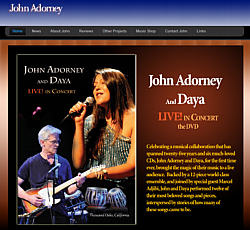 I’ve worked in Cubase and ProTools, but now I work in Logic Studio, and do some audio editing in ProTools. Logic is very musical, but I still find ProToolsto be the simplest program in terms of editing audio. Sometimes if I need to record something live, like Daya’s voice, I’ll bring my equipment to a professional studio in Westlakeand will record the live elements there. Really, all that’s needed is a quiet place and a good microphone.
I’ve worked in Cubase and ProTools, but now I work in Logic Studio, and do some audio editing in ProTools. Logic is very musical, but I still find ProToolsto be the simplest program in terms of editing audio. Sometimes if I need to record something live, like Daya’s voice, I’ll bring my equipment to a professional studio in Westlakeand will record the live elements there. Really, all that’s needed is a quiet place and a good microphone.
JP Olsen : Daya is featured on many of your albums, lending her vocal talents that can only be described as exquisite. Her vocals compliment your music so well and is just a natural combination, so how did Daya’s singing career with you begin?
John Adorney : I was Daya’s music teacher from when she was 7 years old, until she was about fifteen. She’s always had an incredible voice, and a beautiful heart that comes through in her singing, even from a young age. We have a wonderful relationship, and she’s always happy to sing on my projects. I feel really fortunate to not only know her, but to have her sing on my music.
JP Olsen : EverSound and major retail outlets sell your music at present, but I’ve read that CD albums and individual songs will become available on your website. When is your website retail store expected to open?
John Adorney : I’m still working out the kinks on the website store. I want to make sure that it’s a really smooth experience for anyone who goes there to purchase. I know how frustrating poorly-organized websites can be. It should be up and running in the next few weeks. It’ll be fun, because then I can have individual tracks available for download that were never on a solo CD.
JP Olsen : On behalf of our readers, BT Fasmer, and myself, Thank You again for taking time out for us and giving everyone the opportunity to learn more about you on a personal level and the outstanding music you produce that keeps everyone coming back for more. We consistently play your songs on our 365 Home of the Stars Radio and invite our readers to tune in and discover the music of John Adorney.
John Adorney : Thank you – it’s been wonderful having this opportunity to talk about the music with people who are truly interested. Thanks again.
Visit johnadorney.com homepage to sample or purchase, or visit his Amazon.com page. Read our page for John Adorney. Cello picture copyright Bigstockphoto – Stab / David Martyn & johnadorney.com.

John P. Olsen has just conducted an Interview with Mars Lasar. The topics are about Mars Lasar’s remarkable music career, current projects, and innovative technological products. There is some informal conversation about New Age music in general, and what it feels like to be a famous musician with a history of producing impressive albums during his career.
Mars Lasar is a music celebrity known for bringing a total music experience not only to his broad multi genre fan base, but to persons not even familiar with the name Mars Lasar, since he has prepared music scores on many television and film credits over the last 25 years, along with the lengthy discography produced during his music career. During his career he has provided music scores for highly recognized global corporations, and remains a constant producer in the television and film industry, in addition to his traditional album work.
You will find Mars Lasar specializes in a vast range of genre influences with his wide ranging discography, and his nature inspired releases seem to capture the inherent pride and true spirit of the American way of life. His insightful dedication to protection of the heartland that becomes a constant reminder of this gifted artist and conservation legacy that will remain relevant and time honored for future generations.
Mars Lasar is also a professional photographer. The amazing images he has captured have been on display in galleries near and far. When you compare his musical creations to his photographic images, the fine line of distinction between the two creative endeavors are more attune to making a single artistic statement. John Olsen recently interviewed Mars Lasar, and today we are pleased to provide his fans and our visitors their conversation.
Interview with Mars Lasar;
John P. Olsen: Your lifelong career as a musician has already been marked with many outstanding achievements over the years Mars. There are also many moments of media exposure on television and film. Could you tell us some of the programs your music has been aired on past and present?
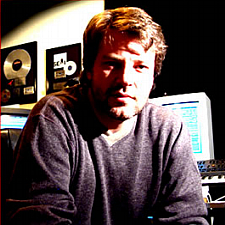 Mars Lasar: I have had my work played on many well known shows like: 24, Medium, American Idol, America’s Most Wanted, Oprah Winfrey, these are just to name a few. I have been providing music for film and television for over 25 years.
Mars Lasar: I have had my work played on many well known shows like: 24, Medium, American Idol, America’s Most Wanted, Oprah Winfrey, these are just to name a few. I have been providing music for film and television for over 25 years.
John: What are some of the greatest moments in your career on a professional level, and could you tell us about the events that were occurring during the single greatest moment to date in your career as a professional musician?
Mars: I must say I’ve had some rather unusual adventures. Being a composer/artist and sound designer with a very large sound library, I was asked to compose all kinds of things from making an orchestra with wildlife sounds to creating hit song productions for the artist Seal. I sat in Abbey Road Studios and spoke music and technology with Alan Parsons, had a cup of tea with Kate Bush, worked with Herbie Hancock and his production team on cutting edge music, wrote video-game music for Sega and Sony Play Station with Keith Emerson from Emerson, Lake and Palmer.
I appeared on the Queen Mary and joined astronaut Buzz Aldrin on topics of energy conservation for Earth Day International, I played synthesizers on street corners dressed in a space suit, assembled an audio rainforest in a dome-shaped butterfly sanctuary in the city, opened for Mike Oldfield on his Tubular Bells tour, traveled to Latvia to represent Russia in the Eurovision contest for which I wrote only the music, the lyrics were in Russian (artist Tatu), I took a shotgun microphone and recorder into the Australian outback and recorded frogs and used them for percussion instruments in my albums, I sampled orchestras that walked out after they found out we were sampling them (in the 80’s), I recorded choirs in France who hid the one that was out of tune. So you see, music and technology led me to many interesting adventures.
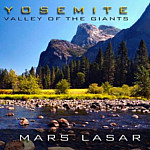 John: Recently when I had an interview with another artist, I asked if making her first individual CD/DVD release of Save The World was easier than she thought it would be. I wanted to ask if having the tables turned by helping the artist with her release was what you were expecting, and were there any memorable moments during the album production?
John: Recently when I had an interview with another artist, I asked if making her first individual CD/DVD release of Save The World was easier than she thought it would be. I wanted to ask if having the tables turned by helping the artist with her release was what you were expecting, and were there any memorable moments during the album production?
Mars: Save The World was probably the most work I’ve ever done with multiple vocals. It was like making a king size quilt with silk and a needle. The stitching involved was never ending and required almost surgical accuracy.
I’ve always been fascinated with the technique of multiple layered vocals, even back when we were using analog tape in the late 80’s. During my years of music production I used this technique wherever possible, but with she being a choir singer and theory whiz, I was really able to push her to the limit.
It was an exhausting 1 year production but well worth the end result. Sometimes the production focus became so intense we just had to break out in laughter during vocal takes, and sometimes in tears. She is a multi-talented artist that often makes appearances on my new releases. I’m sure you’ll be hearing more from her in the near future.
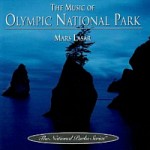 John: You have produced 2 nature inspired projects related to America’s National Parks. Olympic National Park was your first album, and Yosemite: Valley of the Giants your second. I heard through the grapevine you have just completed another nature inspired project. Is this right Mars, and could you provide some details about your latest National Park project ?
John: You have produced 2 nature inspired projects related to America’s National Parks. Olympic National Park was your first album, and Yosemite: Valley of the Giants your second. I heard through the grapevine you have just completed another nature inspired project. Is this right Mars, and could you provide some details about your latest National Park project ?
Mars: Yes, I finished another nature CD dedicated to the Four Corners. This one has plenty of Native American Indian influences. It depicts the vastness of the desert and surrounding canyons, with titles like: Hovenweep, Dead Horse Point, Canyon Lands and White Buffalo Woman. The CD is called Grand Circle and should be coming out late 2009.
John: In working alongside other respected musicians like yourself, including Hans Zimmer in the Days of Thunder Soundtrack, the musician Seal on the album titled Seal, and Herbie Hancock on the Dis Is Da Drum album among the many others. What is it like to work with other great artists like yourself, and were there any memorable moments you would like to share with us?
Mars: There is a deep respect when collaborating with artists and producers that are just as into the skill-set as you are. When collaborating in this manner, you’re looking for a perfect talent match for the customization of the end task, or the “brief”. Sometimes the music comes easy, and other times not so. Every artist I have worked with have their own unique eccentricities, and they change according to what is going on in their lives at that time musically and personally. It’s a detailed puzzle. Even the simplest songs can take forever to accomplish.
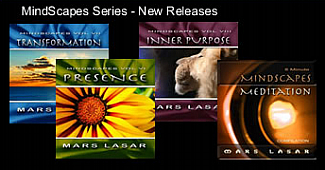 John: From 1998 to 2001 you released the following albums: Sapphire Dreams, 11.02, When Worlds Collide, Karma, and Star Is Born, among others In addition you have produced a number of series projects like the Mind Scape series and Baby Escapes. Was 1998 to 2001 the busiest period in your career, or was there another point in time where producing music was in the forefront? Is there a reason you were so creative during the time period?
John: From 1998 to 2001 you released the following albums: Sapphire Dreams, 11.02, When Worlds Collide, Karma, and Star Is Born, among others In addition you have produced a number of series projects like the Mind Scape series and Baby Escapes. Was 1998 to 2001 the busiest period in your career, or was there another point in time where producing music was in the forefront? Is there a reason you were so creative during the time period?
Mars: From the time I discovered music at 11 to now, I’ve been busy making my own versions of what I call “emotional mathematics”, evoking an emotion from music particularly with the latest technology was my thing. There has never been a dull moment. I just follow my art where it takes me.
The key was How do to make money from my art, so I can continue doing it? Being a composer means you must diversify your talents to survive, and that information varies on so many things that can happen in the industry at the time, which can actually take you off-course for years. I found that once I had the talent, distribution, audience and experience to release multiple works, there was no stopping me.
John: The Eleventh Hour was a successful album. Could you tell the events surrounding The Eleventh Hour time period?
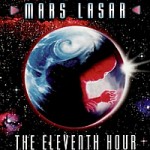 Mars: The only way to explain The Eleventh Hour success was the timing in the environment at the time. Many people were talking about cell-phones frying their brains, they were big and cumbersome in the early 90’s. My song from the cd Cellular City with all its phone noises and technology driven Jazz seemed to hit that chord. Next thing you know it’s playing on heavy rotation on American radio. I went all out on that CD to show my true talents as a composer and sound designer.
Mars: The only way to explain The Eleventh Hour success was the timing in the environment at the time. Many people were talking about cell-phones frying their brains, they were big and cumbersome in the early 90’s. My song from the cd Cellular City with all its phone noises and technology driven Jazz seemed to hit that chord. Next thing you know it’s playing on heavy rotation on American radio. I went all out on that CD to show my true talents as a composer and sound designer.
John: I recently wrote a album review of your At The End Of The Day album, and I found it a nice fusion of Jazz and New Age, noting the fact that many of your albums are a fusion of genres. Do you think this is why your music is so popular, and do you purposely blend genres, or does this just happen naturally for you when creating an album?
Mars: My curiosity for music and art never ceases. It’s the never-ending exploration. For me it’s all about expressing yourself in as many ways as possible and sharing your discoveries with the world. I never wanted to be pigeonholed into the one genre, I just have way too much to express. Because of this my fan base is very broad. From mediation to industrial electronic to jazz. This is also why I like writing for film and TV.
John: Earlier in life you worked 8 years for Fairlight Instruments developing innovative multi-track synthesizer sequencers. Could you tell us about the products you developed and the events you were involved with during your early years?
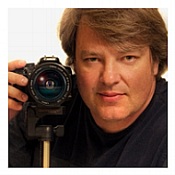 Mars: Back in the early 1980’s I was heavily into “concrete music”. This was very abstract and non-eventful music, but the techniques were interesting to me. I would put a blank cassette tape into my shortwave radio tuner, press record and pause, look for a neat sound on shortwave (lots of squelching to choose from), hold a stopwatch and together I would release pause and start the stopwatch for one second then press the pause again. Then I would look for the next shortwave sound and repeat. In doing this you could make crude but interesting rhythmic patterns and tones. Essentially I was sampling audio and playing it back. At 18 with my knowledge of sampling and classical training on the piano I fell into the lap of Fairlight Computers. The first music computer based production tool in the music business.
Mars: Back in the early 1980’s I was heavily into “concrete music”. This was very abstract and non-eventful music, but the techniques were interesting to me. I would put a blank cassette tape into my shortwave radio tuner, press record and pause, look for a neat sound on shortwave (lots of squelching to choose from), hold a stopwatch and together I would release pause and start the stopwatch for one second then press the pause again. Then I would look for the next shortwave sound and repeat. In doing this you could make crude but interesting rhythmic patterns and tones. Essentially I was sampling audio and playing it back. At 18 with my knowledge of sampling and classical training on the piano I fell into the lap of Fairlight Computers. The first music computer based production tool in the music business.
I worked day and night with the R&D team, explaining the intricacies of music and making the first music sequencer “Page R”, it was the shortwave concept but to the next level. I helped to built the massive sound library that came with the machine, packaged in a cardboard-box the size of a large refrigerator. I quickly became very knowledgeable on the computer and traveled the world demonstrating the Fairlight at trade shows, and personal demonstrations to: Duran Duran, The Divinals, Captain and Tennille, Mike Oldfield, Herbie Hancock, Hans Zimmer, Alan Parsons, BBC, Kate Bush and plenty more.
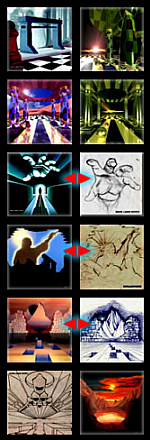 My compositions came with the computer and at a price of $70,000. After helping to get the Fairlight off the ground, I started working freelance. Today the machine is obsolete, PC music software is at a fraction of the price and 100x more powerful, some examples are: Logic, Performer, Cubase and Cakewalk.
My compositions came with the computer and at a price of $70,000. After helping to get the Fairlight off the ground, I started working freelance. Today the machine is obsolete, PC music software is at a fraction of the price and 100x more powerful, some examples are: Logic, Performer, Cubase and Cakewalk.
John: In your art & photography pages at MarsLasar.com I saw some pretty unique paintings along with your CD album collectables and prints available for purchase. I also read some of your oil paintings are created in more of a process than by just using art brushes. Could you tell us a little about how your original works of art are created?
Mars: I grew up with art. My mother is an exceptional fine artist, she taught me how to paint oil on canvas, I was immediately hooked and spent every moment I had figuring out the behavior of oil paint on canvas. At the age of 14 was asked to hang my works in my high school and I just kept going from there. After painting my canvas I would take a high resolution photo and manipulate the image even further in Photoshop. Photography became a natural progression as soon as it became digital, I wasn’t too keen on the darkroom and chemicals in the early days. Now, I take my camera gear everywhere, and most who know me know that I’m off taking photos when I should elsewhere I enjoy making art from music to art design to the business, it’s all the same to me. The most important thing is that I translate my concept across to the audience so you can enjoy the experience.
John: Your earliest music studies as a young adult were the classical works of Beethoven, Chopin, and Bach. Do you believe this classical foundation at a young age carried through into your earlier compositions and even into present day compositions?
Mars: Absolutely. The emotional mathematics behind classical music is deep and well thought out. I connect with my classical roots in most of my work. I think it’s an essential tool for young composers. When it comes to classical music, you can never know enough.
John: The family oriented Baby Escapes series 1 – 8 is intended for relaxation. Was there a personal reason that led you to create the more family oriented recordings, and what specific goal did you have in mind with this series?
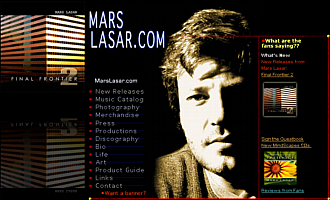 Mars: BabyEscapes was a sonic experiment made to keep my baby daughter asleep. Made in the 1980’s there wasn’t much around in sleep therapy, so I made my own. It worked so well we had to wake her up during naps. The idea was to create a repetitive cyclical loop that essentially massages your mind to sleep. The secret to this is the choice harmonic resonating tones. There is so much to learn about the strength of music and vibration.
Mars: BabyEscapes was a sonic experiment made to keep my baby daughter asleep. Made in the 1980’s there wasn’t much around in sleep therapy, so I made my own. It worked so well we had to wake her up during naps. The idea was to create a repetitive cyclical loop that essentially massages your mind to sleep. The secret to this is the choice harmonic resonating tones. There is so much to learn about the strength of music and vibration.
John: Clearly you have many professional interests like music, art, and new technology. It makes me wonder if you have any just for fun hobbies and what you enjoy doing in your spare time?
Mars: My hobbies start as hobbies then turn into businesses. There is only so much I can do in a day, so I just have as much fun as possible while I’m here for this short stay on earth.
John: I would like to close by saying Mars, that you are perhaps the most talented individual I have ever been introduced to in recent memory! Our readers, and myself do thank you for taking time out to give everyone some insight into both your professional career and personal life.
Mars: Thank you. I have worked hard to deliver our creative expressions to the world. I hope that through our art I can make a difference, and inspire others to do the same.
Visit MarsLasar.com and sample albums at his music store or Amazon.com page. You can visit Mars Lasar’s art pages & photography pages and my page for Mars Lasar. Art and photos are courtesy marslasar.com.
![]()
John P. Olsen, New Age Music World host and contributing author for NewAgeMusic.nu has interviewed composing New Age artist Paul Sills from the United Kingdom. The Interview discussion is focused on Paul Sills early music career, and his 2 outstanding albums, Astral Doorways & Walking Across Heaven.
Astral Doorways was Paul Sills first release that explored the divine and surreal side of music. His first and second release are symbolic of the outer confines in synthesized ambient music that simply become a natural choice for those who love a memorable journey into the outer reaches of electronic resonances and a deeper realm in relaxing music.
Walking Across Heaven is his release that is crafted like a beautiful sound sanctuary where instrumentals of piano, flute, acoustic guitar, and distant choral vocals rose to transform each song into one having an anthem like quality. Today we present this interview to find out more about Paul Sills, and his unique brand of celestial music.
Interview with Paul Sills;
John P. Olsen: I have enjoyed getting to know you after first introducing yourself to me awhile back and found your music history quite interesting. Could you tell our readers about the earliest beginnings in your music career?
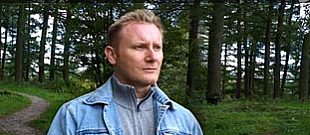 Paul Sills: Thanks John! My family, on both sides, are musical so I was brought up surrounded by people who performed in bands and wrote their own music. My Dad always had a guitar lying around and later purchased a piano and a keyboard. I used to tinker around at an early age, not knowing what chords were but knowing if they sounded nice or not.
Paul Sills: Thanks John! My family, on both sides, are musical so I was brought up surrounded by people who performed in bands and wrote their own music. My Dad always had a guitar lying around and later purchased a piano and a keyboard. I used to tinker around at an early age, not knowing what chords were but knowing if they sounded nice or not.
I took acoustic guitar lessons in the first year of high school but they didn’t last long. I think I preferred to find my own way rather than under instruction. If my teacher knew that I now had two albums released he would fall off his chair!
In my teens I wrote music with a friend of mine, Michael Poole, and we recorded some tracks. I was designated vocalist! In my early 20’s I moved to Singapore to live with my Dad. He had a whole set-up with a 4-track tape recorder. Over those years in Singapore I wrote and recorded, probably, close to a thousand ‘vocal’ ‘rock’ songs. Listening to them now they are very noisy and I would hate for anyone to hear them! Even though I was recording loud and furious, I always felt there was something in there that was atmospheric. Later, I bought myself a Yamaha PSR keyboard which was great for home recording. I joined an ‘expat’ band called Haze where I played guitar. We were noisy but it was fun. I still preferred the solitude of writing and recording.
 It was around this time that I heard Medwyn Goodall’s Clan album. Things took a drastic turn for me as I discovered I had finally found the kind of music I wanted to write. I had previously listened to some of the New Age CDs by Nightingale Records but it was Clan that really took me into the genre. Its still a fantastic album and provides much inspiration to me.
It was around this time that I heard Medwyn Goodall’s Clan album. Things took a drastic turn for me as I discovered I had finally found the kind of music I wanted to write. I had previously listened to some of the New Age CDs by Nightingale Records but it was Clan that really took me into the genre. Its still a fantastic album and provides much inspiration to me.
John: Since you were performing in a Rock band, what led you to leave the group and become a New Age music artist?
Paul Sills: We weren’t a serious band, it was more something to do on a Saturday afternoon. We were all friends in a foreign land and just got lucky that we had a bassist, drummer and someone who could almost play a guitar!
Writing and recording alone is where my passion lies. I can lose hours ‘in the zone’. New Age provides a fantastic outlet to express your creativity in so many different styles. It opens all kinds of doors, you aren’t restricted by the genre and there is always something new to explore.
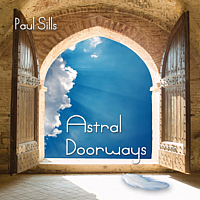 John: What was the specific turning point that finalized your decision to compose your first album Astral Doorways?
John: What was the specific turning point that finalized your decision to compose your first album Astral Doorways?
Paul Sills: I originally sent Medwyn Goodall (MG Music) a demo in 2004. I did get a reply that was both encouraging and helpful. It wasn’t until my second demo in 2006 (with special thanks to Catherine Young and Peter King, from the MG website forum, who encouraged me to do so) that I was offered the opportunity to record an album for the label. The idea for Astral Doorways didn’t come until I had already written an albums worth of material. This material was shelved and I started again, basing the new material on the tracks Cloud Dancing and Astral Doorways. I found I enjoyed the ethereal landscapes with simple but effective melodies. Once I had this idea in my head I went for it with a passion.
John: After your working relationship and friendship with Medwyn Goodall first began, how did you become recognized as a member of the MG Music family?
Paul Sills: Its an honor to be in personal contact with Medwyn. To be a fan of someone’s music initially and then to have both a professional and personal relationship is amazing. He is a really nice guy who is both extremely honest about your music and encouraging. He never flatly says ‘no’ to something unless he knows it has no chance of working. He will nurture and guide you all the way.
I was initially a member of the MG Music forum and got to know like minded people, both musicians and listeners. I already felt part of that family before I even told anyone I wrote music. To then release albums with the label was a real joy. Everyone was encouraging.
John: Naturally, I have heard Clan : Celtic Journey by Medwyn Goodall, and I agree it’s a great album too. So having drawn inspiration from his albums, and also having played in a Rock band, it makes me wonder how the individual Paul Sills style of composing and performing music developed. Was it always present, or did you have to discover your own distinct brand of celestial music?
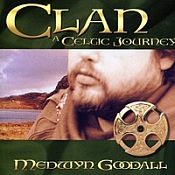 Paul Sills: Influences come from every kind of music for me. I like all kinds, not just New Age. I’m a massive U2 fan, so those earlier albums like The Unforgettable Fire, played a big part. Their partnership with Brian Eno brought them into something else and that transition was when I really latched onto them. Those Eno soundscapes were the initial influence on my music and where I wanted to go with it.
Paul Sills: Influences come from every kind of music for me. I like all kinds, not just New Age. I’m a massive U2 fan, so those earlier albums like The Unforgettable Fire, played a big part. Their partnership with Brian Eno brought them into something else and that transition was when I really latched onto them. Those Eno soundscapes were the initial influence on my music and where I wanted to go with it.
Clan : Celtic Journey showed me melody and rhythm (although I have yet to write any drum related albums) working together to produce drama and passion. The followup, The Scroll, has the most beautiful piece of music ever written – A Maiden’s Kiss. Now, that is probably the biggest influence on me, so far as emotion in music is concerned.
Being influenced by so many different kinds of music has to have some unique effect on what you write yourself. However, when I sit down to write and record, all those influences consciously go out of the window. My head is empty of anyone else’s music and its just me and a blank canvas. Many artists will probably cringe when I say this, but the writing and recording process are done at the same time. I will come up with a simple chord sequence first but after that its all done in the moment. Sometimes it takes hours of building with the final melody rearing its head very late. Sometimes I get lucky and the track will present itself very early. I wrote six albums worth of instrumental material from 2004-06 so I’ve had a good amount of demos to draw from.
John: How would you describe the music of Paul Sills to another person?
Paul Sills: That’s a tough question. It would probably be easier for someone who listens to it to answer that. I would probably say its very atmospheric, mystical and dreamy, with simple melodies that you can latch onto and actually hum. I aim to write emotional music but at the same time something that can take you away somewhere else.
John: If you don’t mind discussing the creative side to your music, when you produced the celestial music of Astral Doorways & Walking Across Heaven, do your creative abilities just occur naturally, or do you have to really work at making everything come together while composing?
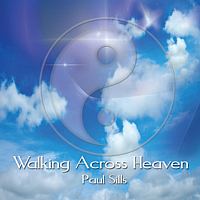 Paul Sills: Well, I write spontaneously most of the time and things happen naturally. This is sometimes a blessing because you are travelling the journey as a listener, not knowing where its going until you get there! It’s also dangerous because the destination may not be the nirvana you hoped for.
Paul Sills: Well, I write spontaneously most of the time and things happen naturally. This is sometimes a blessing because you are travelling the journey as a listener, not knowing where its going until you get there! It’s also dangerous because the destination may not be the nirvana you hoped for.
Writing in this manner allows me to be more creative. If I was to follow a strict brief I would probably end up writing a ‘New Age Painting By Numbers’ album. I doubt it would sound as fluid. Some people work best this way, I know, but I work better when I almost let the music show me the way! We do tend to fight a lot but the music always wins! ha ha!
Saying that, I’m getting more structured these days and plan a little more. For the next album I have planned it like a story, each song being a chapter. I know what approach I need for each track. Each page of my ‘book of chords’ has one word written at the top in bold capitals. This one word is my brief for that track.
John: One question your fans and I want to know is will we see another Paul Sills album soon, or in the future perhaps?
Paul Sills: I’m a quarter of the way through the next one and the tracks, so far, have been well received by MG. Its not been an easy year up until now. I wrote and recorded a whole album and had to shelve it. That was where the spontaneous approach didn’t work out. Although tough, it was the right decision. I came out of it with a fighting spirit and knew what I had to do. I settled on a stronger theme and am really enjoying it again.
John: I admire both of your albums equally and honestly would not have been able to tell which one was your first, if I hadn’t known. Do you feel the same about both albums, or do you have a clear favorite, and could you give us insight into some of your songs during their production?
Paul Sills: Thanks John! Its difficult to choose a favorite as I like each for different reasons. From a production point of view I would say Walking Across Heaven. There is more atmosphere on that album and its more structured with regard to its theme. I learned a lot recording Astral Doorways and applied those lessons to Walking Across Heaven. Astral Doorways has its own uniqueness that I love. Walking Across Heaven has a little more drama, whereas Astral Doorways is very pure and innocent. I do, however, think they go hand in hand and I see them as a pair.
The one track on Astral Doorways that really set me on my path is Angelic Radiance. Once I had recorded that I knew what my sound was and where I was going to take it. That track was originally written back in 1996 in Singapore. The chord sequence and melody just seemed to hit the spot. I used the same chord sequence and melody in the track Angelic Grace where the piano takes more of a leading role.
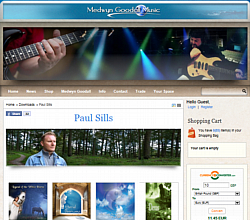 Another favorite track of mine is the opening to Walking Across Heaven, Towards Enlightenment. I think I wrote and recorded that in a couple of days. Its one of those tracks that just fall in your lap and when its finished you think ‘how did that happen?’ Compare that to Footsteps in the Clouds, that took two months to complete, and you are never sure how long a track is going to take and sometimes you never quite know when its truly finished!
Another favorite track of mine is the opening to Walking Across Heaven, Towards Enlightenment. I think I wrote and recorded that in a couple of days. Its one of those tracks that just fall in your lap and when its finished you think ‘how did that happen?’ Compare that to Footsteps in the Clouds, that took two months to complete, and you are never sure how long a track is going to take and sometimes you never quite know when its truly finished!
John: Is there anything you would like to add or tell our readers that I didn’t bring up in our Interview today?
Paul Sills: I would just like to invite all New Age listeners to check out the Medwyn Goodall Music forum. If you like to chat to people who like this kind of music then make your way there and enjoy. The people are very friendly and the topics of conversation vary. You can also get the opportunity to talk to Medwyn Goodall and can ask him anything about his music. All the other artists are also very approachable.
John: Here at our sites we have been playing songs from your albums on our 365 Stars Radio, and they are doing well in ratings, which comes as no surprise to us. I became a fan of your music from the very beginning. B.T. Fasmer and I both Thank You for your time Paul and wish you and everyone at MG Music the best.
Paul Sills: Thank you for your kind words John. All the best to you both… and cheers!
Sample or purchase albums and songs by Paul Sills at Amazon.com. Photos courtesy medwyngoodall.net.

New Age Music World host John P. Olsen has conducted an Interview with composing musician Cadence Spalding. The topics involve her music career, Save The World album, and news about a project currently in progress.
Cadence Spalding is a multi talented singer, songwriter and performer. Many know about her Save The World release and solo performances with another artist on his albums, but there are so many more aspects to Cadence Spalding we wanted to find out more. Cadence is a television network host for a Children’s program in California having already performed in a teaching role for years by her Miss Jenny television personality designed to educate and entertain children in the California community.
Cadence Spalding has recorded and performed original music for children’s musicals that benefit renowned charities, including donations of original scores for documentaries, independent films and commercial CD/DVD’s. In 2008 Cadence composed the scores for both the original and the remake of For The Children, a documentary originally narrated by James Coburn for Share Incorporated based in Beverly Hills, California.
The Save The World release is Classic New Age, where her radiant vocals host a lovely mix of ballads finely tuned to perfection in the purest sense. It is on this release where Cadence instills her personal message of peace, harmony, and dedication to the family unit. It is a message in harmony with all people who share the same logic, devotion and perspective. Today I am pleased to present this interview with a popular new age artist.
Interview with Cadence Spalding:
John : I truly enjoyed meeting you for the first time awhile back. It’s very apparent to me that you are a friendly and sincere person. I am asking this half jokingly, but how did you arrive a such a wonderful disposition Cadence?
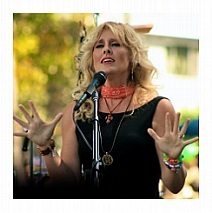 Cadence Spalding: Thank you John for complimenting my disposition – there are so many jokes for right here! – regarding female disposition in general – meaning my family will tell you just how “human” I can really be – but I’ll refrain and say “thank you – that’s such a nice compliment” – and maybe you are just picking up on how blessed and happy in general I’m feeling these days to even be talking about my music – inseparable from myself – and feeling satisfied that those sounds I’ve heard inside my mind for as long as I can remember are finding their way into my voice and through my playing hands and imprinting onto digital recordings and floating through the airwaves and touching hearts – and if even one, that means the world to me – to be able to express my deepest joy and gratitude – and to share that dialogue with others here on earth.
Cadence Spalding: Thank you John for complimenting my disposition – there are so many jokes for right here! – regarding female disposition in general – meaning my family will tell you just how “human” I can really be – but I’ll refrain and say “thank you – that’s such a nice compliment” – and maybe you are just picking up on how blessed and happy in general I’m feeling these days to even be talking about my music – inseparable from myself – and feeling satisfied that those sounds I’ve heard inside my mind for as long as I can remember are finding their way into my voice and through my playing hands and imprinting onto digital recordings and floating through the airwaves and touching hearts – and if even one, that means the world to me – to be able to express my deepest joy and gratitude – and to share that dialogue with others here on earth.
And maybe too you are picking up on the fact that I use music as a tool to soothe myself and to pray and to meditate, so it helps me to relax and to be inspired and to connect with God (although I’m non-denominational), and I can only wish that it can help do the same for the listeners – to help them to pray or to connect spiritually to a God of their choice.
Okay, I’m also just beyond excited about a project I’ve been working on since my early 20’s as a music teacher in public schools called “Miss Jenny”. I perform music in costumes and as a “one-girl-show” on guitar, vocals and piano – singing rock/blues/country versions of kiddy classics. I’m now doing weekly Miss Jenny shows at festivals near my hometown in the Napa Valley, and just got asked to co-host a local, live! TV show here as Miss Jenny called “The N.A.P.A. Show” with host Arty Party. A new adventure, great people, musical, creative, community oriented and lots of fun!!
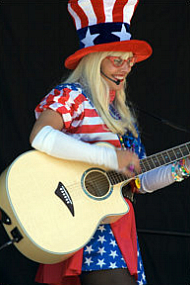 John : You have performed as a vocalist on another artists albums prior to your solo release. Has it been rewarding like expected, composing and performing on your own album, or is it more work than you had expected?
John : You have performed as a vocalist on another artists albums prior to your solo release. Has it been rewarding like expected, composing and performing on your own album, or is it more work than you had expected?
Cadence Spalding: I’ve so enjoyed singing on his albums – they are so diverse. He is a wonderful man, a beautiful father, and gifted artist and a true genius in the studio. Can I say that about my own husband? Well, I just did – lol!! I was a fan of his music long before I met him, and obviously we hit it off on many levels, as now we have a beautiful son and we are married. The crazy thing is that we work together professionally as well, and it all seems to work so well. We are blessed and I think we both know it. Truth is that even though this CD has my name on it, my husband and I really recorded this album together, side by side. It has a lot of co-writes, and he is the sound engineer, and plays a lot of the instruments. And YES, great question John, it was a lot more work than expected – but most worthy things seem to be. Our Christmas album was our first official project together called Star Is Born, so we definitely had a taste of the size of this project ahead of time – but we were held up anyways with a new baby and lots of library music work – so working together on this was perfect timing – as we already were in building and recording mode. The layered vocals take a lot of patience and perseverance to accomplish – but again, revealing this fresh sound that we discovered together is so exciting, and sky is the limit. We have a lot more of these projects to do, and that’s a blessing too.
John: Your first project is Save The World, and is a great album I might add. What was the turning point that made you decide to produce your first solo album?
Cadence Spalding: I’ve been playing, writing, performing and teaching music most of my life – so it was a natural progression to record a solo album. My very first album singer/songwriter album was recorded ages ago actually, and just sold in small outlets – “demo” though, as the quality was slightly below broadcast, but a few of the songs did well publishing wise and I toured with my band in the LA area.
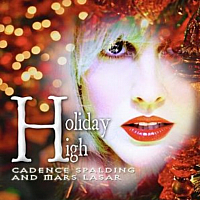 I’ve worked hard on improving my vocals the last 5 or so years – singing in professional choirs and studying voice specifically, and finally technology was accessible for my passion for songwriting and especially harmony. I was also ready to record this album at the same time I was ready to perform a sound like this live. The sound when performed live involves back up prerecorded vocals that I sing on top of in full voice, and I think it sounds even better than the album because I also play rhythm guitar on top of it, and it has a stronger acoustic/rock vibe – live that is. It is a TRIP to do this music LIVE! I LOVE it!! I think of songwriting as something so much more than basic composition – it has really kind of therapy for me over the years. When times were tough, I’d stay up late and write shoe boxes full of songs – often scribbled into journals and on pieces of paper in the middle of the night. Teenage and early adult angst – 1A – and I thank God for the writing getting me through lots of hard times in my young adulthood. And again, I have to thank my family for this, as I come from 4 generations of musicians and music teachers – so piano lessons at age 3 wasn’t uncommon.
I’ve worked hard on improving my vocals the last 5 or so years – singing in professional choirs and studying voice specifically, and finally technology was accessible for my passion for songwriting and especially harmony. I was also ready to record this album at the same time I was ready to perform a sound like this live. The sound when performed live involves back up prerecorded vocals that I sing on top of in full voice, and I think it sounds even better than the album because I also play rhythm guitar on top of it, and it has a stronger acoustic/rock vibe – live that is. It is a TRIP to do this music LIVE! I LOVE it!! I think of songwriting as something so much more than basic composition – it has really kind of therapy for me over the years. When times were tough, I’d stay up late and write shoe boxes full of songs – often scribbled into journals and on pieces of paper in the middle of the night. Teenage and early adult angst – 1A – and I thank God for the writing getting me through lots of hard times in my young adulthood. And again, I have to thank my family for this, as I come from 4 generations of musicians and music teachers – so piano lessons at age 3 wasn’t uncommon.
I was fortunate as a young girl to have mentors to inspire me to be open creatively and to work hard, and they made it fun and interesting for me by praising me for practicing and encouraging the writing throughout my childhood and teenage years. I only wish more parents would encourage their kids to be creative musically. It is a healthy and calming outlet. Just reading notes on a page is so difficult for most children! I wish parents would be more open in general to alternative modes of music education – like for example….uh oh…rock n roll! Aren’t we there yet people? Is this still seen as something “less” than classical music?? How sad. I wish the gift of music for all children in the world. I wish parents would be more open to kids learning rock!!!
John: Your singing abilities are extraordinary. Could you tell us your music background and the instruments you play?
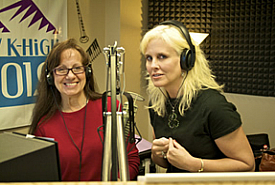 Cadence Spalding: OH my goodness, what a sweet question this is to me, as really most of my life had music as a big part of it, but not as a vocalist. Personally I started piano at age 3 as a result of 4 generations of music teachers behind me – but the ideal age for kids physically, is about 7. Guitar lessons started in high school, and later on that was the perfect instrument for me to teach my students with because of it’s mobility and the fact that kids naturally LOVE rock n roll! In elementary school I was playing in school bands on violin and flute. It was not only just a great hobby – but something that gave me self confidence and joy – and the schools I attended all had terrific programs. Today, it’s unfortunately not available to all children, music education that is, and that truly breaks my heart.
Cadence Spalding: OH my goodness, what a sweet question this is to me, as really most of my life had music as a big part of it, but not as a vocalist. Personally I started piano at age 3 as a result of 4 generations of music teachers behind me – but the ideal age for kids physically, is about 7. Guitar lessons started in high school, and later on that was the perfect instrument for me to teach my students with because of it’s mobility and the fact that kids naturally LOVE rock n roll! In elementary school I was playing in school bands on violin and flute. It was not only just a great hobby – but something that gave me self confidence and joy – and the schools I attended all had terrific programs. Today, it’s unfortunately not available to all children, music education that is, and that truly breaks my heart.
I have always loved to sing, but didn’t study voice formally until well into my adulthood. I had to work very hard to open up my upper register. Once it opened, I never shut up!! I began singing in church choirs as a second soprano well into my adulthood. It was a blast! The feeling of singing music that I love, old and new styles, is euphoric. I can’t get enough. It’s almost like an addiction to be honest…and thank God a healthy one !
John: What were your thoughts behind some of the song lyrics. What is the meaning behind the lyrics in Trust In Love?
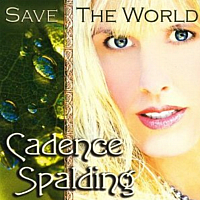 Cadence Spalding: Trust In Love is a prayer. It’s meaning to me is as simple as it sounds – and a universal sentiment that is unique to every individual. We all have parts of our lives where trusting in love is the answer. It’s in integral force in nature in a way – love.
Cadence Spalding: Trust In Love is a prayer. It’s meaning to me is as simple as it sounds – and a universal sentiment that is unique to every individual. We all have parts of our lives where trusting in love is the answer. It’s in integral force in nature in a way – love.
Love makes everything grow, pulls us, inspires us – but is often the difficult choice to make in reality. I was thinking about world peace when I wrote this song, hoping that just in general, mankind would trust in love more. The lyrics are straight forward and it is written in classic Celtic prayer form with traditional early American church hymns and chorales as the inspiration.
I was struck by the melody which is almost circular – each verse like a complete thought or sentence – and to you musicians out there – returning to the one cord before you would expect – giving it that “old” feel naturally. Grandma’s Song is more of a traditional Pop! ballad written in 3/4 time or a “waltz” time signature, and was written for my Grandma when she passed away.
I wrote that entire song, music and lyrics, on the night that she actually died. It was a supernatural experience. I am positive that she helped me write it from the “other side”– it was a beautiful journey. I still get choked up by that song, and I perform it at lots of family type of events like birthdays and unfortunately, funerals. It is a song with deep sentimental value to me.
John: What were the song lyrics in Share Your Life about?
Cadence Spalding: Share Your Life was a song off my very first album – ages ago and a different name even…for a documentary for handicapped children for a beautiful organization called Share Inc. in Los Angeles. I was so honored to be a part of that prestigious charity group, a “Share Lady”. We raised nearly a million dollars a year for handicapped children in the Los Angeles area – doing an annual event/live show where we sang and danced on some of the greatest stages with some of the greatest talents in Hollywood. I was asked to write a theme song for their promotional video that was originally hosted by the late, great James Coburn.
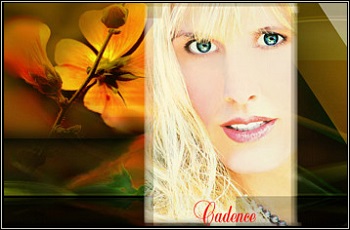 The song came to me quickly, after being deeply moved by volunteering at a hospital for severely handicapped children. I was overwhelmed, beyond tears – at the strength and courage of the staff at these hospitals and by the families involved. The words came naturally and straight from the heart – and my cherished “sisters”, the lovely ladies of “Share Inc.” were so inspiring and supportive of my songwriting. Children, along with animals, are part of that family of “voiceless creatures” of the earth that we as healthy adults, are responsible for.
The song came to me quickly, after being deeply moved by volunteering at a hospital for severely handicapped children. I was overwhelmed, beyond tears – at the strength and courage of the staff at these hospitals and by the families involved. The words came naturally and straight from the heart – and my cherished “sisters”, the lovely ladies of “Share Inc.” were so inspiring and supportive of my songwriting. Children, along with animals, are part of that family of “voiceless creatures” of the earth that we as healthy adults, are responsible for.
We share this burden as humans – it is given to us at birth – to care for these voiceless creatures. The littlest amount of volunteering can do a mountain of good, and it makes us feel alive and content in return. “Time to make it right…share your life…” Seems so simple –but I think many of us want to help more but don’t know where to begin. Thanks John for asking me about that song. I get moved every time I think about all the inspiring philanthropy I have been privileged to witness. I’m talking about such hard work and dedication from ordinary people that is beyond belief.
John: I read you are working on a new project. What can we expect Cadence?
Cadence Spalding: My new album is nearly finished and listeners can expect a release late this year or early 2010 – and I’m thinking of calling it “sessions” as it features an eclectic mix of pop, rock, new age, classical and even a dash of country. A feast of flavors – and a few surprises as well, with even an occasional acoustic version of the Cadence Spalding songs from Save The World that I’ve been getting requests to sing “naked.” Not me LOL, but the songs!! And so I did, happily, after producing them with often hundreds of layers of vocals per song and extensive instrumentation and sound design, it was a true pleasure to record them in their original form – acoustically.
My test for my music, in the beginning, has always been just that. I try to go by the philosophy that if a song is good raw, acapella even, it can then be built into anything and virtually in any musical style. So this new album I’m now creating will be a whole new adventure – evolving and building on the past and continuing to explore the sound we discovered, while revealing a more “raw” side, kind of a glimpse of my “underbelly” as an singer/songwriter – and as a woman too.
John: You had told me that you volunteer your time with children. Could you tell us about your volunteer work?
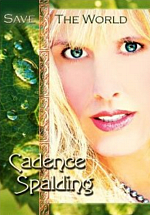 Cadence Spalding: In the past I have done many years of charity work involving music – often by volunteering my services as a music teacher, choir director, dancer, director – you name it. A music teacher by trade, and as jobs for Art Education in public schools becoming more and more sparse and low paying, I would get involved in all kinds of productions for charity in the beginning, just because I wanted to work and to learn. This lead to more work than I bargained for, but I don’t regret a single day of it.
Cadence Spalding: In the past I have done many years of charity work involving music – often by volunteering my services as a music teacher, choir director, dancer, director – you name it. A music teacher by trade, and as jobs for Art Education in public schools becoming more and more sparse and low paying, I would get involved in all kinds of productions for charity in the beginning, just because I wanted to work and to learn. This lead to more work than I bargained for, but I don’t regret a single day of it.
I have composed songs for a group called songsoflove.org, an organization in NYC that writes and records songs for terminally ill children. I also wrote original musicals for kids for various churches, and even owned a performing arts school for kids at one point in San Francisco that did a lot of volunteering for the community. It’s just so much fun – all of it. What could possibly be more of a gift than sharing music with kids? Amazing. I think I get more out of it that anyone, and when I perform or write music for a charitable cause – the added pleasure of being thanked for my time makes it a treasured part of my life that brings me pure joy. It’s the ultimate high!! Please check the inside of my CD cover for Save The World for a list of charity organizations I’m involved with and how to donate time or money.
John: It has been great to visit with you again Cadence. I look forward to our next visit and doing a review of your next project. Thanks again for taking the time to do an interview with me.
Visit CadenceSongs.com or sample and purchase this album at Amazon.com. Read my Save The World album review. Photos are courtesy Cadence Spalding.

John P. Olsen, New Age Music World host and contributing author for newagemusic.nu has conducted an interview with Australis, composer and producer Oscar Aguayo. Drawing imagination from experience in his homeland and earliest life changing events, Australis is a mixture of New Age, Electronic, Ambient, Neo-Classic and Ethnic, in contrasting genres. Together there is a fine emotional depth in all of his releases that portray a wonderful contrast in individual expression.
Oscar Aguayo’s first album entitled Lifegiving was compiled from his earlier recollections as a young adult and portrays ethnic pathways leading towards a deep emotional expression, where each of the 10 songs blend into an intricate canopy filled with rich colorful instrumentation.
The second Australis release entitled The Gates of Reality is a beautiful mixture of contrasting genres in a fine balance of emotional depth in all 14 compositions. This release is based on individual concepts, and how perceptions affect our personal understanding of the world around us. The gates of Reality took 3 years to complete. We are pleased to present this interview to fan of Australis, and our site visitors.
Interview with Australis;
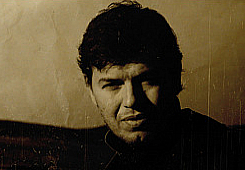 John Olsen : Would you tell us about yourself and your musical background?
John Olsen : Would you tell us about yourself and your musical background?
Oscar Aguayo : I was born in Peru a few decades ago, the oldest son in a family where music-playing was part of everyday life. My earliest memories are crowded with images of my mother at home playing the guitar while singing, and the alien mixture of emotions I experienced from those songs. You see, my mother’s songs weren’t children songs designed to expose children to a reduced, predigested set of emotions. Instead, she used to sing “adult” songs that dealt with all feelings, most of them completely unknown to me at three years of age.
I think about this frequently. Judging by how deep those memories are anchored in my mind and by the unique taste they still have to me to this day, I have to assume that although my conscious mind was confused by the unknown feelings conveyed by my mother’s singing, my subconscious must have been breathlessly making associations, creating patterns; interpreting the meaning of those melodies from what I perceived in my mother’s voice and facial expressions, experiencing brand new emotions not from life but from her music. Whatever the explanation may be, since as far as I can remember I experience music as a language born from emotions with the purpose of transmitting those emotions to others.
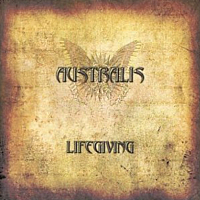 John : You currently have 2 New Age/Neo-Classical albums available for purchase. Lifegiving from 2005 and your most recent, The Gates of Reality from 2008. What awards and recognition have you received from these 2 projects at present?
John : You currently have 2 New Age/Neo-Classical albums available for purchase. Lifegiving from 2005 and your most recent, The Gates of Reality from 2008. What awards and recognition have you received from these 2 projects at present?
Oscar Aguayo : Lifegiving earned me the “Morpheus Music 2004 Best Independent Artist” early in 2005. Several tracks from it have been selected to be included in several compilations from the US and Europe; and additionally, the entire disc was licensed for re-release and distribution in Asia by an international label. The Gates of Reality is still too new to have earned any awards to this date, although it is already reaching the same level of popularity of its predecessor. I have to admit, however, that no award or recognition can compare to the fulfillment experienced when you learn that your music has touched somebody. No public award can match that kind of personal satisfaction.
John : How would you describe your music to someone not familiar with your very unique style of music?
Oscar Aguayo : That’s a very good question because every person understands music in their own terms. Everybody tries to come up with names and words to define music, everybody tries to define its genres and to delimit styles within those genres despite the fact that music is unique to each person. So, how to describe my music when my description represents only my personal perceptions ?
Even when in the most broad level my music falls within what we currently know as New Age/Ambient, I still want to avoid sub-categorizing it. Instead, I would try describing it by its intentions: to challenge the mind and captivate the heart, to seduce the listener to explore their own emotional universe, to provoke their imagination and awaken their memory. With that as a foundation, I would add a brief description of its acoustic elements: an amalgam of spacious evolving pads, seductive exotic rhythms, evocative atmospheres and aromatic melodies. Then I would finish adding that my music is composed as a reaction to whatever emotional stimuli I am experiencing at that moment. In other words, each track originates as a response to a real feeling or set of feelings I am going through.
 John : Could you explain the circumstances or reasons for becoming a musician, and why you choose New Age music over all other genres?
John : Could you explain the circumstances or reasons for becoming a musician, and why you choose New Age music over all other genres?
Oscar Aguayo : In all truth, I am a latecomer. You see, although I was exposed to music since birth and developed an intimate relationship with it since very early in my life; mine was a conservative family. The world of professional music was perceived – and with good reason – as a morally risky environment and therefore my parents never encouraged me on that direction. It wasn’t a stern prohibition, of course, and I was still able to compose music and create a few bands during my teenage years, gaining stage experience and musical proficiency along the way. However, the idea of pursuing a professional career as a musician was never serious at home, and even years after I moved out to live by myself, I never saw myself as one. That was until my father passed away eleven years ago.
Without going into details, all my perspectives changed after that event. The meanings of every aspect of life shifted under my feet and I started to discover that many of the things I thought were important, actually weren’t; and that many areas I took from granted and regarded as trivial were actually the ones that give substance to life. In the middle of this process, as things were falling into their new places it became clear to me that music was much more than just a fun hobby. I found there was so much to say through it, but so far I had never taken it seriously enough. That’s when I started considering composing and producing music professionally.
To answer the second part of the question, I don’t think music genre is as important as the messages and the emotions you as a composer want to convey. And since the range of human emotions is so wide, choosing New Age was more of an evolutionary process than an intentional one for me. I’ve composed in many different genres since age 12. It’s my personal opinion that New Age is the only musical genre that doesn’t impose creative parameters on the composer. In that sense, I think New Age is the less defined genre of all, providing the composer with an unmatched freedom of musical expression.
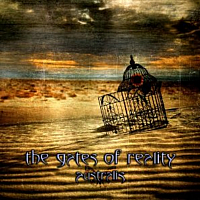 John : Since genre is not as important to you, than the emotions you want to inspire for your listeners, What emotions can one expect to feel from your music?
John : Since genre is not as important to you, than the emotions you want to inspire for your listeners, What emotions can one expect to feel from your music?
Oscar Aguayo : This is an interesting question. At the beginning I assumed my listeners would experience the same emotions I experienced when composing a particular piece. If I felt specially moved by something, I would translate those feelings into a musical piece and was sure that whoever listened to it would be moved in similar ways. I’ve learned soon that is not the case, though. The truth is that every person has their own unique emotional structure, and although we all coincide on the generic emotional levels, our interpretation of more specific emotional stimulus is very personal. So, even when I can speak about the emotions I convey through my music, I am simply unable to speak about the emotions listeners will experience from it. Of course, there’s nothing extraordinary in my emotions.
They are the same we all experience: the many contrasts of love; our enduring hopes; the deep fears of our times; the numberless little joys of everyday life. The passion in our hearts; our endless curiosity; our desire to explore and to find things bigger than ourselves. The darker angles of our souls can’t be excluded: our shortcomings and selfishness; the secrets we keep only to ourselves. My music originates from all of these emotions. On the listeners’ side, I will always defend their freedom to experience my – and all – music in their own unique ways, to extract from it the emotions their hearts need and enjoy.
John : Can you describe what your albums are about, or can you share what thoughts and experiences from your homeland come to mind for each of your 2 albums: Lifegiving & The Gates of Reality?
Oscar Aguayo : Lifegiving is a free compilation of the varied tracks I composed when I redefined my own musical intentions. It felt so incredibly good to musically express myself in complete honesty that I let myself go. In fact, the album’s title came from the concept of a birth, an act of giving and receiving life. The result is an album where each track is its own little world.
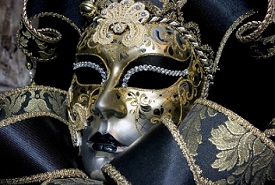 In contrast, The Gates of Reality is a more intentional work. In 2005 I finished Lifegiving very aware of the role imagination plays in our daily lives, very interested in how our unique perceptions affect our personal understanding of the world around us. Love, hate, hope, desolation, peace, war, faith, disbelief; all of our emotions are the result of our perceptions, and our perceptions are the result of the interaction between intellect and imagination. It quickly became a set of concepts worth of exploration. It took me three years to finish.
In contrast, The Gates of Reality is a more intentional work. In 2005 I finished Lifegiving very aware of the role imagination plays in our daily lives, very interested in how our unique perceptions affect our personal understanding of the world around us. Love, hate, hope, desolation, peace, war, faith, disbelief; all of our emotions are the result of our perceptions, and our perceptions are the result of the interaction between intellect and imagination. It quickly became a set of concepts worth of exploration. It took me three years to finish.
John : Oscar, you have said in the past that music has the ability to break political and social barriers. I understand your comment somewhat, but what exactly did you mean by that?
Oscar Aguayo : I mean that beneath our external labels we all need the same things. We may not speak the same language, we may live within countries in conflict with each other, we may have inherited the external characteristics of a particular race, we may belong to particular social groups and sympathize with particular political points of view. But no matter how different or incompatible we could seem to be towards each other, we all have a heart that feels and loves, that fears and hopes.
That’s where music plays a unique role. We may be unable to speak to each other, we may find ourselves unable to overcome our external labels – of race, of patriotism, of ideology – in order to communicate with each other in good faith; but we are all susceptible to music. We may come from centuries of injustice, or from ephemeral conditions of privilege; but we are all vulnerable to music because music ignores the superficial areas of the human condition and goes straight to the deep ones, the ones that are common to everybody. In this sense I’ve had the honor of having personal communication with listeners from both sides of armed conflicts and with listeners from religious groups incompatible with each other; and share their thoughts and dreams and hopes, all as a consequence of music.
I think as a sentient species, we are still very primitive. Our technology may be very advanced and our knowledge very vast; but we still have to learn the basics. We are able to take a humans beings to the moon, but we are unable to feed the poor in our own cities. We have harnessed the power to destroy our own home planet, but we are still ignorant on how to live in peace among ourselves. Yes, we are very primitive. And it will be a very long time until we learn the basics. Fortunately, we have music to help us blur the many imaginary lines that separate us from us.
John : Recently a fan of yours posted a comment on my review of The Gates of Reality, and said; “Let me comment that this (Australis) is one of the best musicians I’ve ever heard.” Since this person will likely be reading this interview too, how would you respond to the person who posted this comment?
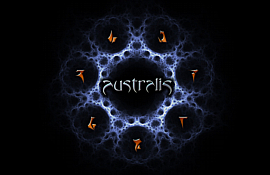 Oscar Aguayo : I would start expressing how deeply honored those warm words make me feel. I would want that person to know how grateful I am that my music appeals to their soul and that they took the time to express that on your review.
Oscar Aguayo : I would start expressing how deeply honored those warm words make me feel. I would want that person to know how grateful I am that my music appeals to their soul and that they took the time to express that on your review.
Nothing motivates the independent musician better and deeper than knowing his/her music has moved somebody. It is a concept hard to explain unless one understands what “independent” means in the music industry.
If you compare the world of professional music to an ocean, an independent – in other words, “unsigned” – artist is someone who sets to cross the Atlantic on board of a minute canoe. While “signed” artists make the same trip on board of a cruise with a crew of people paid to drive the boat, the independent musician is usually alone and depends absolutely on his/her own devices. Most likely, he/she won’t make it; but he/she tries nonetheless. His progress, if any, will be discouragingly slow. The independent musician must absolutely love what he/she is doing, otherwise who would voluntarily decide to embark into such an unfavorable endeavor?
That is why comments like the one you mentioned are so meaningful to the independent musician. They make you realize you are not alone in the middle of a dark ocean on a reduced piece of wood keeping you afloat, but that you in the company of countless other human being sailing their own dark oceans by themselves. Suddenly everything takes deeper meanings and you know you are in the right path; all because of comments like those.
John : Is there anything you would like to tell our readers that I have not asked or brought up during our interview?
 Oscar Aguayo : Only that I appreciate very much this opportunity to share with you and all your many readers my personal impressions about so many subjects. As I tried to say earlier, the listener is what makes all the difference for the composer. Believe me, I’ve composed private music for decades. It is only when the composer interacts – musically or verbally, like through your interview today – with the listener that everything starts to make sense.
Oscar Aguayo : Only that I appreciate very much this opportunity to share with you and all your many readers my personal impressions about so many subjects. As I tried to say earlier, the listener is what makes all the difference for the composer. Believe me, I’ve composed private music for decades. It is only when the composer interacts – musically or verbally, like through your interview today – with the listener that everything starts to make sense.
On that subject, let me invite all of your readers to visit Australis official website for the newest material and latest news, at: AustralisMusic.com. Also, I’ve finally opened accounts on Facebook and on Twitter where behind scenes details are posted several times a day. Please feel free to drop by and say hello. John, again, thank you very much for inviting me. You can also read my New Age Music World pages dedicated to Australis. Photos are courtesy australismusic.com.

John P. Olsen, New Age Music World host and contributing author for newagemusic.nu, has conducted an interview with Salva Moreno of Psicodreamics about his New Age music projects. Salva Moreno is the composing musician behind the notably mysterious and out of this world music of Psicodreamics. Salva’s electronic New Age music projects are best described as Ambient, Chill Out, Neo Classic and Gothic to name a few.
Salva Moreno of Psicodreamics is the predominate musician widely recognized in Continental Europe, the U.K. and overseas markets, where his unique form of fantasy and mythology inspired discography easily creates a magical divide apart from many New Age artists.
Valencia Spain is where Salva takes the stage to portray his principal role as master of ceremonies for Psicodreamics, and into the hypnotic realm of the mysterious and unknown, crafting his select style of fantasy inspired music cloaked in an intriguing shroud of mystery every time. Salva Moreno of Psicodreamics creates this unique divide by producing designer mood music using a macabre blueprint with theatrical effects shown in a dramatic way that will leave you breathless. Today we are pleased to present this interview to Psicodreamics fans and our site visitors.
Interview with Psicodreamics;
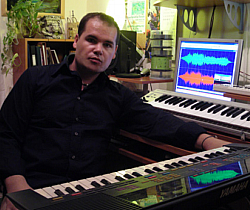 John Olsen: I am glad to have this chance for our visitors to learn more about the man behind the music of Psicodreamics. After doing my recent reviews of your Fantasynth and Ambiethernum albums, it is great to talk with you again Salva. You are recognized as the emerging New Age artist in Spain. How and why did you begin your career in New Age music?
John Olsen: I am glad to have this chance for our visitors to learn more about the man behind the music of Psicodreamics. After doing my recent reviews of your Fantasynth and Ambiethernum albums, it is great to talk with you again Salva. You are recognized as the emerging New Age artist in Spain. How and why did you begin your career in New Age music?
Salva Moreno: In the 1980’s I was excited about Fantasy tales, Legends and Mythology and I enjoyed the excitement involved with these themes. In addition I discovered musicians like Constance Demby, Enya and Vangelis, and I realized this kind of music was like a soundtrack that made myself imagine adventures in a world of fantasy. Then I decided to create my personal fantasy music world taking New Age music like a seed in my music career. New Age was an interesting starting point, but during the last years, I have been developing my own style closest to Ambient and Chill Out with a little bit of Goth flavor.
John: You have projects with artists around the globe. Who are the artists, and what are the projects you did together?
Salva Moreno: I have collaborated with many musicians all over the world. I remember my first one with the USA artist Frances Lyons, a.k.a. Godot, in the track The Gift, included in my album Eternal Angel. She composed a beautiful piano melody in her studio for me. I was mysteriously charmed by this incredible track when I listened to it for the first time. Then I requested a midi file of the song to develop with ethereal choirs and effects. We both enjoyed the final result after airing in the radioshow Blue Water Drift Dive, hosted by Darrell Burgan. I will never forget that experience.
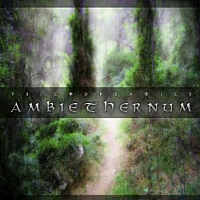 One year after, I collaborated with Gothic songwriter Priscilla Hernandez in the track Morning Light, and electronic artist Alidan with the track The Garden of Strange Beings, both songs are included in my album Azhdark Passion. Finally, in my 2006 release Theatre des Vampires, it was an honor to include Ramon Mendigorri, playing the electric guitar on the track Theatre des Vampires and Nestor Mora, a.k.a. Rosten Jim, collaborating in Daylight Belonging.
One year after, I collaborated with Gothic songwriter Priscilla Hernandez in the track Morning Light, and electronic artist Alidan with the track The Garden of Strange Beings, both songs are included in my album Azhdark Passion. Finally, in my 2006 release Theatre des Vampires, it was an honor to include Ramon Mendigorri, playing the electric guitar on the track Theatre des Vampires and Nestor Mora, a.k.a. Rosten Jim, collaborating in Daylight Belonging.
John: The Theatre Des Vampires and Ambiethernum albums have both received considerable air time with online radio stations, even before their actual release. Are they your most successful albums to date?
Salva Moreno: Yes they are. Theatre des Vampires and Ambiethernum are what I consider the best ambient space music of Psicodreamics, and have been a great success in radio air time, magazines, and sales. For instance Ambiethernum was included in the charts of New Age Reporter during six consecutive months and the long running New Age radioshow Hearts of Space, hosted by Stephen Hill aired one track of each album last year. Recently my brand new album from 2009 Fantasynth, has debuted in many radioshows like John Diliberto’s Echoes, and many more. Now I am waiting anxiously for my first debut on your station New Age Stars, for feedback and opinions from your listeners.
John: Many other people have tried to describe your music, including myself, so what would be your own description of your music when describing to another person?
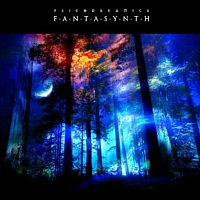 Salva Moreno: This is the million dollar question John. I have always had a problem defining my own music. I use one or two brief sentences to define my music very quickly: Discover mythology through the music, and emotional melodies for dreaming. I could make an even more accurate definition: An Ambient music soundtrack inspired by Fantasy tales and Mythology, with a light Gothic touch.
Salva Moreno: This is the million dollar question John. I have always had a problem defining my own music. I use one or two brief sentences to define my music very quickly: Discover mythology through the music, and emotional melodies for dreaming. I could make an even more accurate definition: An Ambient music soundtrack inspired by Fantasy tales and Mythology, with a light Gothic touch.
John: What imagery are you trying to get across in your music compositions?
Salva Moreno: I usually compose music inspired by fantasy themes. Each album has a title or a main theme that makes people know an initial idea or a first approach to the album. Nevertheless, music is a mysterious language that a listener can experiment in different ways. I think the music is a vehicle to set the imagination free, and I want the listener tho have all the freedom there is to imagine.
John: When you compose an album, do you have your mind set on the material first, or do you compose the album during production?
Salva Moreno: Sometimes I have a general idea before starting a music project, then I develop it during the production process. With others, I can find inspiration when I play the keyboards and then listen for some ideas to develop. There is not a systematic way to create an album. The creative process is a mysterious thing and you know how I enjoy mysteries.
John: You said that you create Fantasy and Myth inspired projects like Theatre des Vampires, that I will review soon, so what first influenced you to compose Fantasy and Myth theme oriented music?
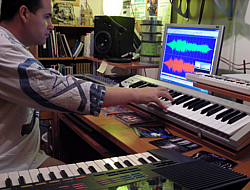 Salva Moreno: Like you and I have discussed, I am a great fan of fantasy and mythology themes, and years ago I decided to create my own music world to feel fantasy in a personal way. For example: I have composed albums inspired by mythological beings like angels, as in Eternal Angel 2003, and vampires as in Theatre des Vampires 2006, all inspired by fantasy books like Tanith’s Lee’s Night’s Master, evident in my 2004 Azhdark Passion album.
Salva Moreno: Like you and I have discussed, I am a great fan of fantasy and mythology themes, and years ago I decided to create my own music world to feel fantasy in a personal way. For example: I have composed albums inspired by mythological beings like angels, as in Eternal Angel 2003, and vampires as in Theatre des Vampires 2006, all inspired by fantasy books like Tanith’s Lee’s Night’s Master, evident in my 2004 Azhdark Passion album.
John: You currently have 9 great albums, and have told me about using video material soon, and plans for changes on your already beautiful website. Could you give us some details about your future projects you have planned?
Salva Moreno: I have many projects in mind but not much time to start them. Recently I have released a new album titled Fantasynth and now I want to take a brief parenthesis in composing music until the end of 2009. During the rest of the year, I have scheduled development of my visual art, creating some music videos. I have also planned some projects for 2010 or 2011, of J.R.R. Tolkien, Silmarilion, and other books inspired by fairies.
John: Fantasynth is your current release. You have said it is designed for persons who are non-conformists to commercial music. What does Fantasynth have to offer, and what thoughts or emotions do you want to allow a listener to feel?
Salva Moreno: Yes, that is right. Fantasynth is an album that fuses genres and styles as different as Ambient, New Age, Down Tempo, and Chill Out, mixing not only Ethnic and Symphonic instrumentation and orchestration, but synthesized sounds and effects on a more actual and innovatory musical outlook. This album is specifically indicated for non conformists that refuse commercial tendencies and look for something more in their music.
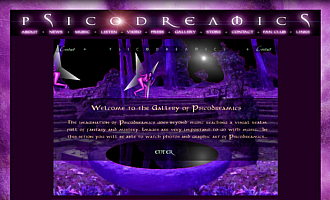 This album is an invitation to dive into a new world of fantasy and imagination, where contemporary instrumental music blends with rhythm and percussion in a feast of sensations and emotions. I try to surprise fans on the musical adventures of Psicodreamics, and hook those people listening for the very first time. It is not just a musical adventure for dreaming while you are awake, but a festival of emotions and fantasy where sound and rhythm will seduce your inner soul in a frenetic dance with a unique purpose: Recovering the innocence lost since our childhood.
This album is an invitation to dive into a new world of fantasy and imagination, where contemporary instrumental music blends with rhythm and percussion in a feast of sensations and emotions. I try to surprise fans on the musical adventures of Psicodreamics, and hook those people listening for the very first time. It is not just a musical adventure for dreaming while you are awake, but a festival of emotions and fantasy where sound and rhythm will seduce your inner soul in a frenetic dance with a unique purpose: Recovering the innocence lost since our childhood.
John: Thanks you Salva for finding time to give everyone insight into your music. I have enjoyed our past conversations, and look forward to writing about your music in the future.
Salva Moreno: Thank you for this interesting interview and your great website devoted to New Age music, and your visiting fans.
John: Is there anything you would like to comment on that I didn’t ask in the interview Salva?
Salva Moreno: I would like to invite your readers to visit my website psicodreamics.com and myspace.com/psicodreamics and discover more about the musical projects of Psicodreamics. They are also welcomed to listen to all of my albums on the website. Purchases can be made through CD Baby, and the best digital download sites like iTunes, Amazon mp3, Napster, eMusic, and Rhapsody, among others. Photos are courtesy psicodreamics.com.

Vicki Logan has a history of composing and producing outstanding New Age music from the very beginning of her music career. By incorporating elements of New Age, Classical, Pop, Jazz, Contemporary Instrumental, plus a divine gift of creativity, her earlier releases set a high standard for her future projects.
It seems Vicki Logan charts a new direction with every album. Vicki Logan’s music is related to the passage of time, and how she experienced progress while composing and producing her albums along the way. Her upbeat music is an excellent example of what can be achieved when a talented artist shares a part of themselves by putting their heart and spirit into the creation of their music. This inspiration gives music lovers a chance to also feel special along the way too.
Discovering the positive and inspiring music of Vicki Logan, and then writing about this friendly and outgoing New Age artist who is so passionate about their music has been personally rewarding. Her music is drawn from self conclusions about the ride everyone must travel during our day to day life experiences, and many of her songs were in the top 100 charts, and granted impressive online radio airplay attention worldwide. New Age Music World blog host John P. Olsen has interviewed Vicki Logan. We are pleased to present this interview for Vicki Logan’s fans and our website visitors.
Interview with Vicki Logan;
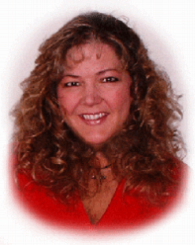 John P. Olsen: You said you have not had formal piano lessons, do not read sheet music, and play practically everything by ear, which will be surprising to many people. How are able to compose such beautiful and creative music Vicki?
John P. Olsen: You said you have not had formal piano lessons, do not read sheet music, and play practically everything by ear, which will be surprising to many people. How are able to compose such beautiful and creative music Vicki?
Vicki Logan: I honestly wish I knew. I’ve been asked that question for years and I still don’t know what to say. I can sort of explain the process though. (And yes, I do everything by ear, so to speak. Anyone I work with can attest…I “push the buttons and just do my thing!”)
I’ll sit at the piano and start messing around with the keys. Something will hit me just right and all of a sudden, I know what I want to play and how the whole song should be. I’ll record the base piece (usually some type of chord progression) and start layering a melody and other sounds to “paint a picture”.
I never really know how it’s going to sound until the end. I’ll “dial-a-sound” on my synthesizer and then something new hits me. Even after a song is supposedly finished, I could do more to it. I don’t start with an idea and a song doesn’t have a title until it’s completed and I listen to it. Whatever it makes me think about, that’s where the title will come from. Yes, I know. I’m backwards.
When I record the actual album, I’ll play the parts in a demo and bring that demo into the studio. I’ll record what I can and then hire other musicians to play the parts that don’t sound right on the synthesizer. These musicians get free reign to add their ideas to the material since I don’t know what the real instruments are capable of doing, although I do have final say. For example; guitars can bend a note when a string is slid up or down on the neck. I can’t do that with my keyboard. The song, I find, is only enhanced by their performances…as it should be. This is where it’s true “life” comes from. That’s why I’ve reverted back to playing with other musicians rather than letting people record things digitally; making the song “perfect”. Computers are wonderful tools, but, in the end, there just isn’t enough that can be said about the performers. The feelings/emotions and oopses are priceless!
John: Many of your songs and albums have been on New Age music Chartss, plus you have helped many musicians just starting out as artists. What song and album awards and personal recognition have you received as artist?
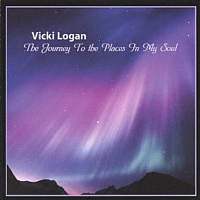 Vicki Logan: This is going to seem really disrespectful, I know, but I really don’t intend for it to be that way. I have received a lot of honors and awards from various organizations. I’ve won some song contests. I’ve been truly honored to receive these awards, and, for the most part, they were given to me in good faith, but, the more involved I’ve gotten within the music industry, the more I’ve found how political they are. For example – The Grammys. First off, you have to be a NARAS member. If you are not, you can’t even submit your material for consideration of any award. Next, if you do get in, you have to compete against the larger corporations who belong and have several of their staff as members as all members vote on the Grammy Awards. You can guess where those votes are going to. And then, there is a lot of “vote for me -s” e-mails that percalate to members. In the end, the memberships to these groups are expensive and I don’t have that type of money to waste. Like all of you out there, I have to figure out what gives me the most bang for my buck. An attempt at stroking my ego or doing more of what I love to do?
Vicki Logan: This is going to seem really disrespectful, I know, but I really don’t intend for it to be that way. I have received a lot of honors and awards from various organizations. I’ve won some song contests. I’ve been truly honored to receive these awards, and, for the most part, they were given to me in good faith, but, the more involved I’ve gotten within the music industry, the more I’ve found how political they are. For example – The Grammys. First off, you have to be a NARAS member. If you are not, you can’t even submit your material for consideration of any award. Next, if you do get in, you have to compete against the larger corporations who belong and have several of their staff as members as all members vote on the Grammy Awards. You can guess where those votes are going to. And then, there is a lot of “vote for me -s” e-mails that percalate to members. In the end, the memberships to these groups are expensive and I don’t have that type of money to waste. Like all of you out there, I have to figure out what gives me the most bang for my buck. An attempt at stroking my ego or doing more of what I love to do?
Again, don’t get me wrong, honors and awards are wonderful things, but only if done for the right reasons. The best award I could ever receive? If I could make the world a better place for even just one person so that that person could do the same for the next, then creating and sharing what I do was worth it all.
John: We are currently playing Enchanted Winds, The Ride, and other songs of yours on 365 Stars Radio. You told me The Journey To The Places In My Soul is your most creative and best album yet. Why is that Vicki?
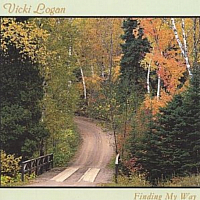 Vicki Logan: I would say that The Journey is the most creative as I’ve learned so much since my first CD and I’ve attempted more than I have to date. For example, I’ve played more flute on this one; more than on any other album. I’ve recorded more of the album at home and just brought in the hard drive to the studio. I used some new ideas (for me) and made some of my ideas more pronounced. There is an actual story interwoven into the music for the first time.
Vicki Logan: I would say that The Journey is the most creative as I’ve learned so much since my first CD and I’ve attempted more than I have to date. For example, I’ve played more flute on this one; more than on any other album. I’ve recorded more of the album at home and just brought in the hard drive to the studio. I used some new ideas (for me) and made some of my ideas more pronounced. There is an actual story interwoven into the music for the first time.
Anyway, I believe that each album has a special place for me since each album helped me get to the next. If I didn’t do the first the way I did, the second one wouldn’t have come to pass. Same for the third and fourth. Each one builds on the last…each represents that time in my life in which it was created. Even the photos chosen represent what was happening; many were from my backyard.
In album number one, I was chasing a dream – trying something I never thought I’d be able to do, thus CHASING DREAMS only to end up FINDING MY WAY in the music industry. This CD I even arranged a couple of cover tunes, only to find that most people preferred my originals. I was on THE RIDE of my life realizing that I could do this and ended up with THE JOURNEY TO THE PLACES IN MY SOUL when everyone wanted to find out more about me…about how I came to this place…about my weird life! (And yes, it’s been strange…lol) So that’s why I believe it is the best so far…but even better is yet to come… By constantly moving forward, attempting new things and keeping an open mind, a person can only progress…even when they think they aren’t. It doesn’t matter what someone else believes. In the end, if YOU believe in yourself, YOU do the work, anything is possible.
John: There were a couple of obstacles you had to overcome with your latest album, if you don’t mind, could you tell our readers what happened during the release of the album?
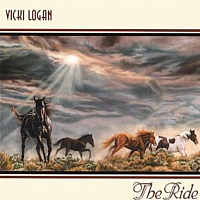 Vicki Logan: I believe someone once said to me sarcastically, if anything can happen, it will. About 3 years ago, we purchased a home only to find that it had major mold and moisture intrusion issues. The previous owner was found guilty of fraudulent seller misrepresentation and was given the order to repair the home. Instead of getting our home repaired, someone arsoned it and we lost everything…our pets, our businesses. We literally had the clothes on our backs.
Vicki Logan: I believe someone once said to me sarcastically, if anything can happen, it will. About 3 years ago, we purchased a home only to find that it had major mold and moisture intrusion issues. The previous owner was found guilty of fraudulent seller misrepresentation and was given the order to repair the home. Instead of getting our home repaired, someone arsoned it and we lost everything…our pets, our businesses. We literally had the clothes on our backs.
Then I got lyme disease because I am an over zealous lawn mower. I mow everything. Due to genetics, I found that I had back issues. I had stenosis. My bone was growing onto my nerves and causing massive pain. It was a quick surgery and I’m hoping it’s not the beginning of more because the pain is starting to come back yet again. Then I had cataract surgery. (By the way, those of you who would like to know, I’m 43.) I haven’t been able to see right since 3rd grade! To wake up and see the alarm clock in the morning – to actually see who someone is and not a big fuzzy blob – to go swimming and not worry about getting splashed and losing a contact lens – wow! And the list goes on! And I didn’t even added the rest of my families challenges! Maybe someday I’ll write a book… lol!
John: You and I are perhaps like most Americans by constantly being surrounded by Rock, Pop, Jazz, and other genres, which are all great forms of music, so how did you discover, or what brought you into the New Age music scene?
Vicki Logan: STRESS! (Just kidding…kinda)
Really, it’s the creativity I find within myself listening to this specific genre, but I think that many of you will find that even the term “New Age” covers a lot more than just one style of music and the term has a different meaning for a lot of people. (A subject for a much later conversation.) I think that, using my music as an example, “New Age” music can be found labeled Celtic Pop, Smooth Jazz, and a gazillion other things.
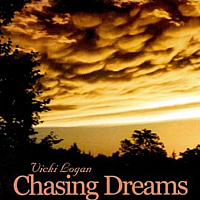 I love all music and I think that comes out in what I create. I hope people realize that it’s not the music people are attracted to or not. It’s the message of the artist using the music that people relate with. Music is but a tool that allows people to communicate with others. Instrumental music is all encompassing. There are no words so there are no boundaries. Not even for the deaf or animals, believe it or not. That’s how I view it.
I love all music and I think that comes out in what I create. I hope people realize that it’s not the music people are attracted to or not. It’s the message of the artist using the music that people relate with. Music is but a tool that allows people to communicate with others. Instrumental music is all encompassing. There are no words so there are no boundaries. Not even for the deaf or animals, believe it or not. That’s how I view it.
It’s another medium with which to paint something. So, I like the “New Age” music best because I feel that most of the artists here have a more positive view on life and I think we really need to be more positive. Personally, a label is just something we put on something else because we need to be able to identify it when we communicate with others and we all label differently according to what that label means to us.
John: There are other talented musicians who perform on particular songs and albums, who are the band members, and is creating the albums fun for you and the group, or do you consider producing an album work ?
Vicki Logan: In reality, I am all the parts when I create the songs. The musicians I work with take the parts I create and give them life. Technology has provided me with a lot of sounds which are similar to the real thing, but it’s not like having the real item in the studio. People are capable of manipulating their instruments in ways computers can’t. To give credit where credit is due, these musicians all have excellent ideas to help make a song much more interesting. I don’t know everything and I don’t expect I ever will, so human interaction is something that we all need. Period.
The folks that help me out are Randy Gildersleeve (also my main mentor) who performs miracles on guitars, mandolin, banjo and pushes me to learn more and open my mind when we are in the studio during production. Then there is Andy LaCasse who does things with bass that I would never think of. He also puts my music into sheet music form so others can play the parts with backing tracks. I can’t read a stitch of it, but I guess it’s pretty cool since there is a lot of black all over the paper! The other person who helps me get the music where I need it to be is Peter O’Gorman – percussionist extraordinaire. He will play anything to get the sounds we need. Give him a garbage can lid, a stick, whatever. He’ll make it sound awesome.
 There are several other people that help out depending upon what my needs are. Matt Fink (aka – “Dr. Fink”) is an incredible keyboardist and producer and taught me a lot about midi recording, computer work and pro-tools in his home studio.
There are several other people that help out depending upon what my needs are. Matt Fink (aka – “Dr. Fink”) is an incredible keyboardist and producer and taught me a lot about midi recording, computer work and pro-tools in his home studio.
I know why I hire people to do those things!
Too much information and I just don’t have the knack for that part! Then there are loads of other instrumentalists, producers, mentors and more that I’ve worked with but would take forever if I named them all. They ARE ALL listed in my CD packages and I could never thank them all enough. That’s why I get to be where I am. With all of them. Work? Music is NEVER work. Promoting and merchandising things, figuring taxes and making sure the right things go to the right places, THAT’s work!
John: You already have 4 exceptional CD’s now available for purchase. Are you presently producing, or plan to have another album in the future besides the 4 currently on sale?
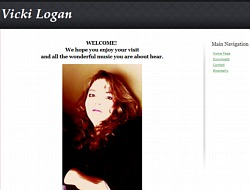 Vicki Logan: Funny you should ask that question. I literally got my new equipment today (after waiting patiently for the past 2 1/2 years!) and when I started messing around with all the buttons, I found that I have more sounds then I had previously and songs were rushing out left and right. I hope to have a new CD for release sometime in 2010. We’ll have to see what happens until then, though. Timing is everything and it has a mind of it’s own! Beisdes, remember my little quote above? If anything can happen it will? I just have to see what will happen! lol!
Vicki Logan: Funny you should ask that question. I literally got my new equipment today (after waiting patiently for the past 2 1/2 years!) and when I started messing around with all the buttons, I found that I have more sounds then I had previously and songs were rushing out left and right. I hope to have a new CD for release sometime in 2010. We’ll have to see what happens until then, though. Timing is everything and it has a mind of it’s own! Beisdes, remember my little quote above? If anything can happen it will? I just have to see what will happen! lol!
John: After reading your homepage biography, you seem to be philosophic about a person obtaining their goals by your own life experience. What advice can you offer persons just beginning in the music business, or suggestion to others about overcoming obstacles in general?
Vicki Logan: Everyone is different, yet everyone is the same. What I have found is that if you do what it is that you truly love, you make time for it and you are happier. If you THINK you want to do something and have a million excuses as to why you don’t get to it, I’d say that you must not be that interested in it. Think about it. If you want to go to the park, you will find a way to go to the park. If you want to take a vacation, you will find a way to take that vacation. For the most part, we will do the work necessary to get instant gratification. For some reason, we don’t do the work necessary for LONG TERM gratification.
Time goes by so fast, even our so called long term is here before we know it. My favorite quote is “Dreams are only dreams unless YOU are willing to make them a reality.” Many someones out there said that opportunities don’t just happen, we make them happen and that is more right than any one can imagine. If you want something, then do what it takes and get it! Just be realistic. Life is a precious gift. Use it. Enjoy it. Live it!
Check out the VickiLogan.com website and read my pages dedicated to Vicki Logan. Photos are courtesy vickilogan.com.

NewAgeMusicWorld.Com & NewAgeMusic.nu have interviewed Colin O’Donohoe about his past and current music projects. Here you’ll also get exclusive information about his upcoming album Lyrical Sutras. If you are not very familiar with Colin O’Donohoe or the Pangean Orchestra, at the bottom for a short presentation of his work.
Colin O’Donohoe uses a fusion of world music influences in his music. This inspiration transpired after reading a Chinese book of poetry titled Shi Jing. Another reason for his World music influences could be his position as Artistic Director of the Pangean Orchestra, or other held positions as director of the New Moon Orchestra, and Phoenix Chinese Orchestra.
Colin O’Dononoe’s Songs of the Saints release has genres ranging from international, world, jazz, easy listening, light rock, and slight touches of rap and hip hop. There is even a lighter jazz title track version of the song Amazing Grace. This interview was conducted by John P. Olsen, who earlier this year wrote an album review of Colin O’Donohoe’s World music influenced Songs of the Saints release.
Interview with Colin O’Donohoe;
John P. Olsen: Your current project is the Pangea Ensemble which includes international artists and their musical influences from around the world. Can you tell us a little about the musicians in the Pangea Ensemble, like where they live, and what ethnic instruments will be used?
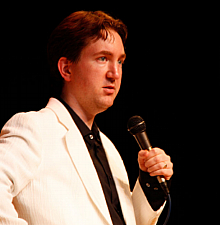 Colin O’Donohoe: We strive to reconnect people from around the planet with our undeniable universal language of music. Our musicians are as diverse as the planet itself and they come from most of our five continents. They all live in or near Phoenix. The best way for people to know more about the group is to visit the site, it says far more than I can.
Colin O’Donohoe: We strive to reconnect people from around the planet with our undeniable universal language of music. Our musicians are as diverse as the planet itself and they come from most of our five continents. They all live in or near Phoenix. The best way for people to know more about the group is to visit the site, it says far more than I can.John: On New Age Stars radio we regularly play tracks from The Songs of the Saints album, and I have noticed most song titles describe through song lyrics, stories about historic saints, and have wondered where or how the idea for songs about saints originated?
Colin O’Donohoe: First, Thank you very much! I’m really glad that you play my music, you obviously have incredibly great taste! The origins have been swirling in my mind for many years. In 2006 I began seriously digging into the keyboard to create some ideas for the music. I started doing some loose sketches of song and lyric ideas. I began reading much more about the saints. I wanted to do my utmost to deliver a unique look into the lives and stories of these saints.
The result obviously became a collection of songs that are united in theme of content but not in musical style. As I concentrated on each saint I began writing in several different styles. My priority was to make the music reflect the saint and not make each piece dependent on the last.
John: Your music is diverse by many intertwined genres. How did you conceived such a broad range of musical influences, and where do you first get your inspiration for such a broad expression in your music?
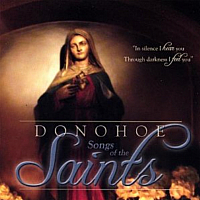 Colin O’Donohoe: I have an insatiable curiosity, and I love music! I love performing and learning as many new styles of music as possible. Over the past 18 years I’ve sought out masters in various genres to help me better understand many styles of music. In addition to this I love reading.
Colin O’Donohoe: I have an insatiable curiosity, and I love music! I love performing and learning as many new styles of music as possible. Over the past 18 years I’ve sought out masters in various genres to help me better understand many styles of music. In addition to this I love reading.
I guess that this combination of things lead to my imagination creating different worlds for different saints. To create the music I would read about the saints and then just jam on a keyboard for a little while. This process took several months.
After I felt comfortable with the material I decided to get serious and really do my best to construct the songs. I also like to keep myself excited by doing several different things. So, while writing a classical piece I might shift to the turn table and see what to add to a completely different song. It kept it all fresh in my mind.
John: Can you tell us more about the Chinese book of poetry Shi Jing and how that translates into musical inspiration?
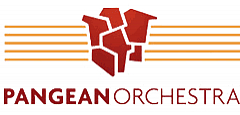 John: The big question everyone wants to know is the time frame of when your next album release is expected to be available for purchase and will the album be as diverse and be theme oriented material in relation to Songs of the Saints?
John: The big question everyone wants to know is the time frame of when your next album release is expected to be available for purchase and will the album be as diverse and be theme oriented material in relation to Songs of the Saints?
Colin O’Donohoe: Why thank you for asking! You can read it here first! My next album Lyrical Sutra‘s official release date is scheduled for 6/1/2009. As for the material. It is my first time delving into the world of electronic music whole heartedly. The songs are broken into three sections:
I. Meditation- Heart Sutra, Diamond Sutra, Eight Fold Noble Path Sutra, Enlightenment Sutra.
II. Prayer – Lotus Sutra, Pure land Sutra, Taking Refuge, Amitabha Sutra.
III. Awaken – A Boddhisatva’s Vows, Triple Gem Sutra, The Sutra in 42 Sections, Golden Light Sutra.
IV. Meditation: four mid tempo pieces. Prayer: four slower new age style pieces. Awaken: four up-tempo dance style pieces.
The idea of the album is to relax you, allow you to become at peace, and then reinvigorate you and get you feeling better than when you first began to listen to it. The idea of the album comes from a few of the many Buddhist Sutra’s which are the teachings of the Buddha.
John: I thank you for your time Colin. Is there anything you wish to tell our readers concerning your commitment to bring people of the world closer together through music ?
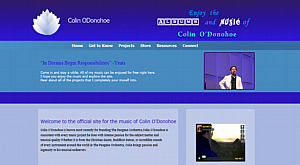 Colin: I just want to thank you again for the pleasure of the interview process. I hope that your audience loves my work and will be eager to listen to Lyrical Sutras in June.
Colin: I just want to thank you again for the pleasure of the interview process. I hope that your audience loves my work and will be eager to listen to Lyrical Sutras in June.
Here is a list of Colin O’Dononoe’s past and current positions related to orchestral music:
2008-present: Artistic Director for Pangean Orchestra in Phoenix AZ.
2006-present: Professional recording artist.
2008: Published Author of Odd Meters for Drum Set.
2004-2006: Executive/Artistic Director for New Moon Orchestra.
2003-2004: Percussionist with the Phoenix Chinese Orchestra.
2000-2003: Music Teacher.
1996-2004: Free lance jazz drummer in Phoenix Arizona.
Websites: Donohoemusic.com. Colin says: My personal website which features my albums and book. It will also feature my new album when it comes out this June “Lyrical Sutra’s” (you’re the first to print this, it is a New Age Music exclusive) Pangeanorchestra.com. Colin says: My new orchestra. It is the first of its kind that I know of where it combines instruments from around the world. Photos are courtesy Colin O’Donohoe & Pangean Orchestra.
